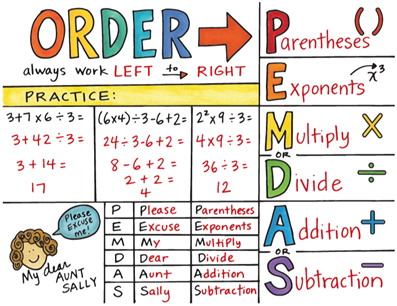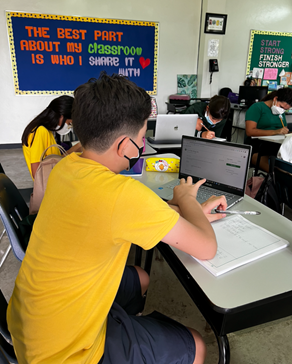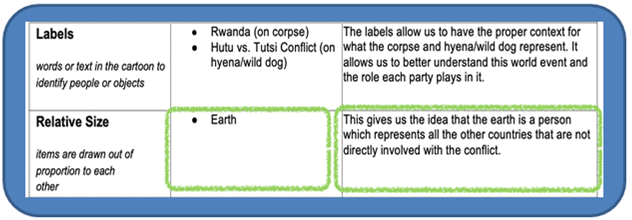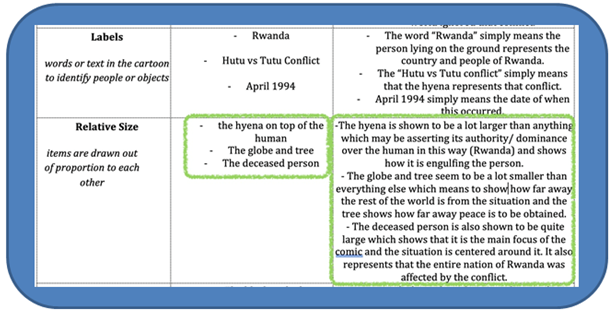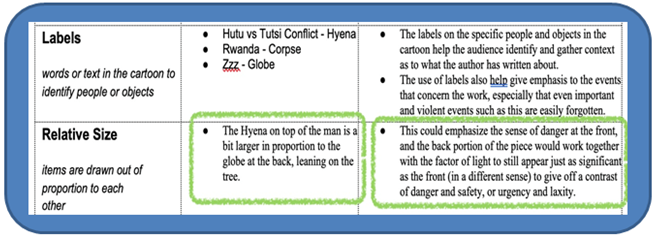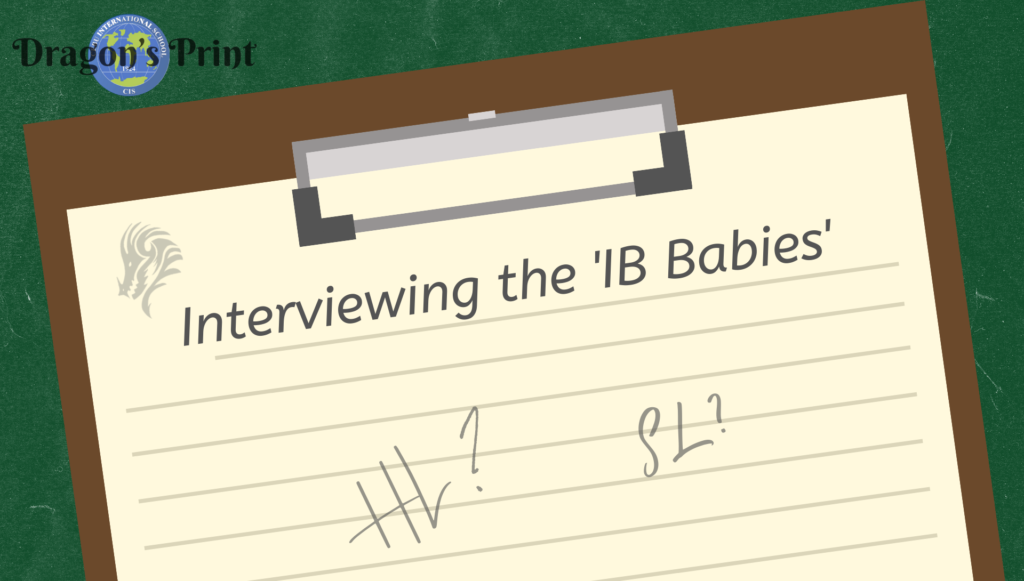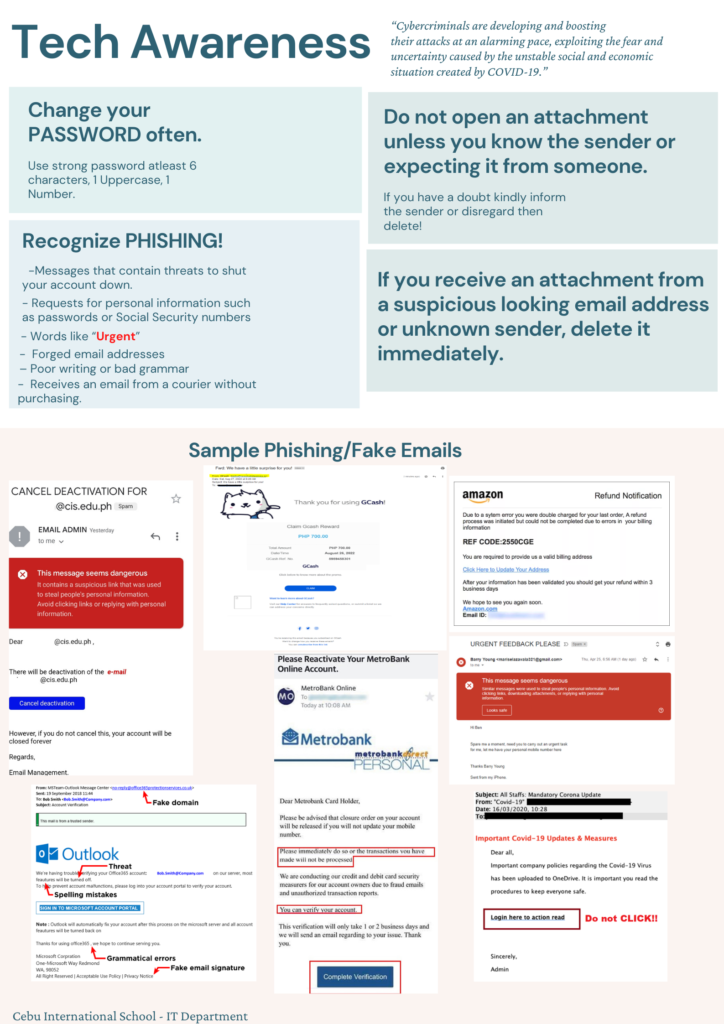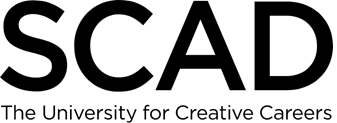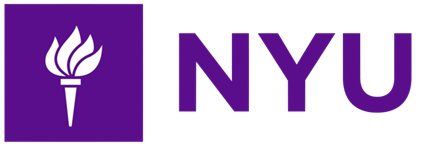
Principal’s Corner
by Mr. Andrew Powell, EY-12 Principal
This week our staff engaged in a workshop on global citizenship as we considered our school’s Mission, Vision and Core Beliefs, in which our commitment and responsibility to the local and global feature prominently. The United Nations uses global citizenship as a term that refers to the belief that individuals are members of multiple, diverse, local and non-local networks rather than single actors affecting isolated societies. As one group very aptly reflected, “You take ownership of the world around you.”
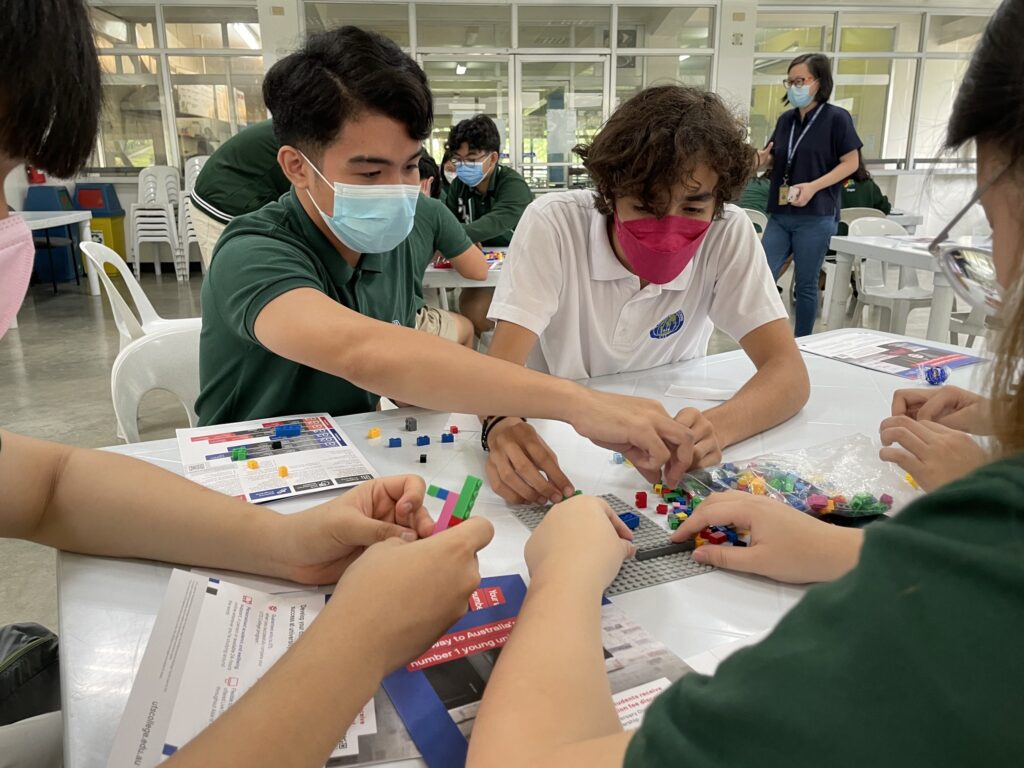 We looked at the responsibilities that we have to our students as we prepare them to fulfill our school’s Vision Statement in which we “challenge our students to be globally engaged, positive contributors in a competitive changing world.” At the heart of this preparation is a commitment to the provision of “intercultural learning”. This entails providing our students with global competencies that give them the skills to contribute to sustainable ways of living together in multicultural societies and strongly aligns with the IB’s concept of international-mindedness which focuses on developing inquiring, knowledgeable and caring young people committed to creating a more peaceful world. I’m sure that you’ll agree that this is desperately needed around the world at this point in time.
We looked at the responsibilities that we have to our students as we prepare them to fulfill our school’s Vision Statement in which we “challenge our students to be globally engaged, positive contributors in a competitive changing world.” At the heart of this preparation is a commitment to the provision of “intercultural learning”. This entails providing our students with global competencies that give them the skills to contribute to sustainable ways of living together in multicultural societies and strongly aligns with the IB’s concept of international-mindedness which focuses on developing inquiring, knowledgeable and caring young people committed to creating a more peaceful world. I’m sure that you’ll agree that this is desperately needed around the world at this point in time.
At the heart of our approach as a school is an ongoing commitment to the spirit of respect and an awareness and acceptance of others that are different to us. We are mindful of the consequences of our actions and our responsibility to the environment and engaging in sustainable lifestyles. I’m sure that as parents you are aware of our ongoing commitment to the UN Sustainable Development Goals that are aimed at addressing interconnected challenges such as poverty, inequality, climate change as well as peace and justice.
In this week’s Newsflash we have a number of our Diploma Programme students reflecting on their CAS experiences in which service to others features prominently. On Saturday Mr Pierra is also representing the school in a handover of boats to be distributed to various communities that were affected by the super typhoon earlier in the year. We strongly believe In the value of purposeful action that leads to significant outcomes. We know that these experiences can be profound and life-changing for our students as they enhance their personal and interpersonal development through experiential learning.
You will note from our Grade 5 contribution to Newsflash which examines Mass Media as a Communication Tool that an important aspect of our curriculum is responding and challenging stereotypes. If we are committed to equality and the Universal Rights of the Child, it is important that we recognize and examine bias and the importance of the ability to look at issues from multiple perspectives.
Over the coming months I look forward to providing parents and students with the opportunity to engage in conversation on global citizenship as we look to further develop our own school definition and the core beliefs, values and skills associated with it.
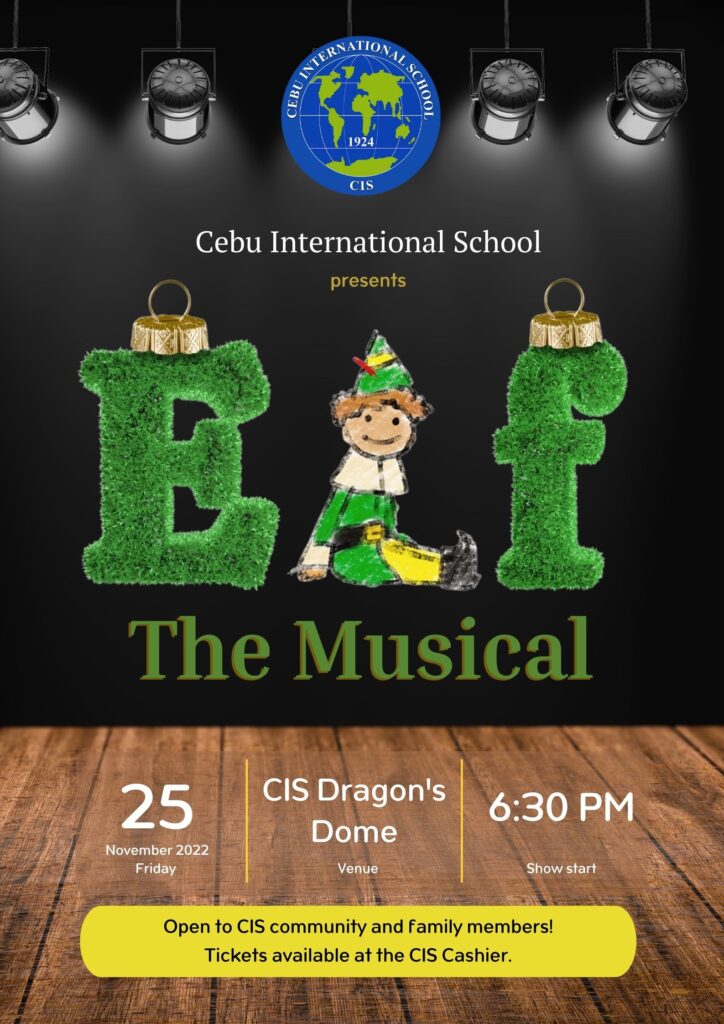
Upcoming events of note
- Nov. 25: School Production “Elf, The Musical” (6:30pm)
- Nov. 30: Public holiday
- Dec. 2: End of Semester 1 ASAs / Clubs
- Dec. 3: CIS Tree of Giving
Please refer to the CIS Event Calendar for the complete calendar of school events.
Grade 5: Mass Media as a Communication Tool
Ms. Aimee Underwood, Grade 5 Homeroom Teacher
The Grade 5 students have been inquiring into mass media as part of their transdisciplinary unit on How We Express Ourselves.
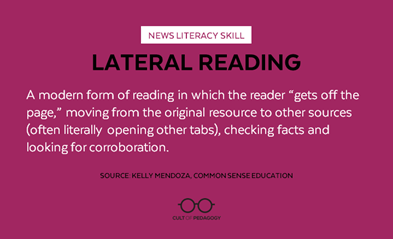 As Open-Minded and Reflective Inquirers, they followed daily news from around the world and developed their skills to critically evaluate the credibility and reliability of multiple media sources.
As Open-Minded and Reflective Inquirers, they followed daily news from around the world and developed their skills to critically evaluate the credibility and reliability of multiple media sources.
As Communicators, they practiced writing their own news articles following the inverted news triangle format and considering the Five Principles of Ethical Journalism (accuracy, independence, impartiality, humanity, and accountability). They also honed their public speaking skills as news presenters.
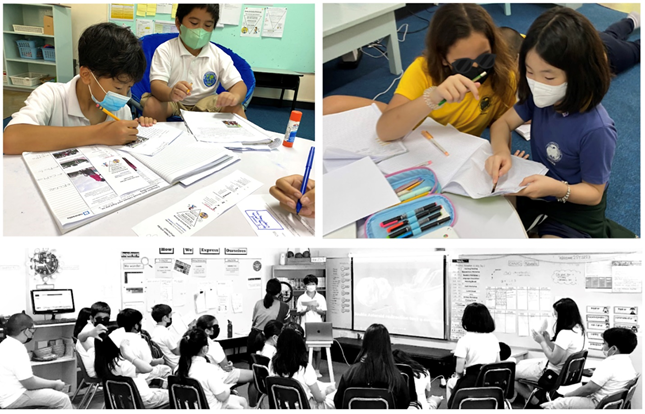
Thea
In connection to digital citizenship, the Grade 5 students also reflected on how mass media influences their perception of themselves and the world around them. They decided to respond to and challenge common stereotypes they have encountered through poem and digital art.
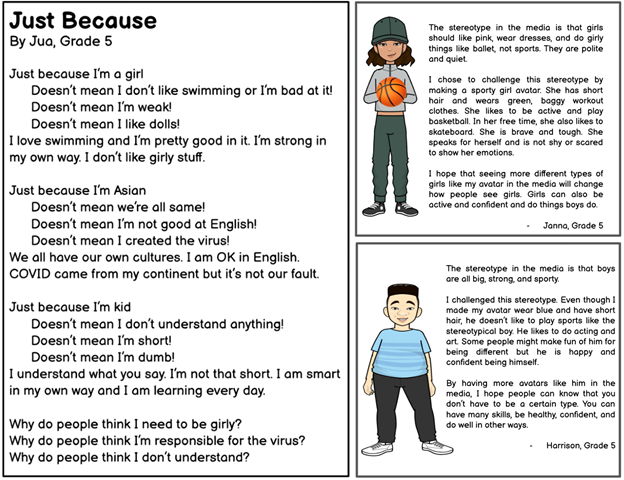
How do you make sense of the world around you? How do you evaluate your sources? Do you make sure to seek multiple perspectives for a balanced view? Visit the News Literacy Project and watch a Crash Course video to learn more about the concept of “lateral reading,” developed by the Stanford History Education Group (SHEG).
Grade 12: Physics and Mathematics Analysis and Approaches SL
by Ms. Maria Rosandee Tabada, Physics and Mathematics Teacher
Conducting a scientific investigation in Physics and completing a mathematical exploration in Mathematics are required in each course. These tasks allow students to apply their knowledge and skills and, at the same time, pursue their interests.
The Grade 12 Mathematics AA SL students have just started working on their mathematical explorations. Most have decided to pursue modeling based on the shape or motion of an object and to use calculus as part of their analysis. Their topics include
- model of sets in volleyball,
- analysis of the distance walked per day,
- comparison of a turn made during a car race,
- geometry of medicine and plastic water bottles, and
- triple axel jumps during a world figure skating championship.
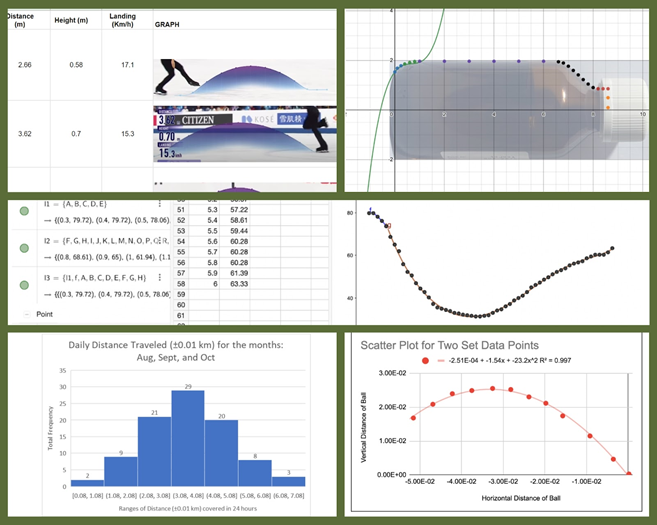
The Grade 12 Physics students are nearing the completion of their task and are currently working on their full write-up. The investigations conducted were on
- ball rebound height,
- cooling rate and volume,
- density of solution and drag speed,
- surface area of parachutes and terminal velocity,
- wing-to-body ratio of paper airplanes and distance,
- surface tension and index of refraction of a salt solution,
- diameter of copper wires used in a simple electric train system and
- extended masses of fidget spinners and average rotational speed.
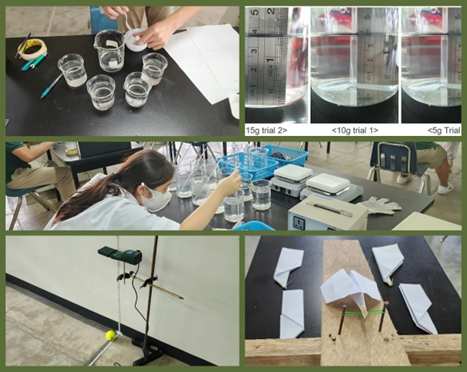
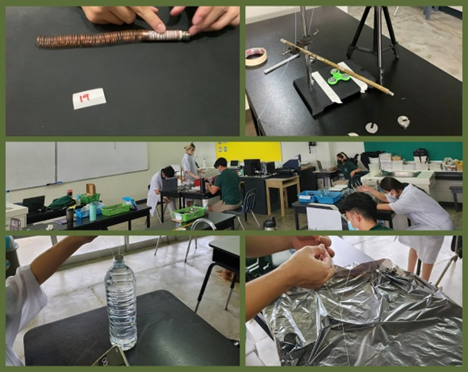
Congratulations to these students! It was great to see how they used their creative and critical thinking skills to meet the goals of their projects and overcome difficulties.
Grade 11: Creativity Action Service (CAS)
by Mr. Ace Pierra, CAS Coordinator
Through Involvement with the Rise Above Foundation
On August 20th, in support of the Rise Above Foundation, my classmates 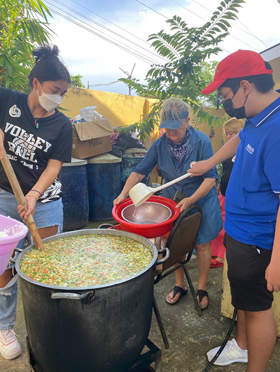 and I were able to feed about 500 children and their families. We started at about 1:30 pm when we all showed up at one of the many locations the foundation has in Guadalupe. Our end goal was to make a huge pot of a popular dish in the Visayas region called Lugaw (without regard to politics), which translates to a filling form of porridge that is particularly nutrient-dense. Green onions, carrots, and green beans were the vegetables that half of us chopped up while the other half of the group focused on preparing the 20kg of rice that needed to be washed. We added the vegetables, rice, and chicken to the huge pot to let cook, and gave it to the kids in the village. We accomplished this by strolling around the nearby village, which was located just outside the compound. As we walked through the village with some of the workers from the foundation who lived there, little kids approached us and asked for tickets for themselves and also for their families. One ticket equaled one scoop from a decent-sized mug. We were all able to observe first-hand the terrible living conditions that the kids and their families endure while we were wandering the area. Despite how difficult their lives are, as you can see in some of the images of the children, I was impressed that the people always continue to smile no matter how rough their living conditions are. We even saw several locals playing volleyball on their makeshift court with a net and were tempted to join in. Even though the feeding time mentioned on the tickets we had distributed was still one hour away, there was already a long queue of children waiting outside with their bowls and glasses as we made our way back to the compound.
and I were able to feed about 500 children and their families. We started at about 1:30 pm when we all showed up at one of the many locations the foundation has in Guadalupe. Our end goal was to make a huge pot of a popular dish in the Visayas region called Lugaw (without regard to politics), which translates to a filling form of porridge that is particularly nutrient-dense. Green onions, carrots, and green beans were the vegetables that half of us chopped up while the other half of the group focused on preparing the 20kg of rice that needed to be washed. We added the vegetables, rice, and chicken to the huge pot to let cook, and gave it to the kids in the village. We accomplished this by strolling around the nearby village, which was located just outside the compound. As we walked through the village with some of the workers from the foundation who lived there, little kids approached us and asked for tickets for themselves and also for their families. One ticket equaled one scoop from a decent-sized mug. We were all able to observe first-hand the terrible living conditions that the kids and their families endure while we were wandering the area. Despite how difficult their lives are, as you can see in some of the images of the children, I was impressed that the people always continue to smile no matter how rough their living conditions are. We even saw several locals playing volleyball on their makeshift court with a net and were tempted to join in. Even though the feeding time mentioned on the tickets we had distributed was still one hour away, there was already a long queue of children waiting outside with their bowls and glasses as we made our way back to the compound.
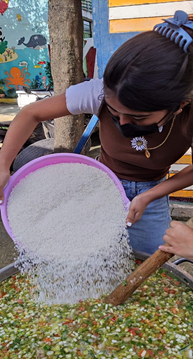 I think this experience was beneficial to everyone involved. I do think that everyone truly appreciated having this experience and hopefully it will push us to create and work with other foundations that need our help as well. I have worked with this organization for a very long time, whether it was assisting with food drives, donating clothes and used toys, etc., and used it as my theme for my PYP Exhibition in Grade 5. It made selecting the theme for my CAS project a no-brainer. I wanted to share this experience with my classmates as well so they can see what giving their time and effort to volunteer work can accomplish while helping others. I wasn’t able to work with the foundation much during the pandemic, and felt distant from the community, but am happy to be able to reconnect now. Since everyone in CIS has been fortunate to receive a high-quality education and a place to live, I believe that this experience will be beneficial for both myself and my classmates. Contributing to our community is important because we help others but also grow and benefit personally at the same time. – Natalie S.
I think this experience was beneficial to everyone involved. I do think that everyone truly appreciated having this experience and hopefully it will push us to create and work with other foundations that need our help as well. I have worked with this organization for a very long time, whether it was assisting with food drives, donating clothes and used toys, etc., and used it as my theme for my PYP Exhibition in Grade 5. It made selecting the theme for my CAS project a no-brainer. I wanted to share this experience with my classmates as well so they can see what giving their time and effort to volunteer work can accomplish while helping others. I wasn’t able to work with the foundation much during the pandemic, and felt distant from the community, but am happy to be able to reconnect now. Since everyone in CIS has been fortunate to receive a high-quality education and a place to live, I believe that this experience will be beneficial for both myself and my classmates. Contributing to our community is important because we help others but also grow and benefit personally at the same time. – Natalie S.
On-campus Actions: Yellow Boat of Hope
A group of students collaborated with an NGO to help the families who lost their livelihood from the Super Typhoon Odette. These boats will be distributed to various communities that were devastated by the typhoon. It will be used as a source of sustainable livelihood as well as a transport for their kids to school.
Here’s what Ara has to say about her learning experience:
After a long period of avoiding physical interactions to ensure safety, we were able to reach out to the Yellow Boat of Hope Foundation to resume the collaboration CIS has with the foundation. This operation aimed to provide a source of transportation for children who struggled to go to school. The organization provided us with fifteen ready-made boats and painting materials needed to accomplish the task.
It was a meaningful learning opportunity because of the collaborative effort of other students from Grade 11, but most importantly, we were able to provide a new means of transportation for the children and families who struggled in terms of their livelihood.
The student leaders of this initiative met virtually with one of the members of the foundation to learn more about their mission and objectives. Together with the other volunteers, all the boats were successfully painted!
Volunteer 1
Volunteer 2
This would not be possible without the concerted effort demonstrated by everyone who was involved. This activity was a great indicator of CIS students’ unwavering commitment to extending their compassion and benevolence toward others.
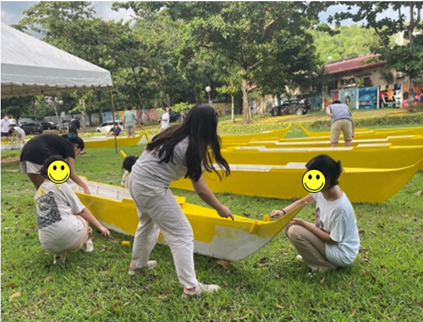
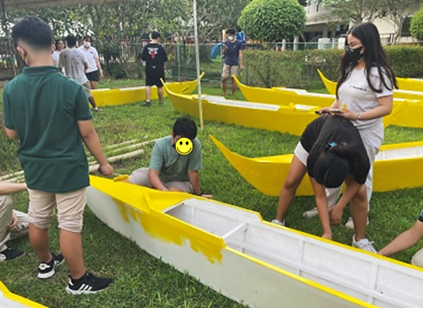
Beach Adroit Signage Awareness (BASA)
This group of students organized a project on how to protect the environment, particularly marine life. The objective is to come up with signage and put them up at the selected public beaches in Cebu. The students will also talk to the LGUs and communities to raise awareness and empower them to become stewards of the environment.
Here’s what Maximus has to say about his learning experience:
A group of students gathered together to form this project. The goal of this project is to make and design different signs, making use of our creative and collaborative skills. These signs will be made in hopes to spread awareness to the community about keeping the beach clean. We will be placing these signs on various beaches and boats. We desire that this project will be successful as we want this project to be able to raise awareness of our current dying ocean. Marine life is suffering due to the pollution caused by humans such as littering in the ocean, oil spills, etc. As a group, we will be creating beach signages to remind people to clean up their trash to help restore our beaches and marine life. We know that as students that there aren’t a lot of things that we can do to a very grand scale issue however we do acknowledge that there are impacts to the actions we make therefore we are initiating some action to help this issue in any way possible.
The BASA group has already made its first steps in accomplishing this project. On November 4, we started with the first phase of the project by coming up with the designs for the sign and started working on making them. On this day, we called up some volunteers from our classmates and we were able to receive much support in starting the first phase of the project. The BASA group wishes that there will be more days like this to come to accomplish the project.
MYP PHE Swimming
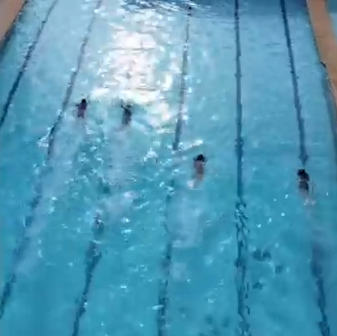
At Cebu International School, we believe that swimming is an essential life skill that all our students must learn. We do this through our PHE swimming unit which is taught from Elementary to Middle School levels. In this unit, students learn about streamlining, drag and resistance. The teacher will do an actual demonstration of techniques in swimming strokes and survival strokes. Students are allowed to practice various swim strokes such as freestyle, breaststroke, butterfly, and backstroke. This unit also allows our students to showcase their creative and innovative skills. This is done by evaluating solutions to problems, taking risks, considering alternatives, and making smart judgments. Aside from thinking skills, communication is also very important when learning this unit. Students should listen and follow instructions properly, listen to others to understand them, give and receive feedback, interpret non-verbal communication techniques and use them purposely. Students are also expected to be organized and must arrive with appropriate equipment and on time.
Dragon’s Print
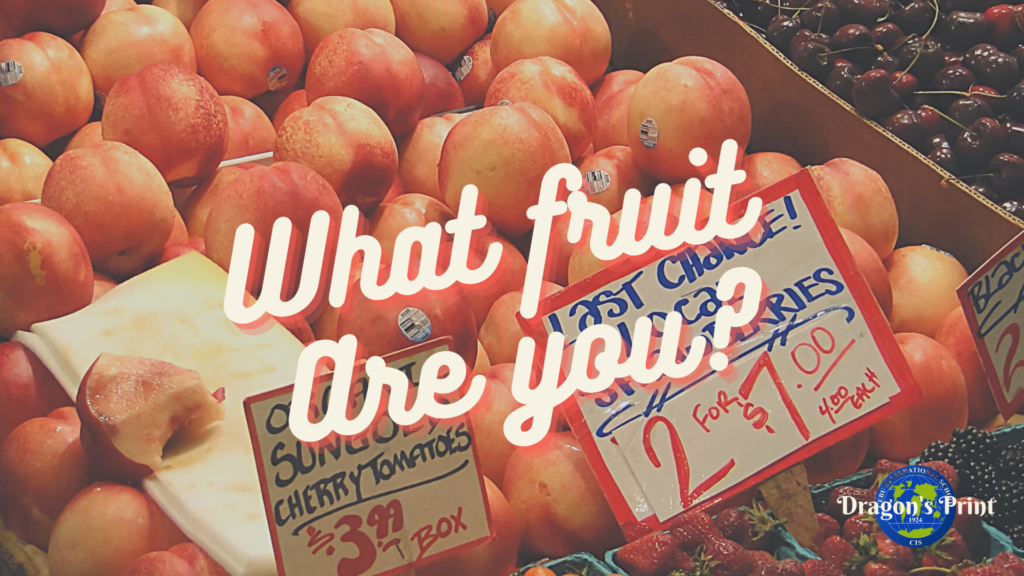
Feeling fruity? Between bananas to grapes, take Dragon’s Print’s new quiz to find out which fruit you are! Access the quiz and tell us which fruit is your favorite! Visit us at http://dragonsprint.cis.
Tree of Giving
by CIS Student Council
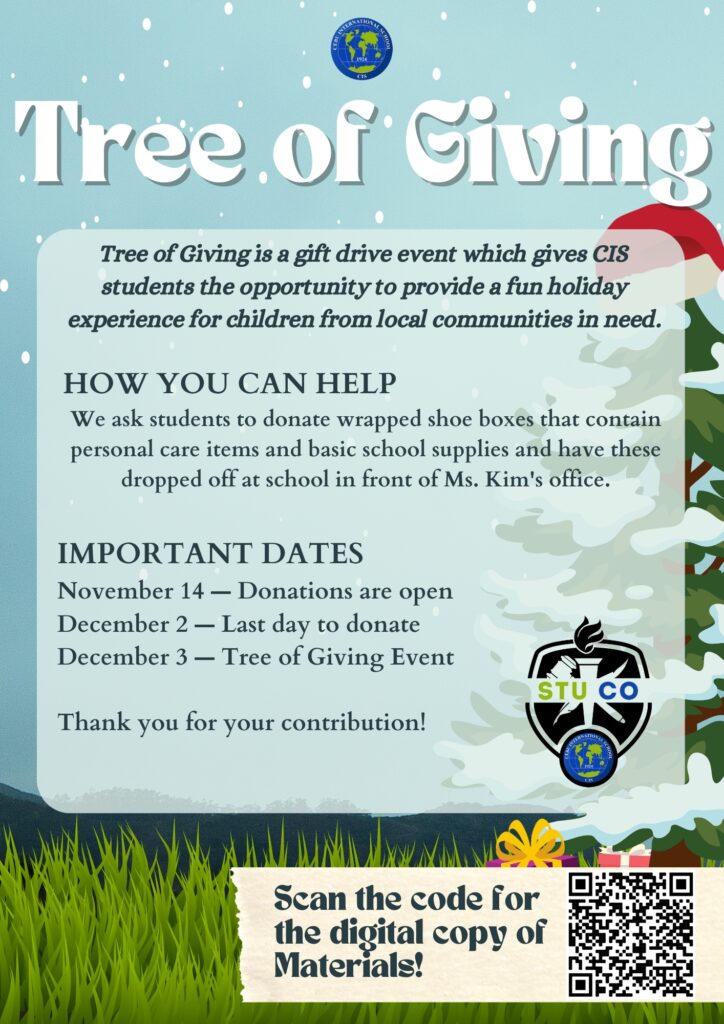
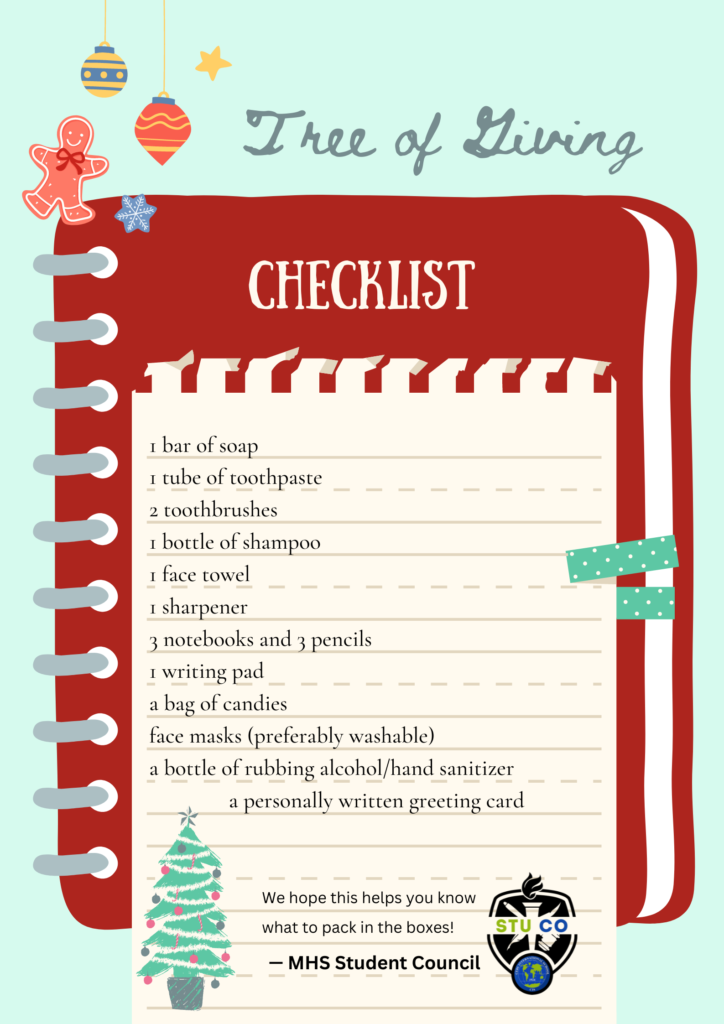
College/Careers Counselor Corner
by Ms. Jenny Basa, College/Careers Counselor Corner
Question of the Week
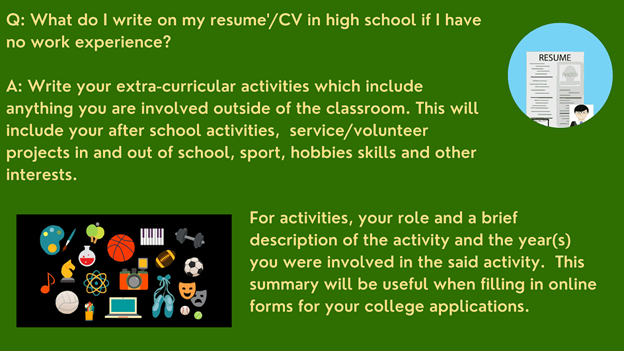
College Events (Virtual and Face to Face)
DATE
November 25
Friday
9:15 – 10:00 AM
Canteen Annex
Link to sign up
IE University (Spain) – Face to face info session followed by Q & A with a university rep.
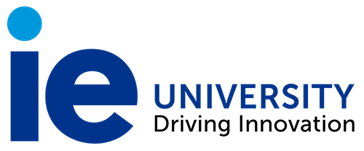
December 7
Wednesday
10:00 AM
Link to register
University of Southern California Summer Programs Virtual Info Session: The session will highlight the benefits of attending USC Summer Programs, dive into our USC Summer experience, and discuss application best practices and common mistakes.
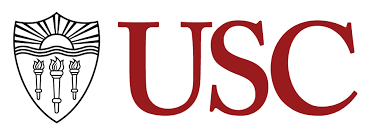
Note: College visits will resume in January so students can focus on end of semester assessments.
SAT UPDATE for 2022-2023
2022–23 School Year Test Dates
| SAT Test Date | Deadline for Registration, Changes and Regular Cancellation |
| December 3, 2022 | November 3, 2022 |
| March 11, 2023 (Digital) | February 24, 2023 |
| May 6, 2023 (Digital) | April 21, 2023 |
| June 3, 2023 (Digital) | May 19, 2023 |
Test dates labeled Digital means that students will bring a device to the test center and take the exam using their device. The College Board may provide devices for test-takers who do not have access to a device. All test-takers for Digital SATs are still required to report physically to the test center to take the test.
To register for the SAT, you may click on this link. If you need assistance or have any questions, please feel free to email Ms. Jenny Basa at jbasa@cis.edu.ph.


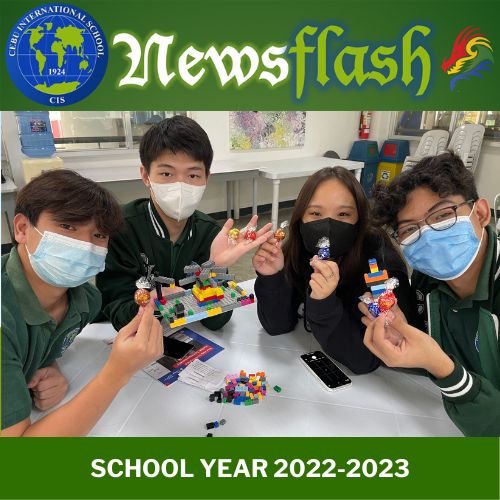
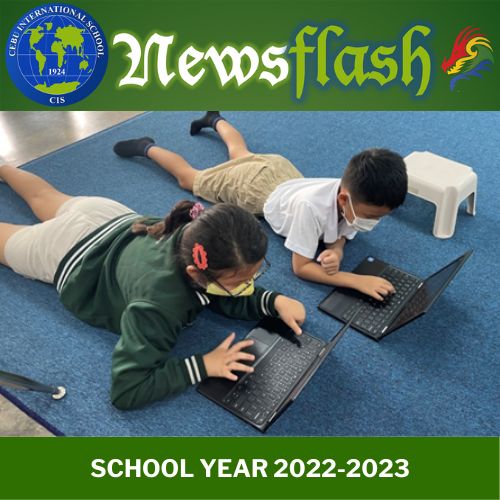
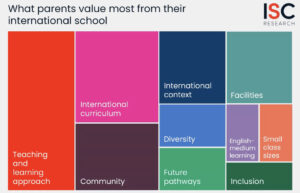

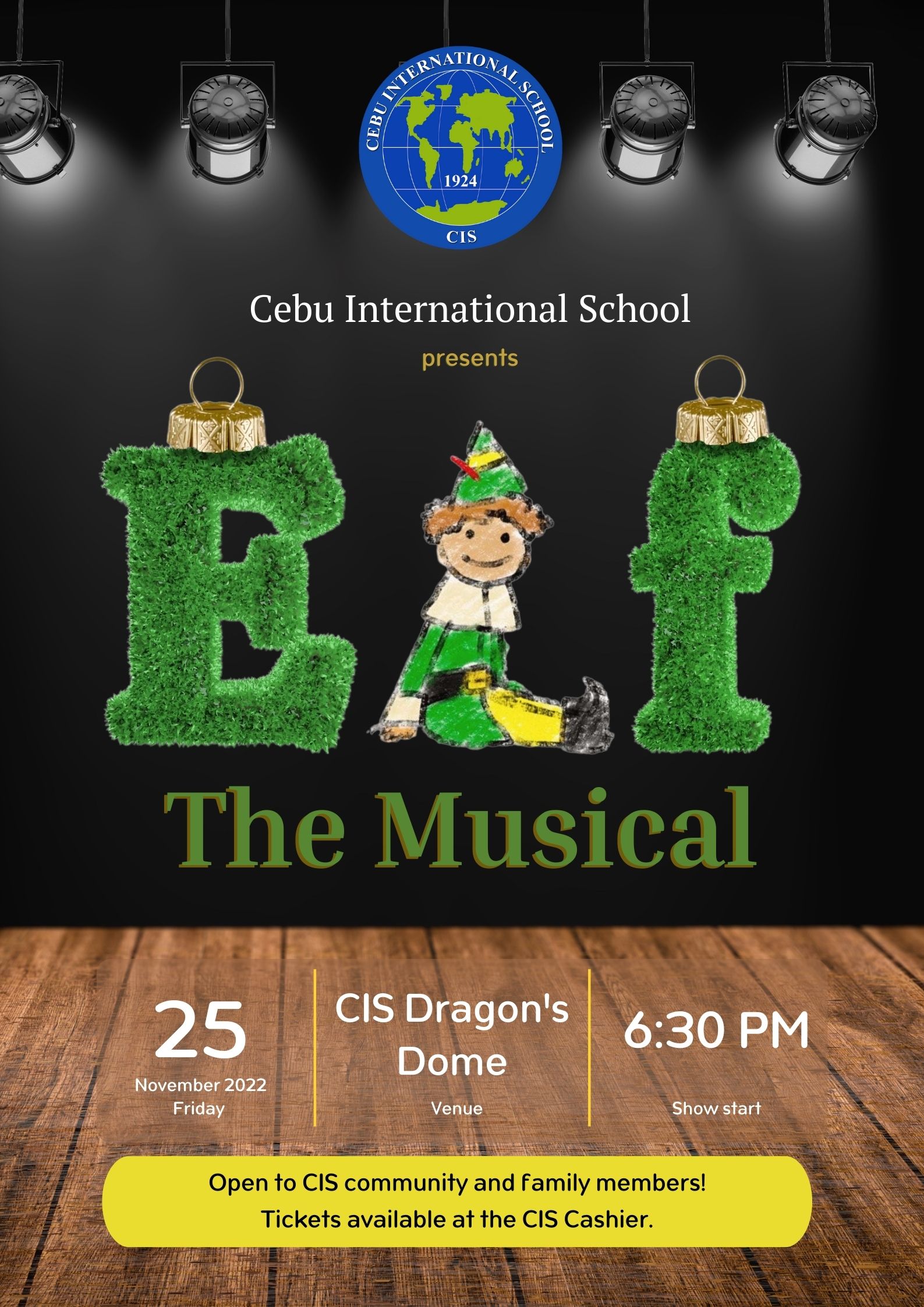
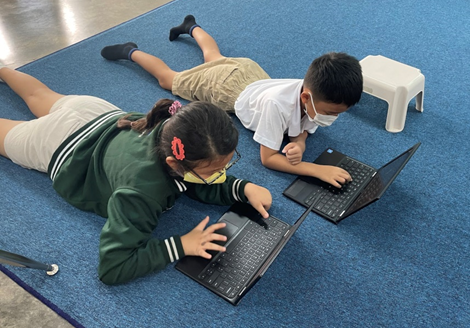
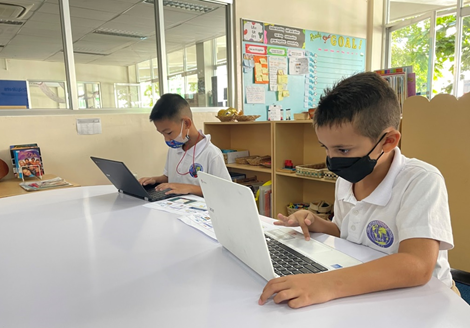
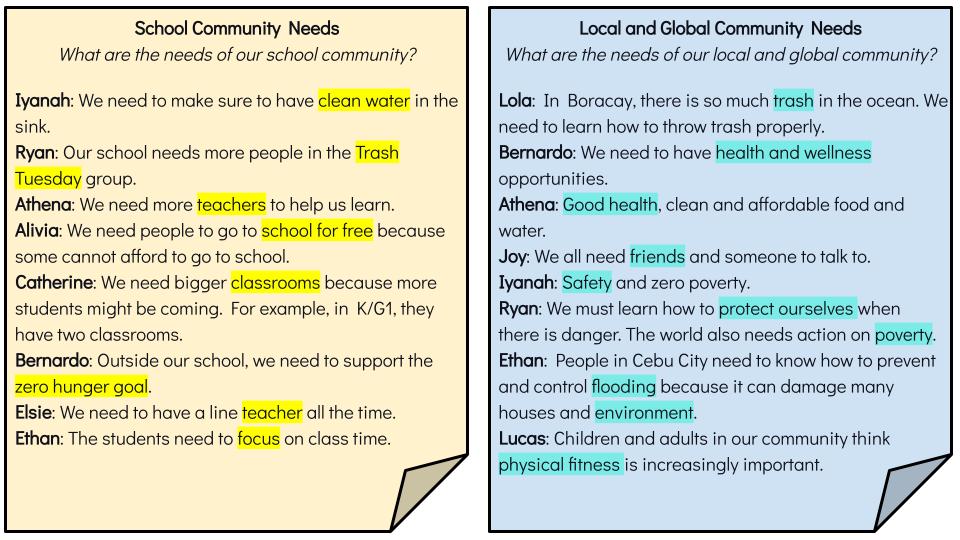 Research Skills
Research Skills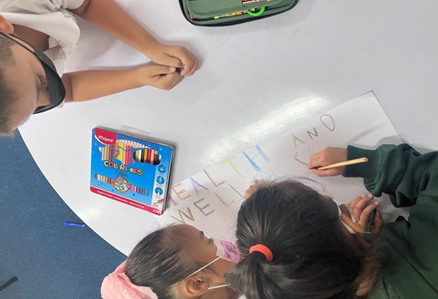
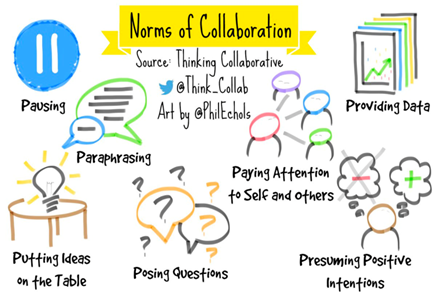
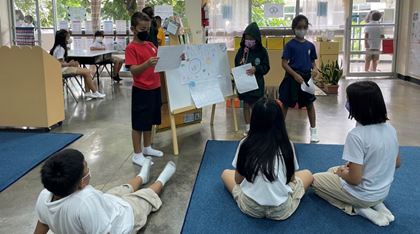
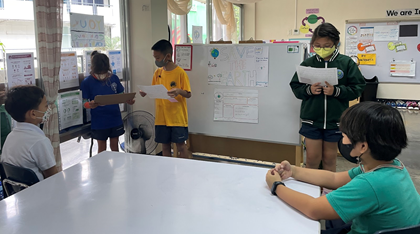
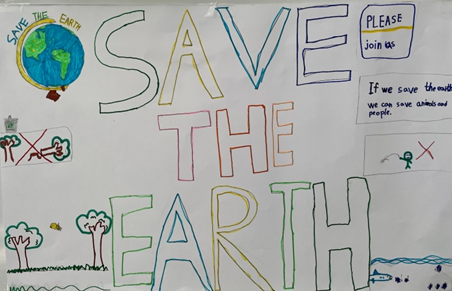
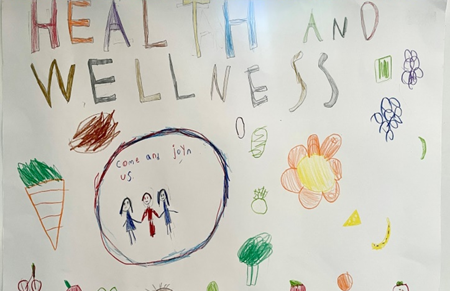
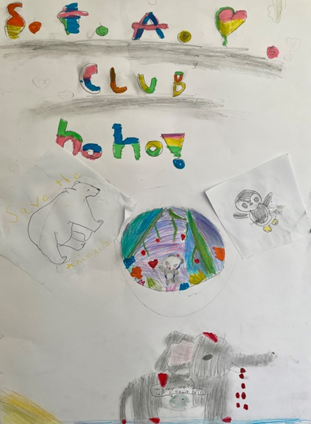
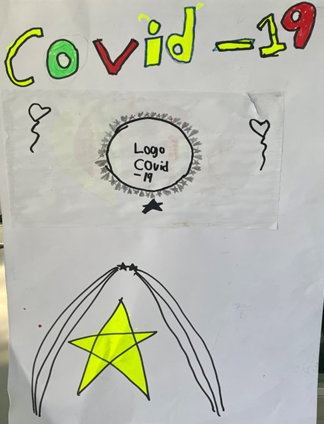
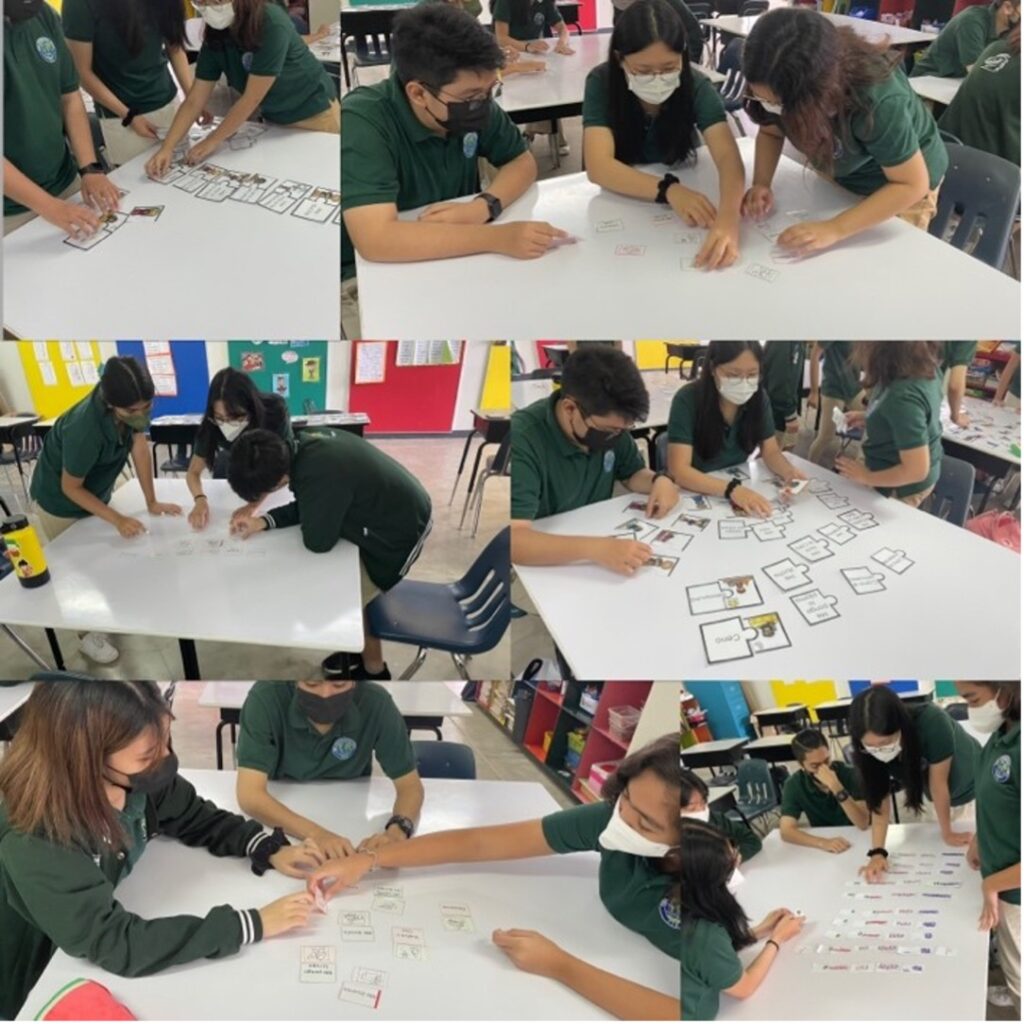
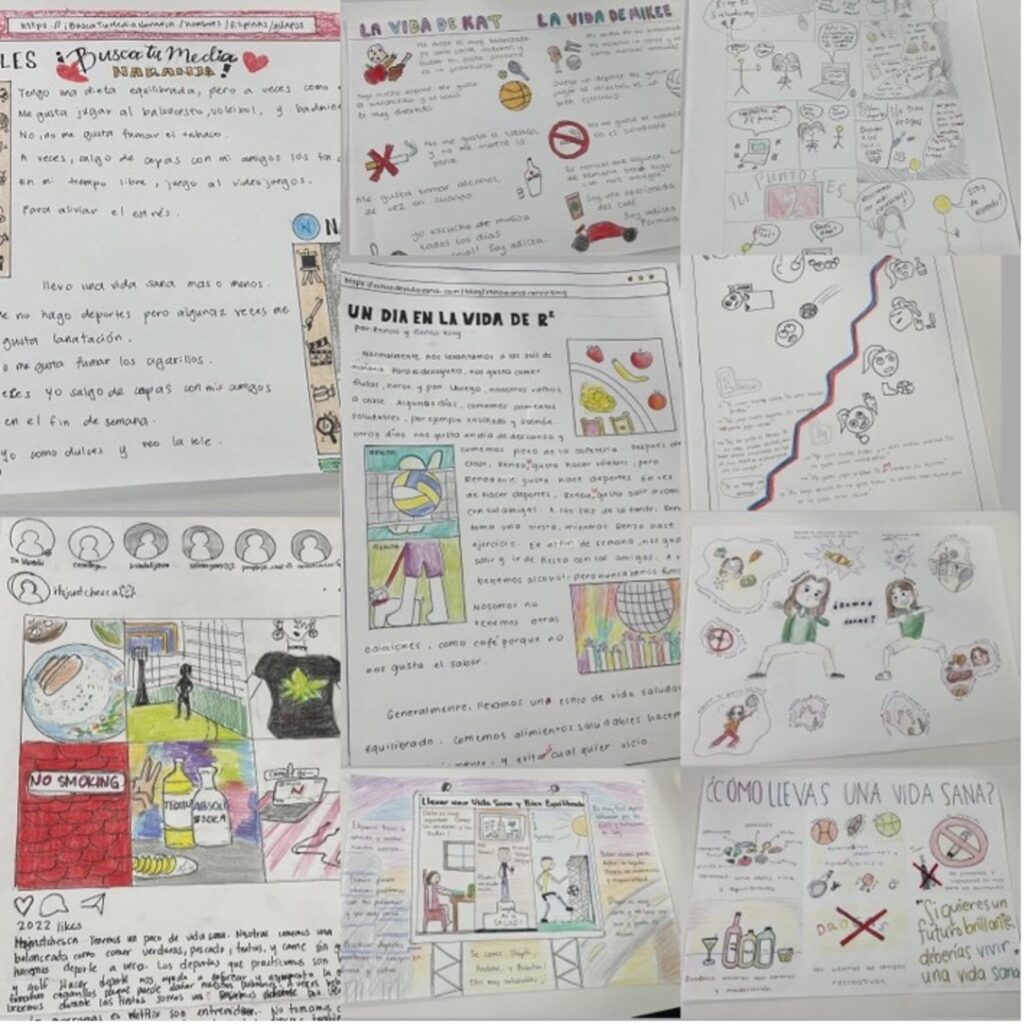
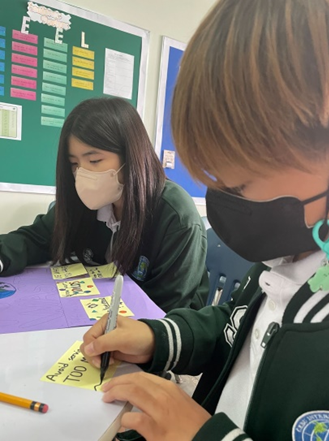 What are some ways you can reduce food waste?
What are some ways you can reduce food waste?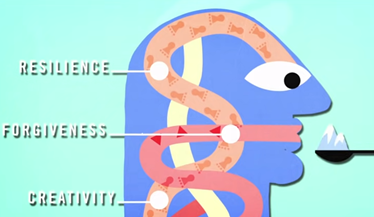 G8/9 has been zooming off all over the world….. through our writing. In our current unit, we ask ourselves the question ‘Can we travel through writing?’. We explore travel blogs and take a stab at writing our own, all while discussing how travel influences us. It has led to a few debates as we discuss whether or not Beijing Roast duck (北京烤鸭)is as delicious as it is made out to be, or what the balance between personal narrative and information should be in a blog post. A resource that helped us to think more critically about the influence of travel was
G8/9 has been zooming off all over the world….. through our writing. In our current unit, we ask ourselves the question ‘Can we travel through writing?’. We explore travel blogs and take a stab at writing our own, all while discussing how travel influences us. It has led to a few debates as we discuss whether or not Beijing Roast duck (北京烤鸭)is as delicious as it is made out to be, or what the balance between personal narrative and information should be in a blog post. A resource that helped us to think more critically about the influence of travel was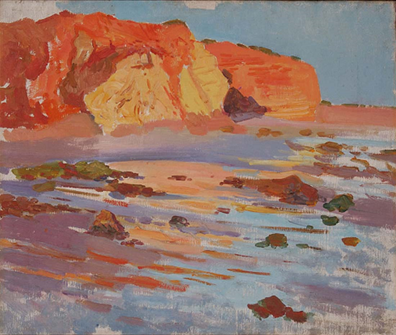
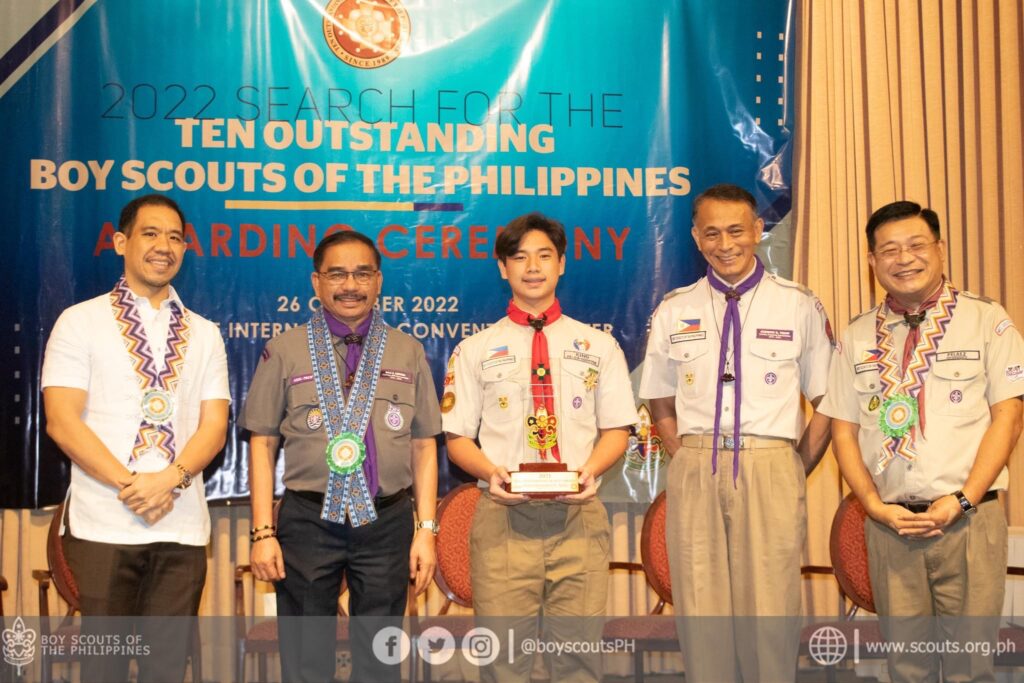 The ten outstanding boy scouts of the Philippines (TOBS) is one of the most, or the most, prestigious award one can achieve as a boy scout. In order to gain that title, one must go through a rigorous process, from starting at the local council level then to regional then to national, against thousands of other boy scouts all around the nation. One has to epitomize good moral character, maintain academic excellence, and demonstrate strong qualities of leadership in the institution and the community.
The ten outstanding boy scouts of the Philippines (TOBS) is one of the most, or the most, prestigious award one can achieve as a boy scout. In order to gain that title, one must go through a rigorous process, from starting at the local council level then to regional then to national, against thousands of other boy scouts all around the nation. One has to epitomize good moral character, maintain academic excellence, and demonstrate strong qualities of leadership in the institution and the community.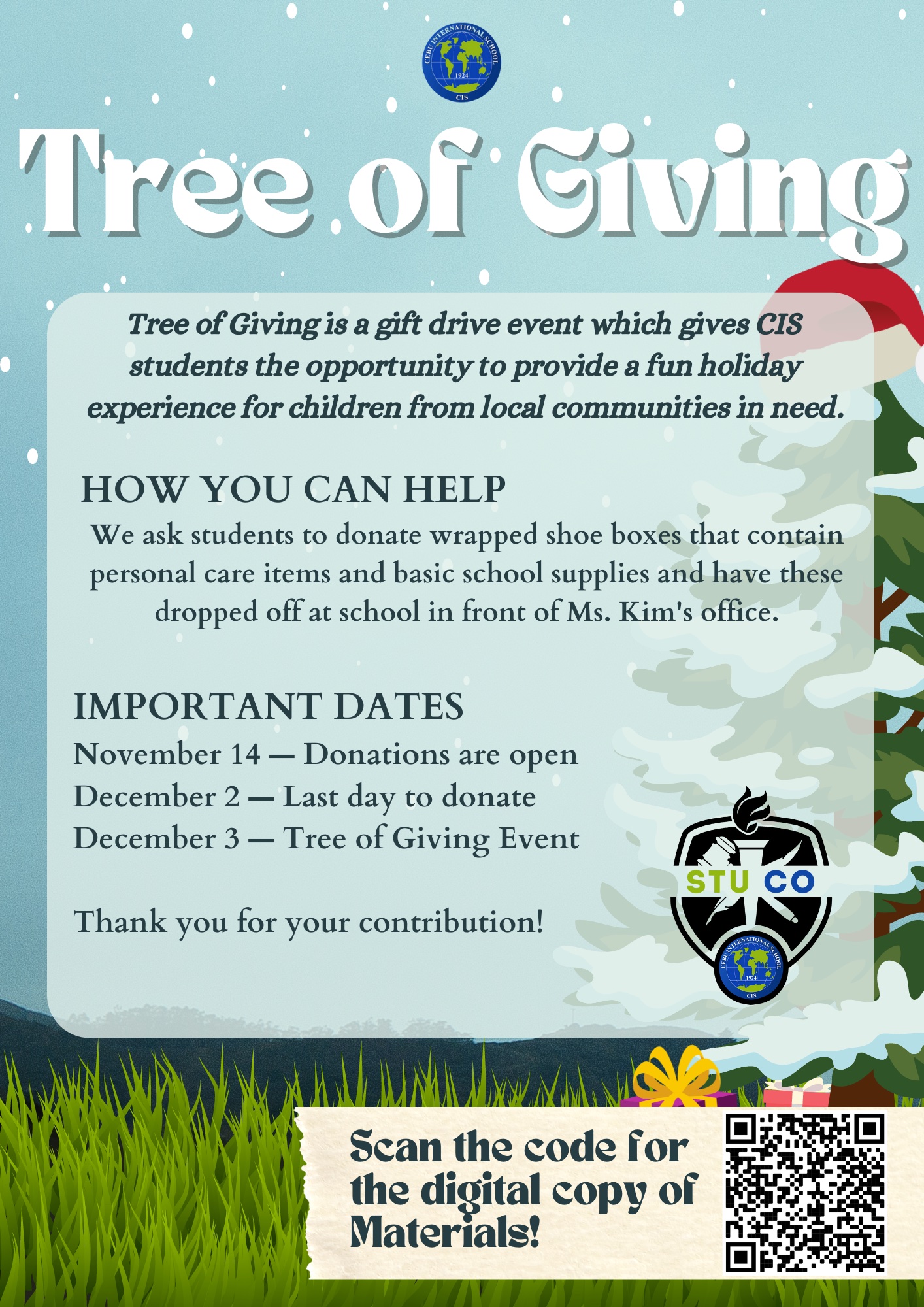
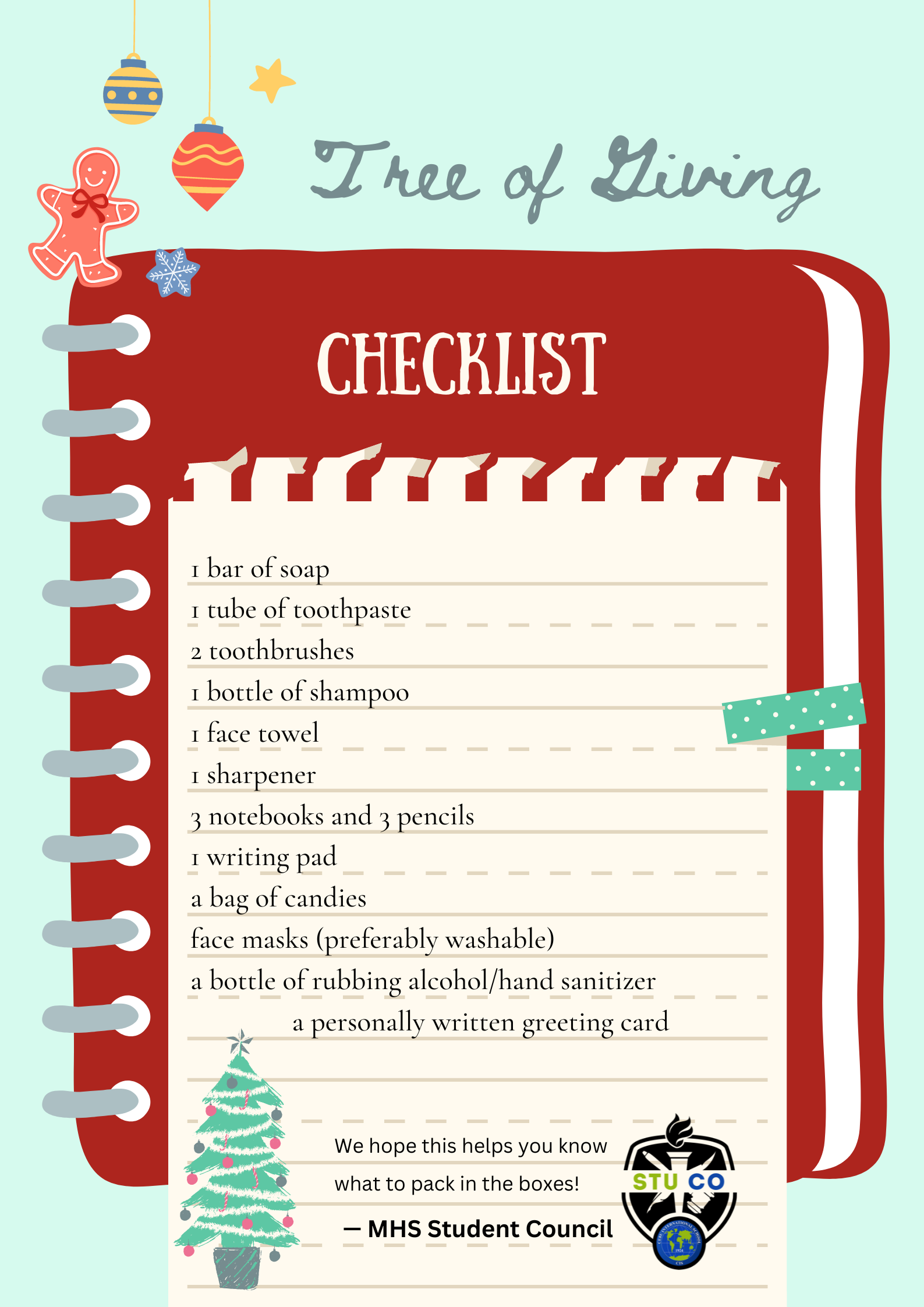
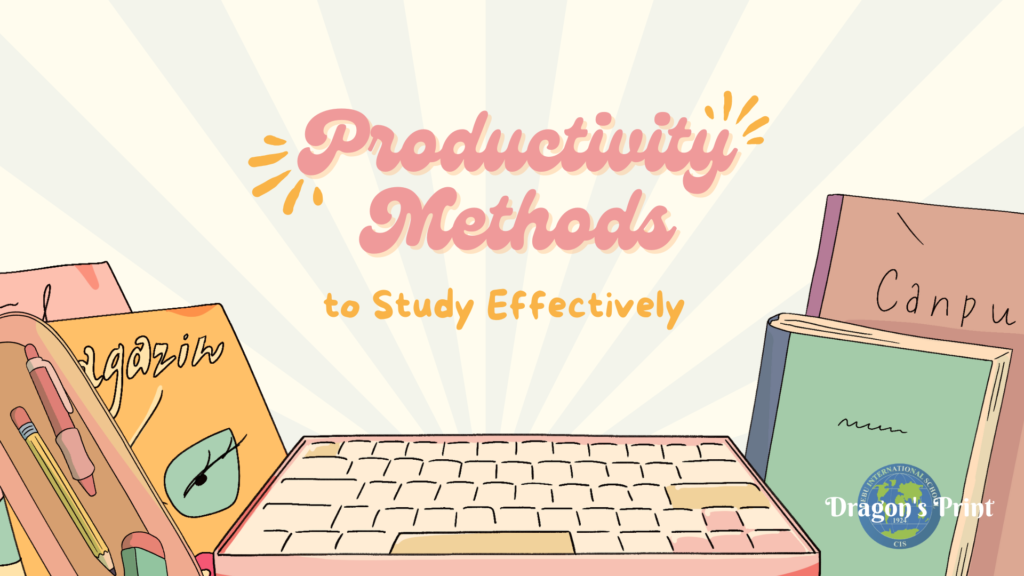
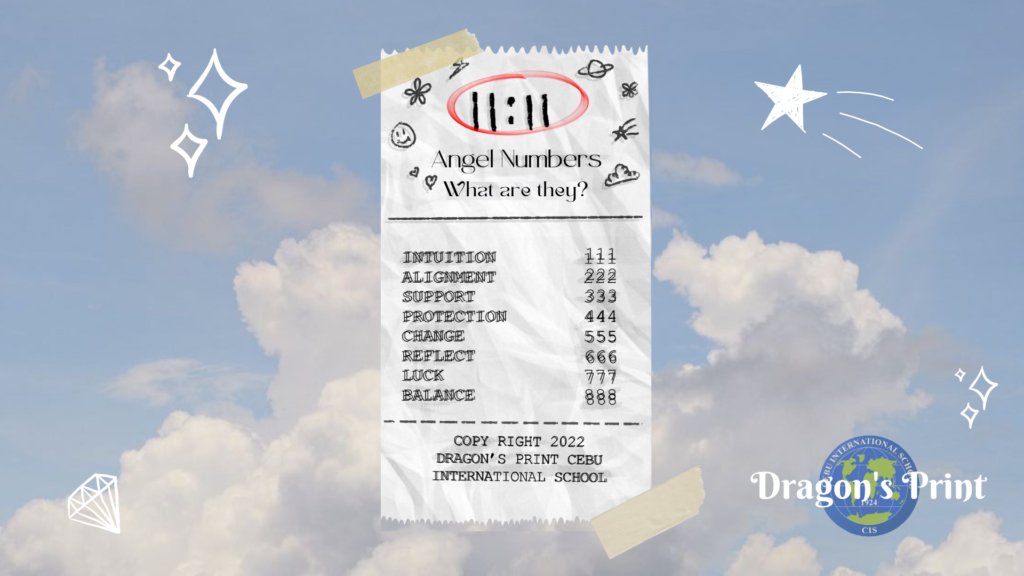
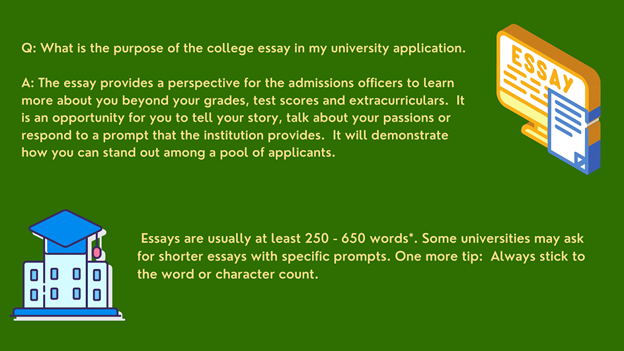
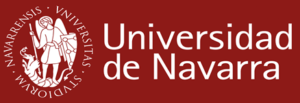
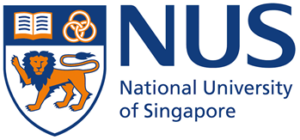
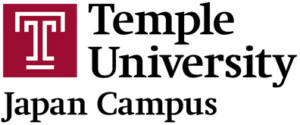
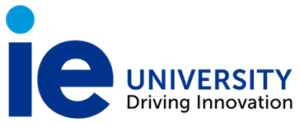

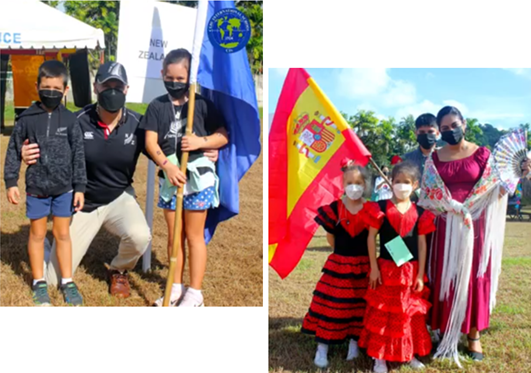 recognizing the strong bonds that we share.
recognizing the strong bonds that we share.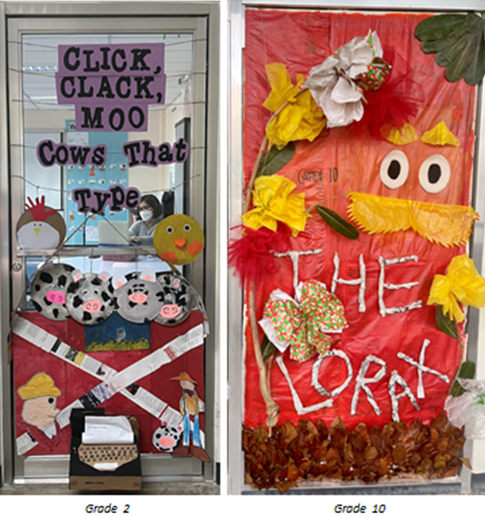
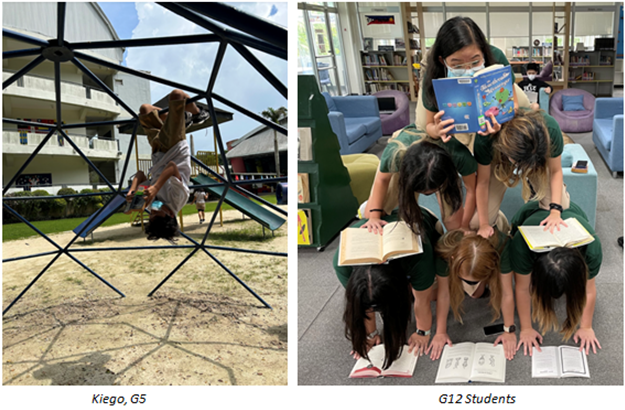
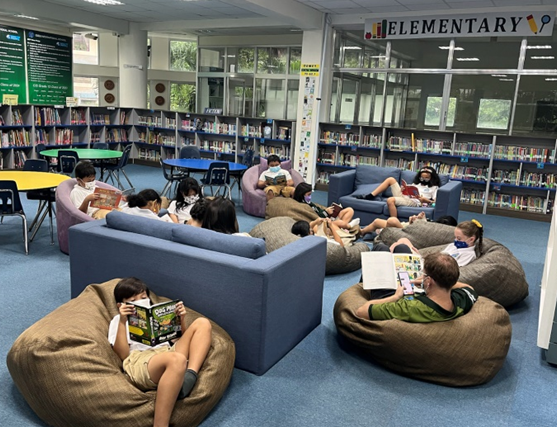
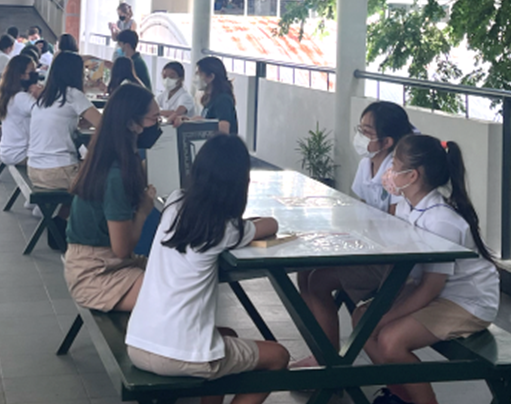
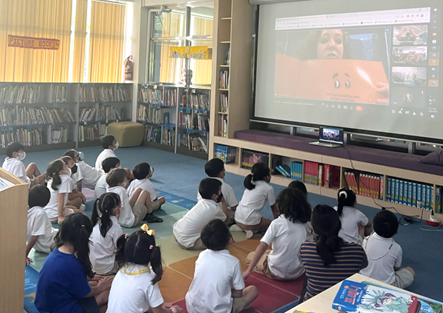 Book Talk
Book Talk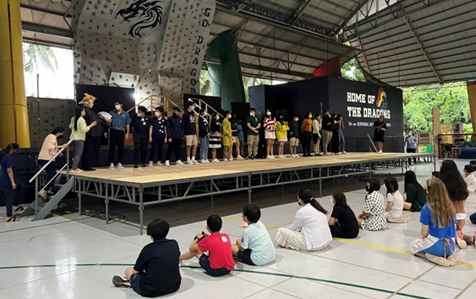
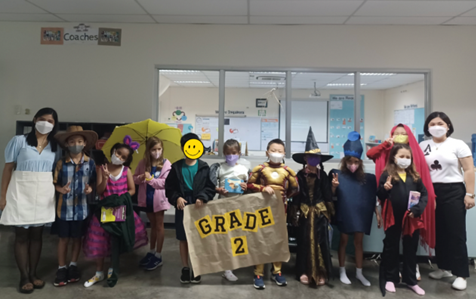
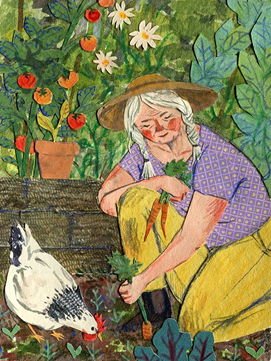
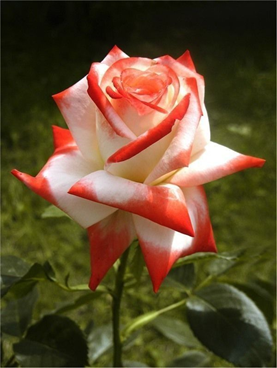
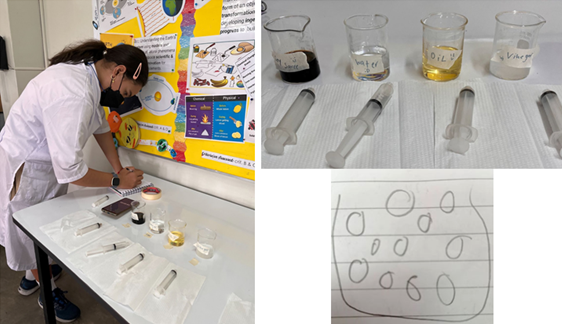
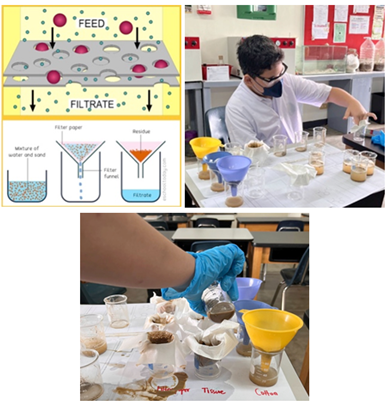
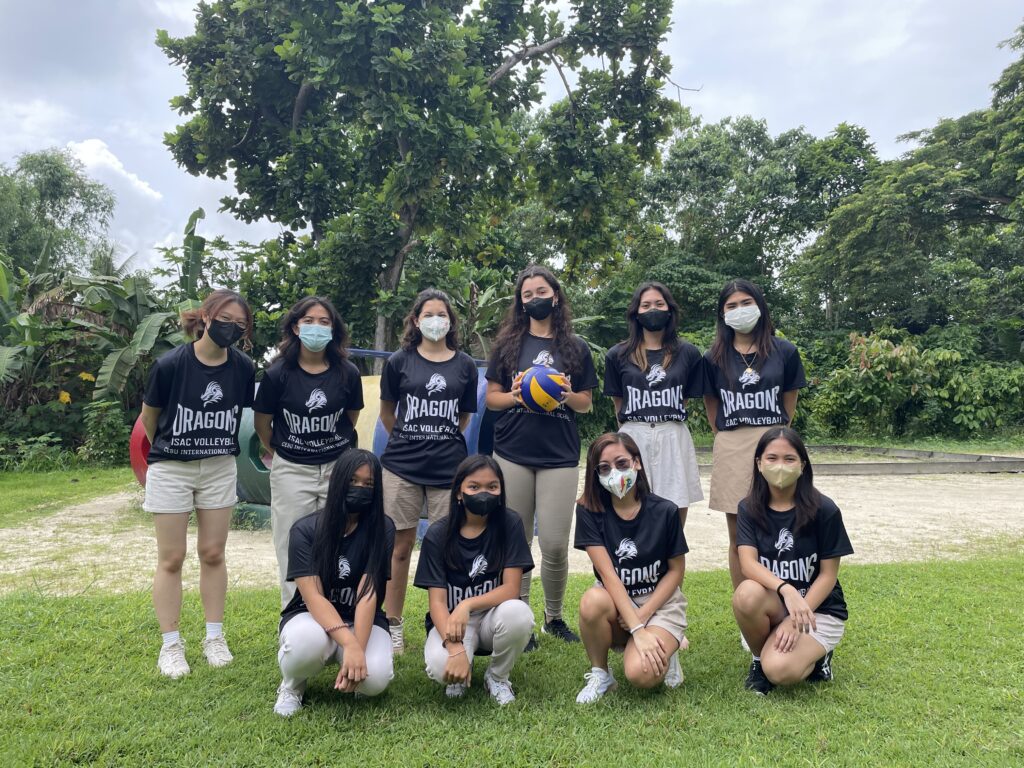
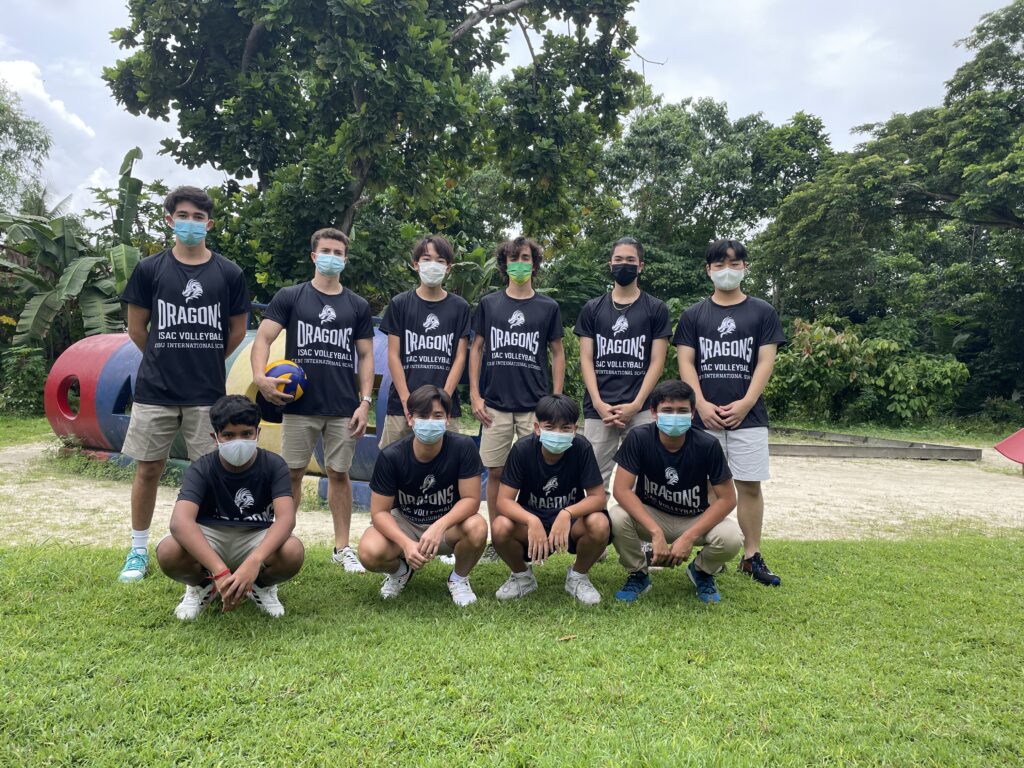
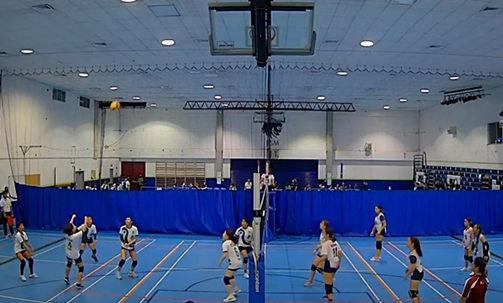 In addition to feeling like we were more unified as a team, I also felt like we were all more well-prepared thanks to our training. We were able to train the team in several areas throughout this whole process and although it was hard at times, we were all able to work together and help each other improve our skills. Last time, we concentrated more on stamina and less on the precise abilities we required, but this time, we accomplished all of that and much more. Being a team captain this year has also been one of the highlights of this whole experience for me since it has helped me become a more well-rounded teammate and leader. How to operate as a team is one important thing I took away from the entire process. Because of everyone’s attention to all the sessions and readiness to pick things up, our team this year was unquestionably among the best of the ISAC teams because of how much we worked together. I wholeheartedly recommend ISAC to all students since it is not only focused on athletics but also provides you the ability to collaborate with others, pick up new skills, utilize it to motivate your academic performance, make new friends and play against players from other international schools around the Philippines. I am so incredibly proud of both teams for the placements we got and we should all be very pleased with where we got even though we definitely could have done better. Finally, I would like to express my thanks to Mr. Ace for not only organizing our entire trip but also for coaching the boys’ and girls’ teams to success all on his own and for always being accessible to us when we had questions or needed advice
In addition to feeling like we were more unified as a team, I also felt like we were all more well-prepared thanks to our training. We were able to train the team in several areas throughout this whole process and although it was hard at times, we were all able to work together and help each other improve our skills. Last time, we concentrated more on stamina and less on the precise abilities we required, but this time, we accomplished all of that and much more. Being a team captain this year has also been one of the highlights of this whole experience for me since it has helped me become a more well-rounded teammate and leader. How to operate as a team is one important thing I took away from the entire process. Because of everyone’s attention to all the sessions and readiness to pick things up, our team this year was unquestionably among the best of the ISAC teams because of how much we worked together. I wholeheartedly recommend ISAC to all students since it is not only focused on athletics but also provides you the ability to collaborate with others, pick up new skills, utilize it to motivate your academic performance, make new friends and play against players from other international schools around the Philippines. I am so incredibly proud of both teams for the placements we got and we should all be very pleased with where we got even though we definitely could have done better. Finally, I would like to express my thanks to Mr. Ace for not only organizing our entire trip but also for coaching the boys’ and girls’ teams to success all on his own and for always being accessible to us when we had questions or needed advice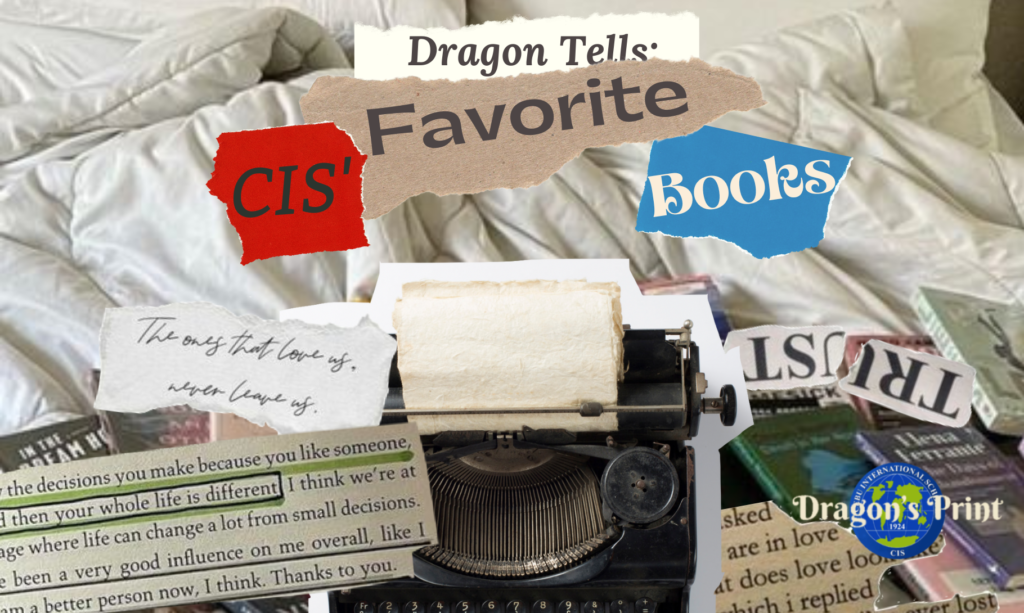
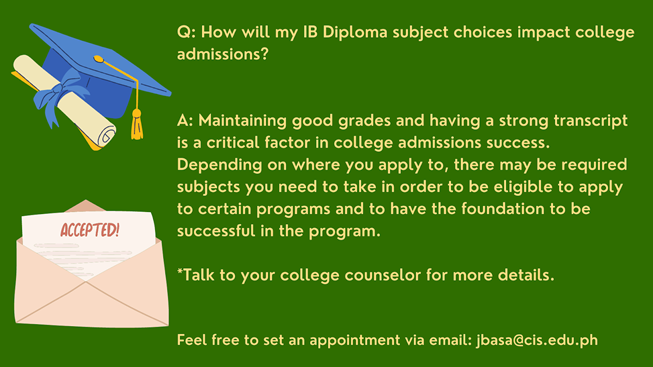




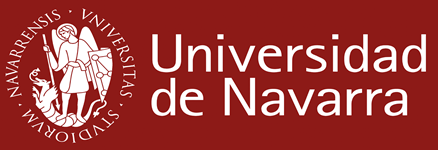
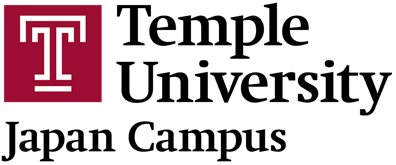
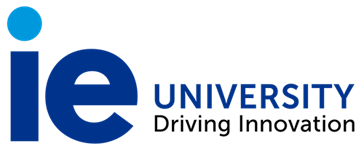

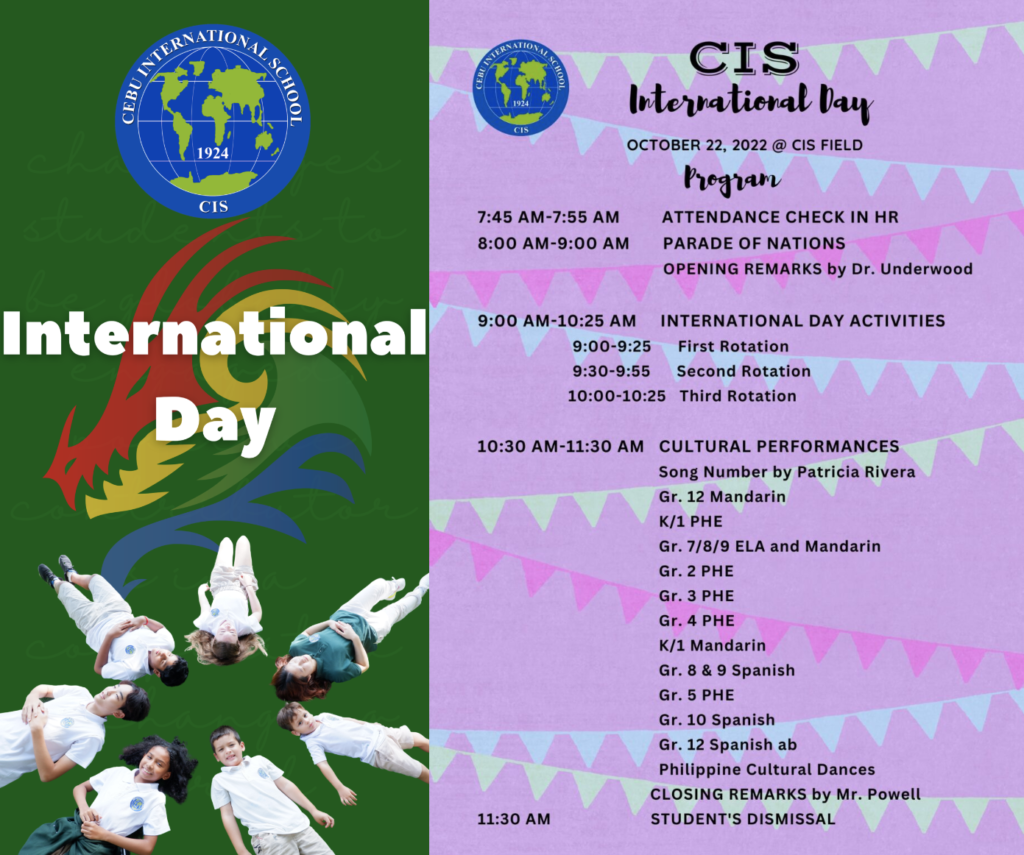
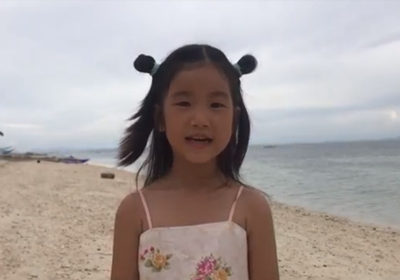
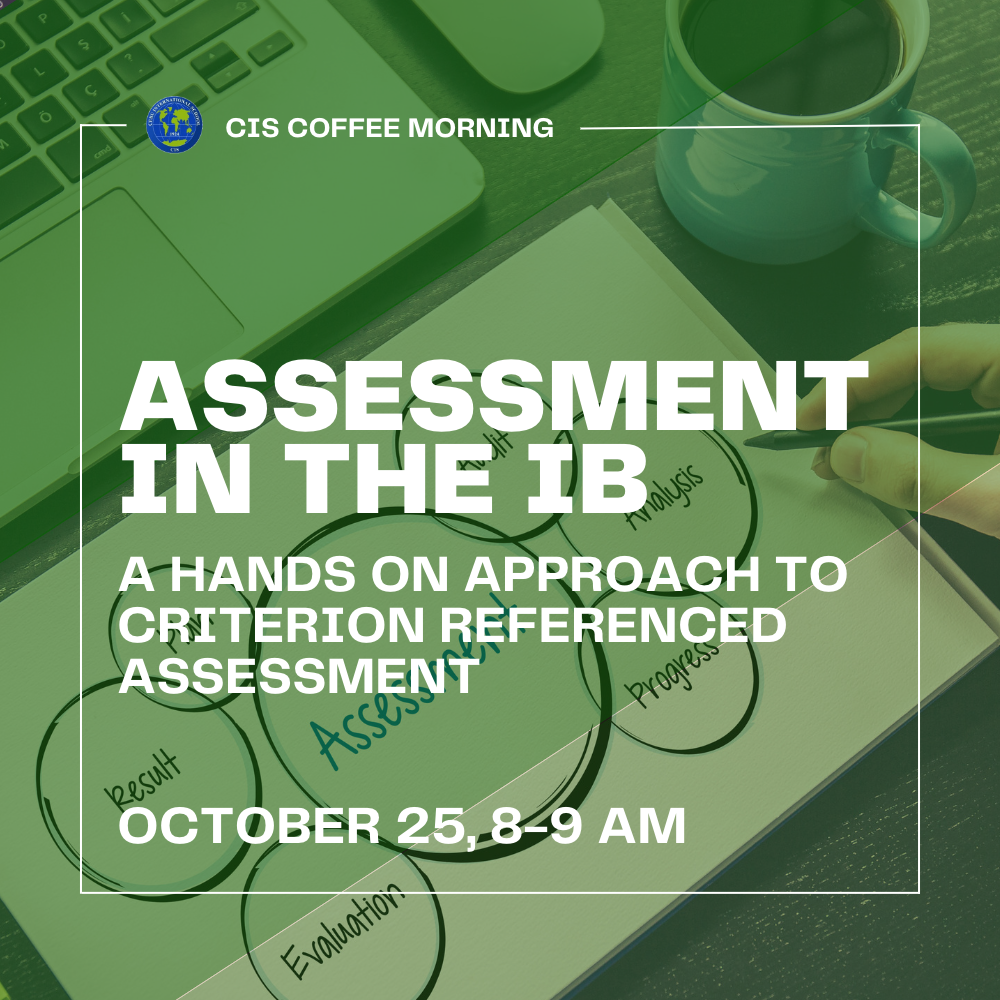
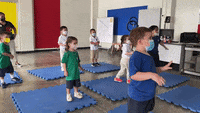
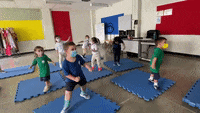
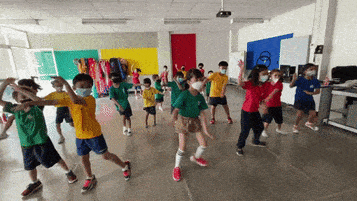
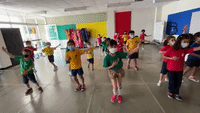
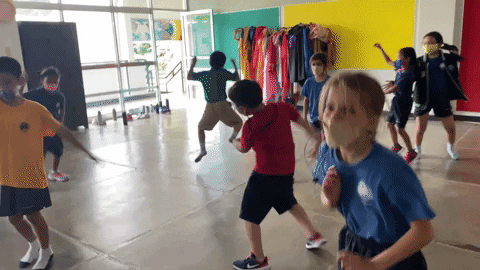
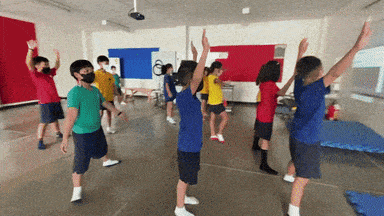
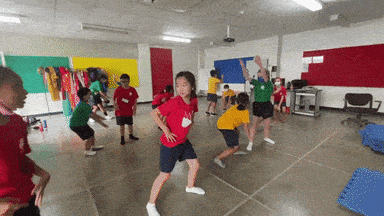
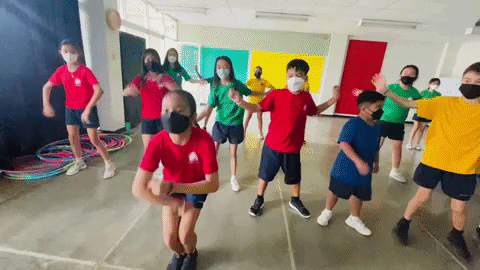
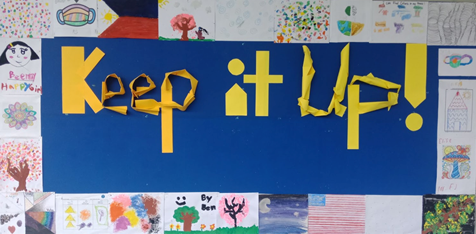
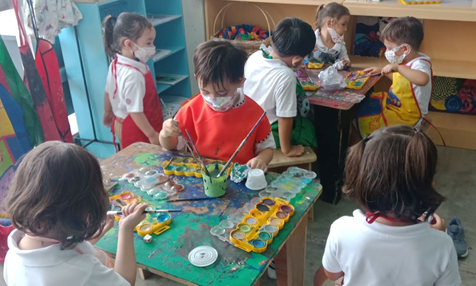
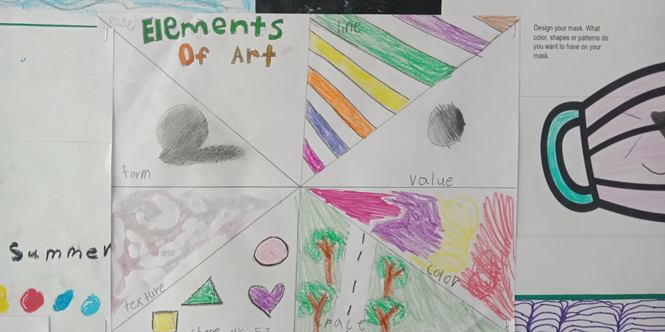
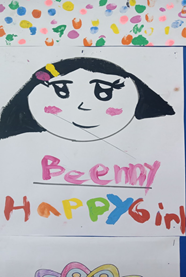 The PYP visual arts class explored the concept of
The PYP visual arts class explored the concept of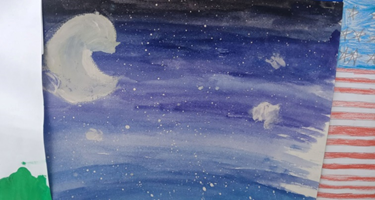
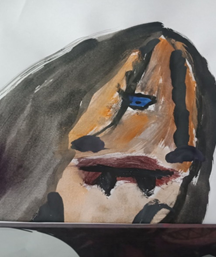
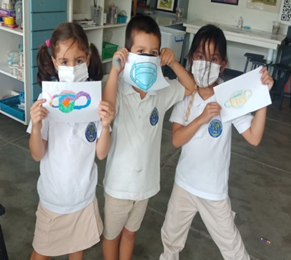
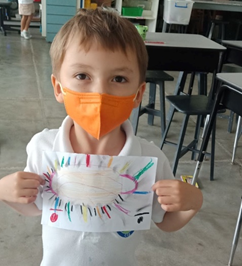
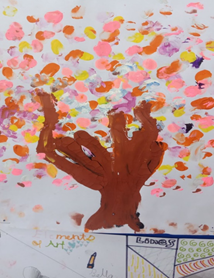
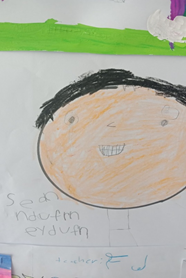
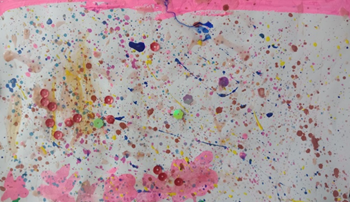
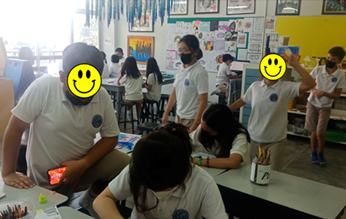 The grade 4 and 5 are tasks to develop prior knowledge about these elements of art and come up with a concrete art piece that reflects their knowledge, choices, ideas, opinions and beliefs inline with the correct application of these set skills needed.
The grade 4 and 5 are tasks to develop prior knowledge about these elements of art and come up with a concrete art piece that reflects their knowledge, choices, ideas, opinions and beliefs inline with the correct application of these set skills needed. 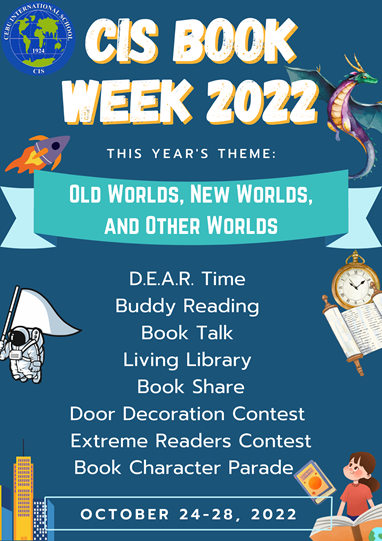


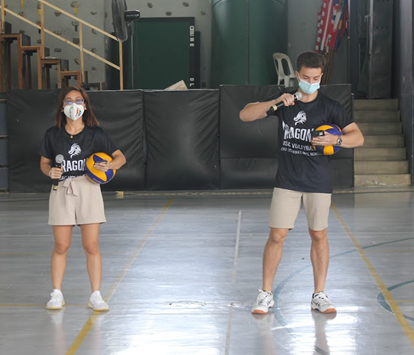
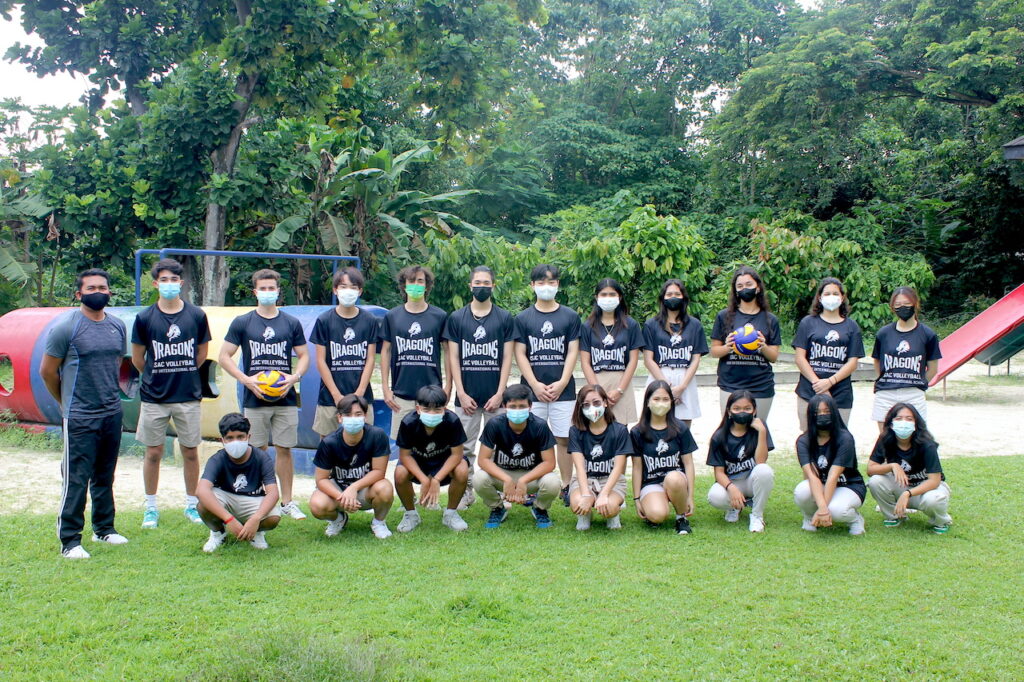
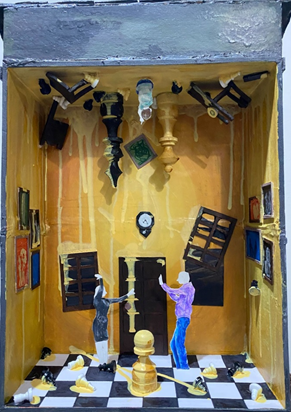
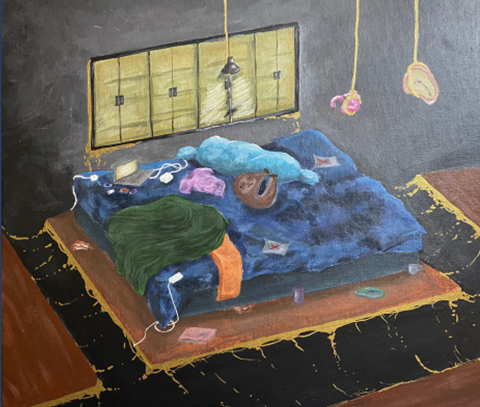
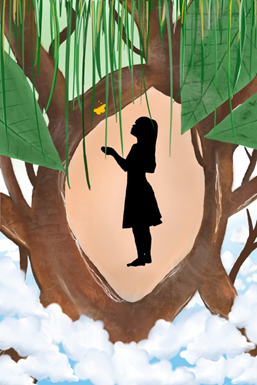
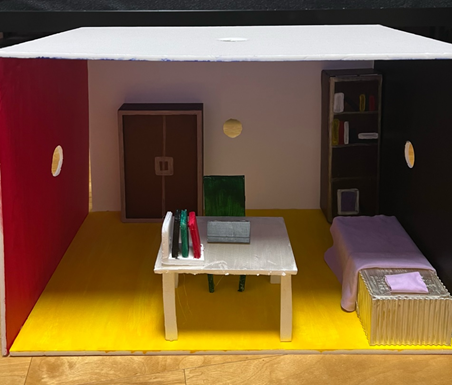
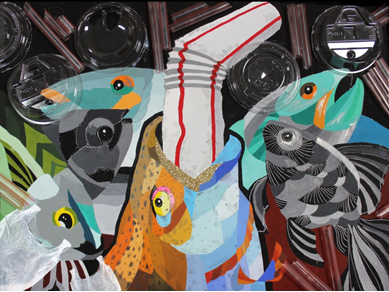

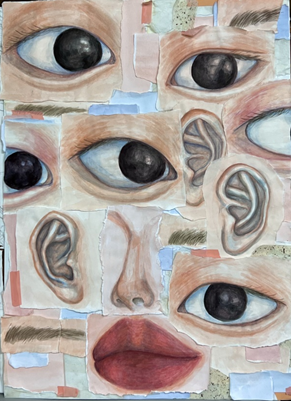
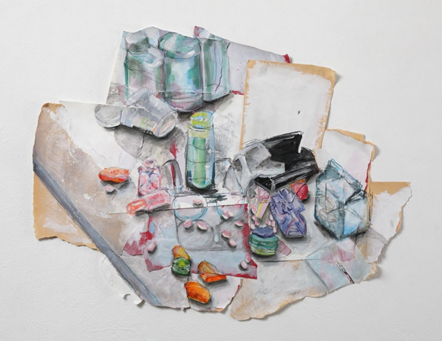
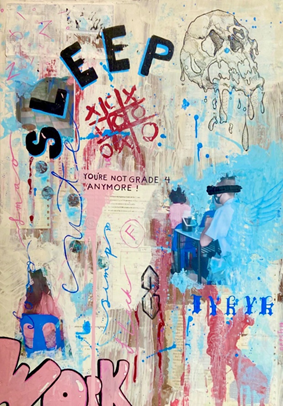
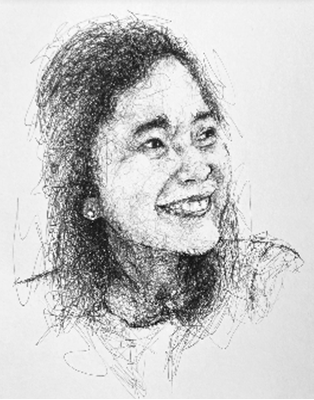


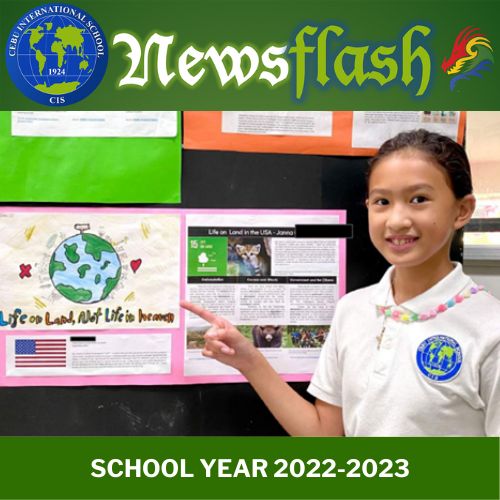
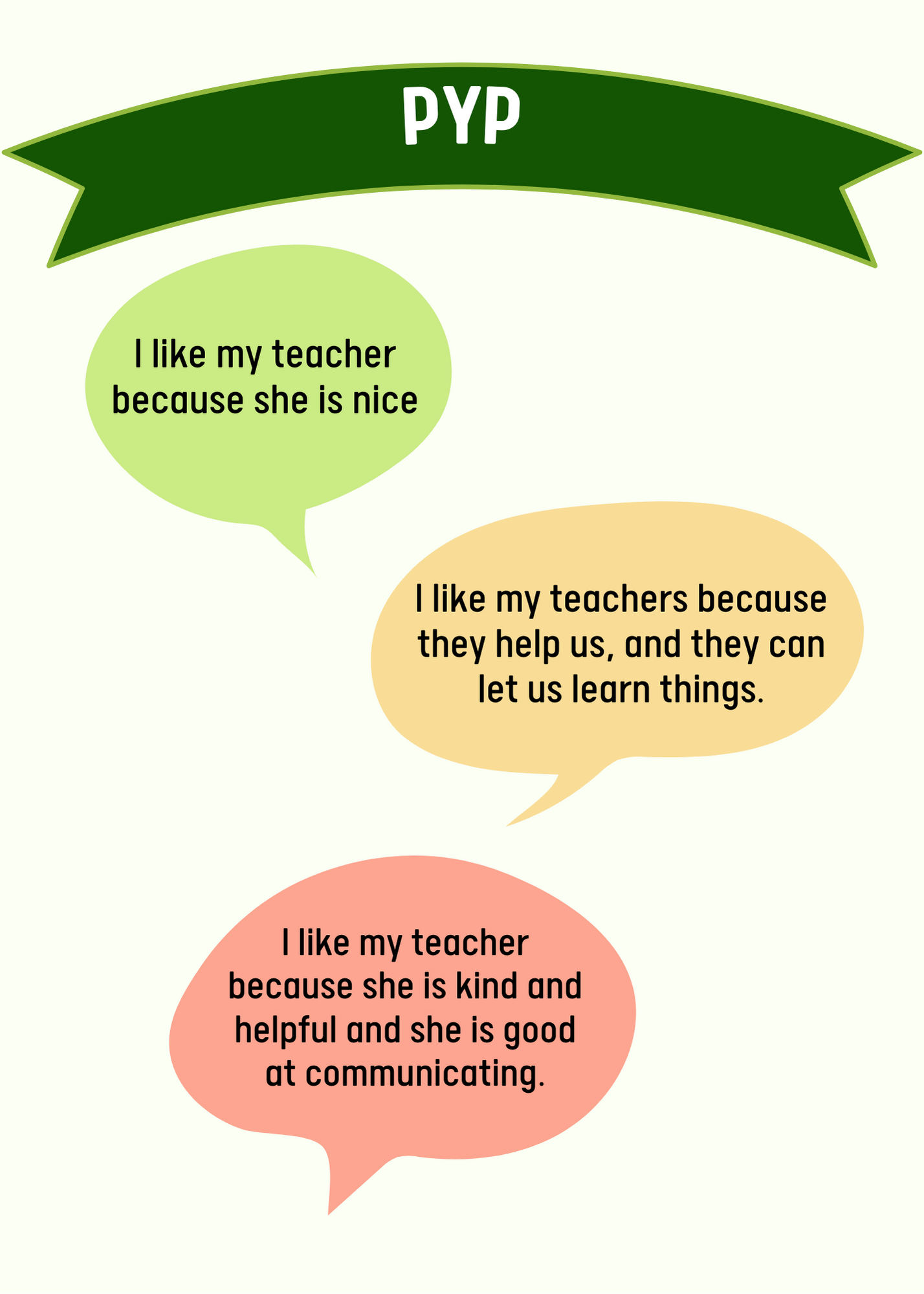
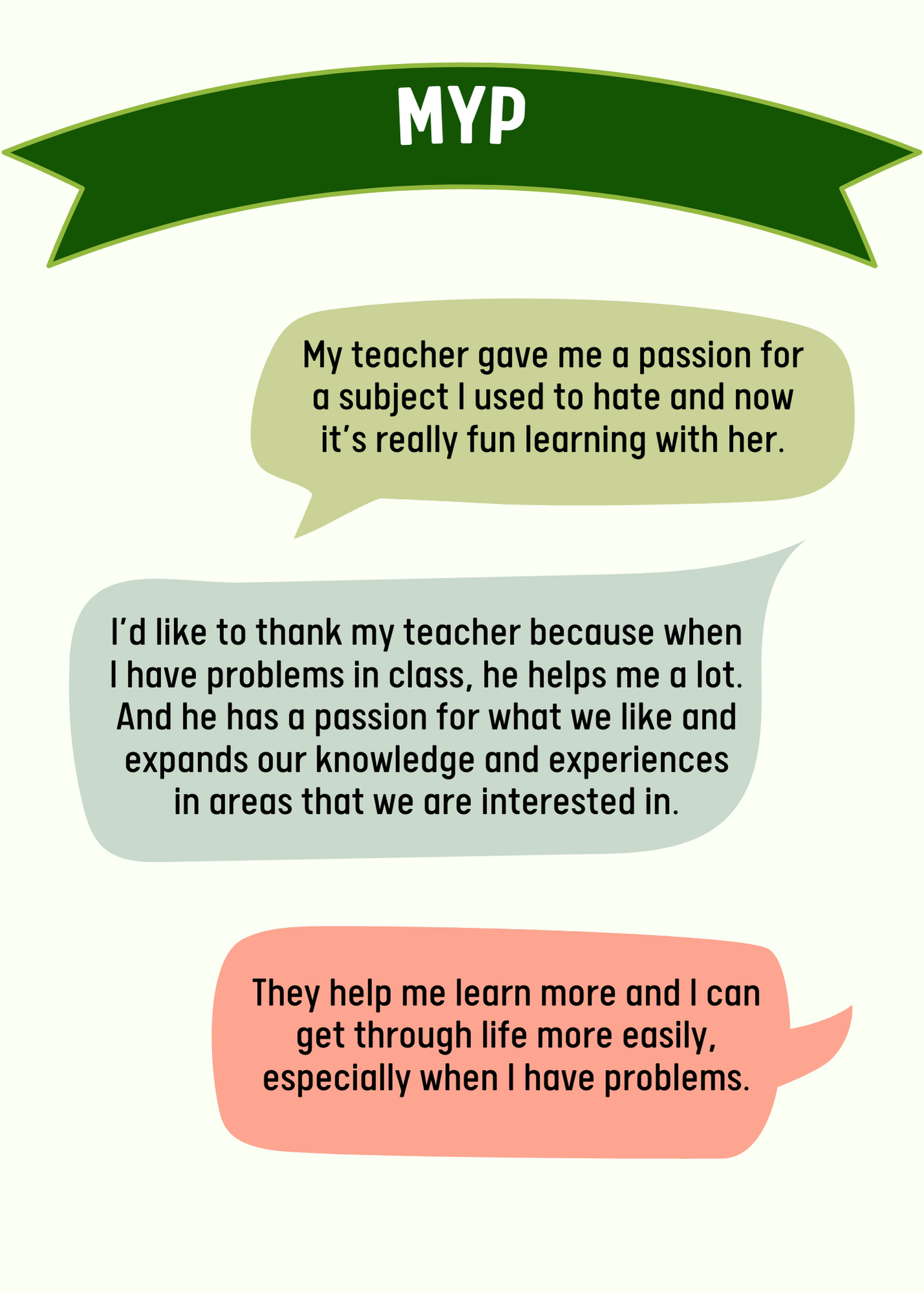
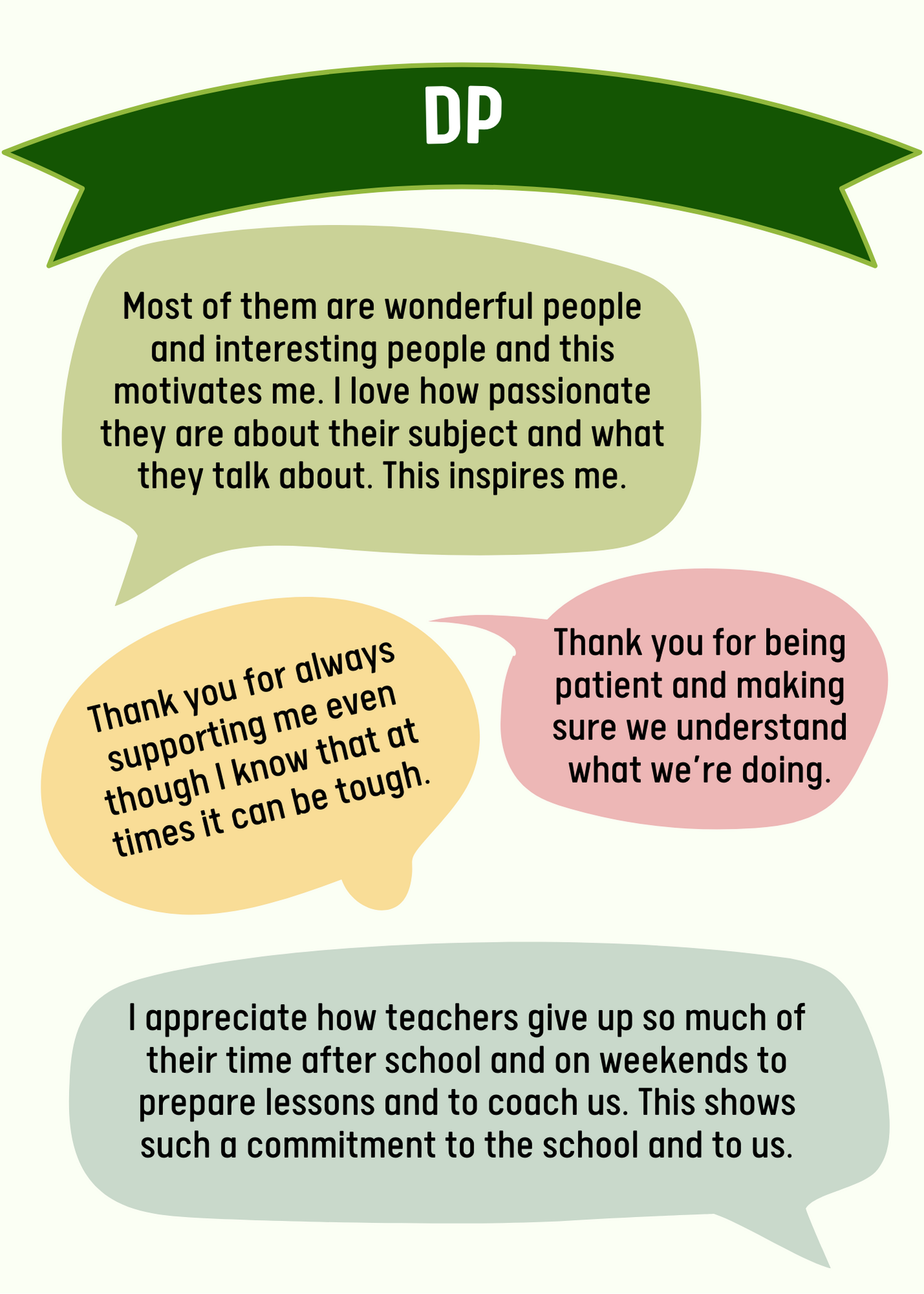
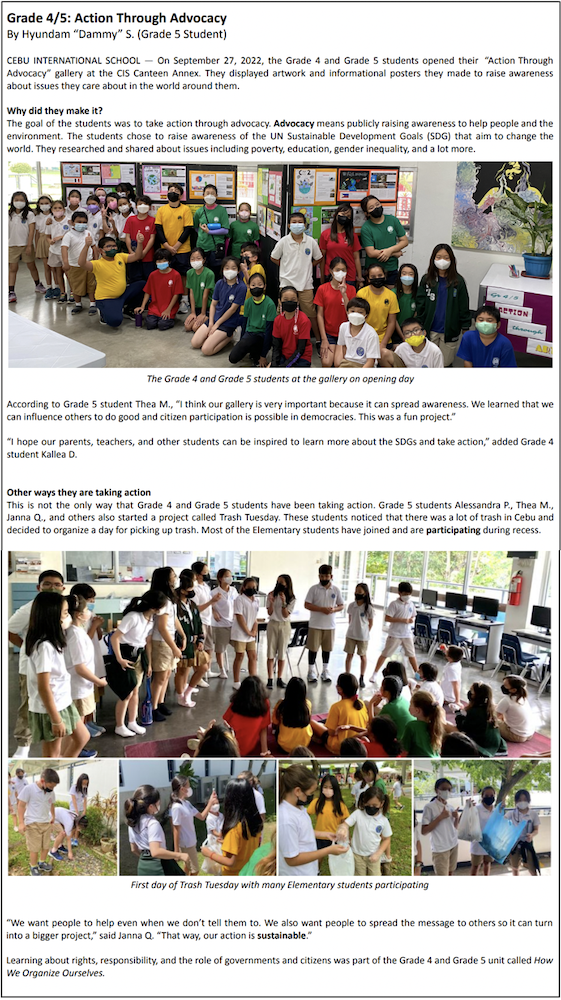
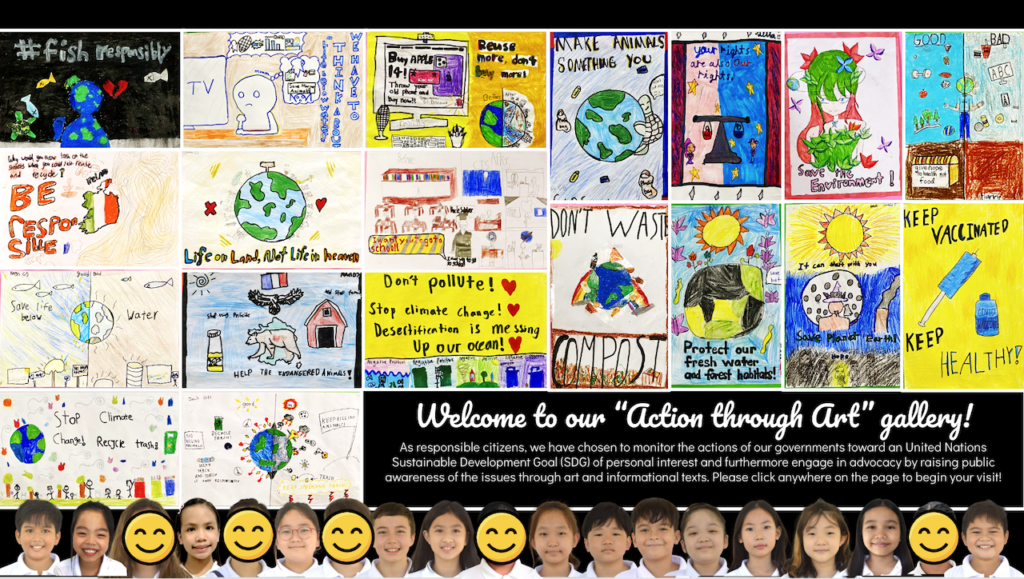
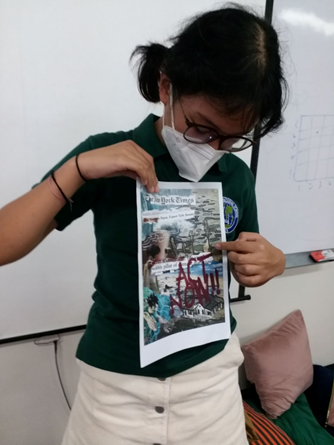
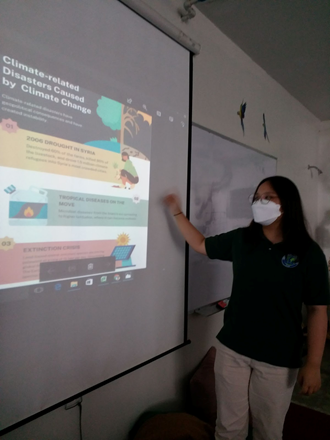
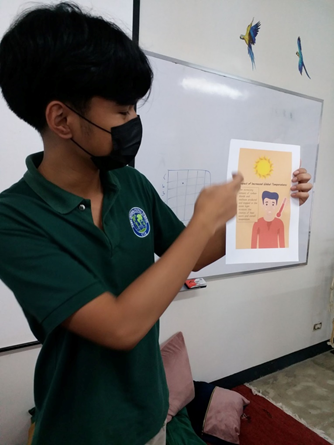
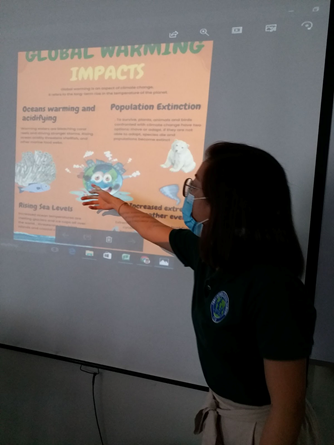
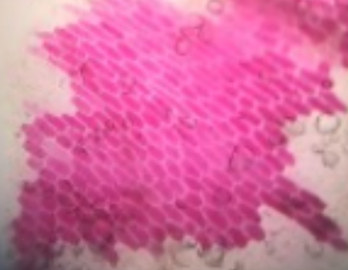 Practical 1: Use of a light microscope to investigate the structure of cells and tissues, with the drawing of cells.
Practical 1: Use of a light microscope to investigate the structure of cells and tissues, with the drawing of cells.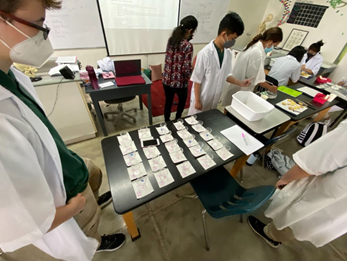
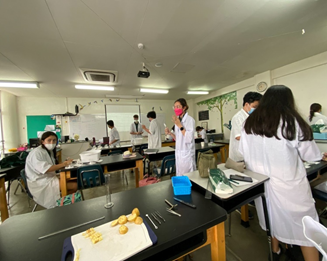
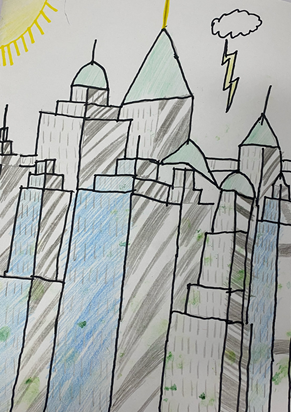
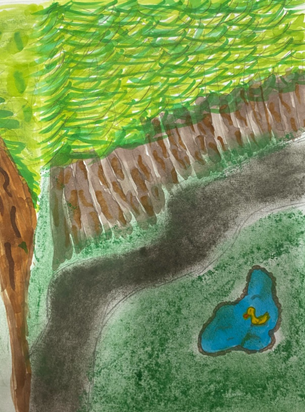
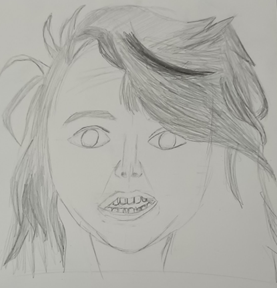
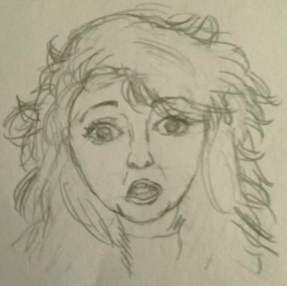
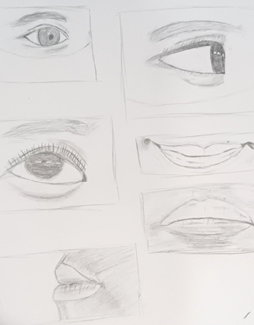
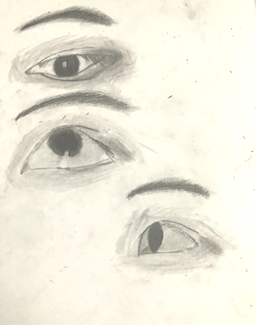
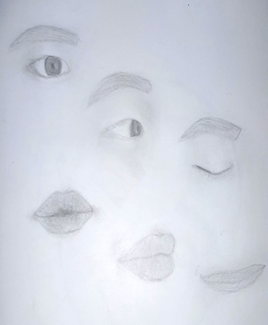
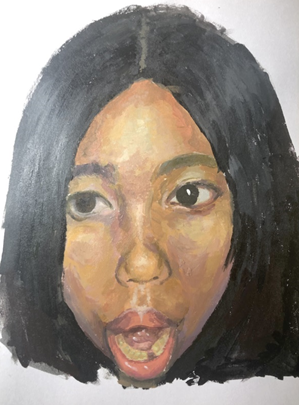
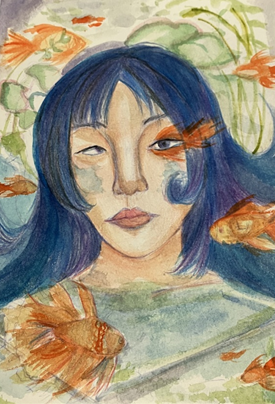
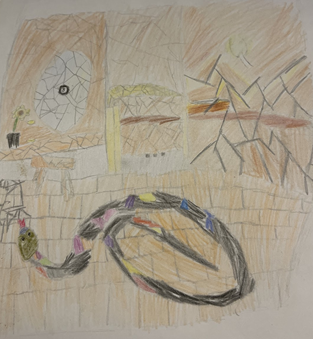
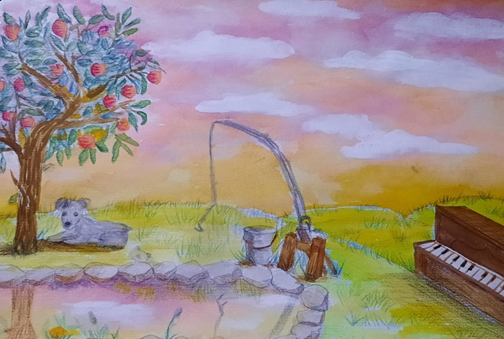
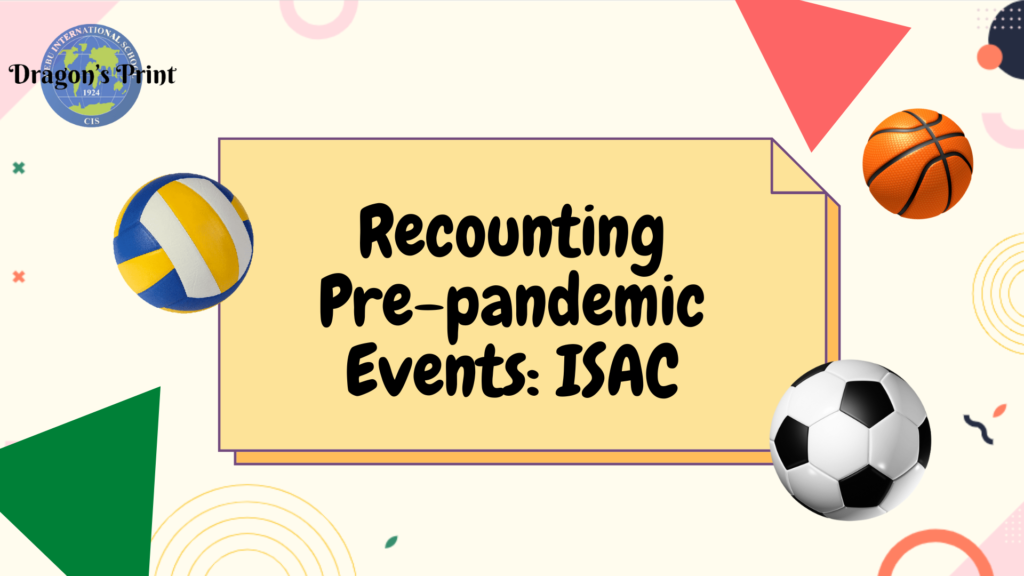




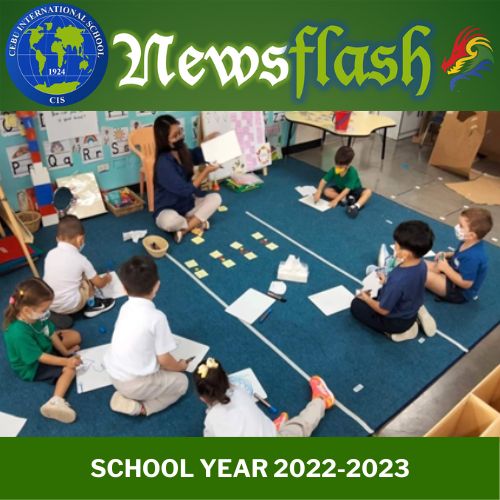
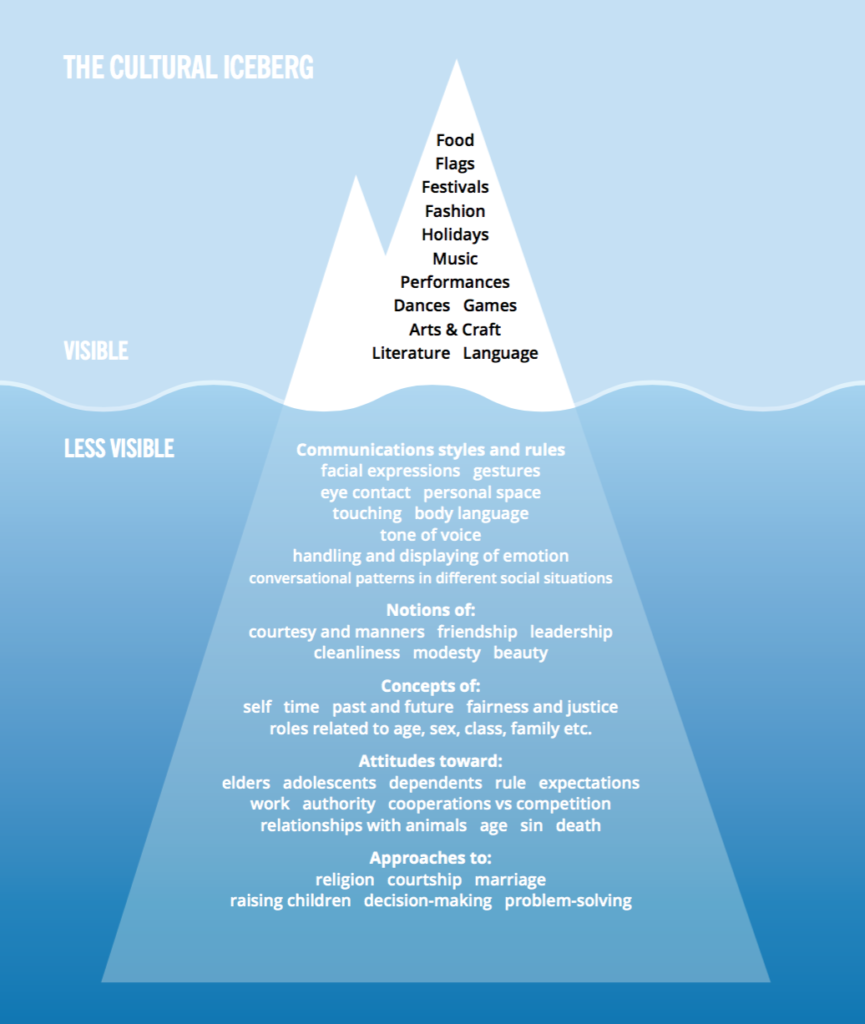
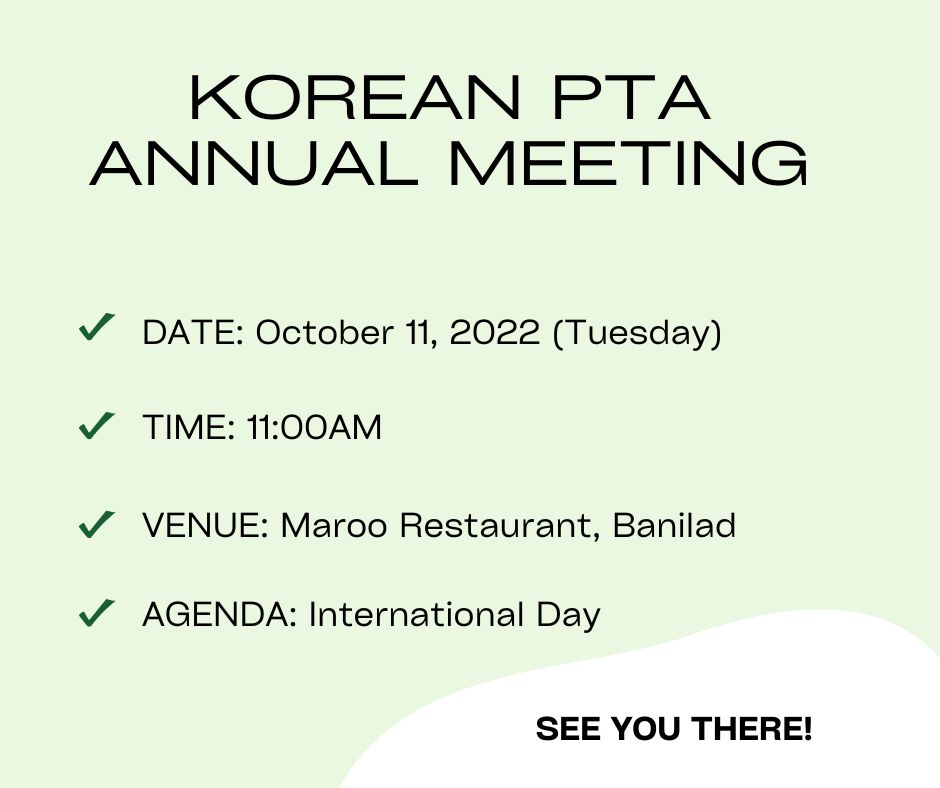
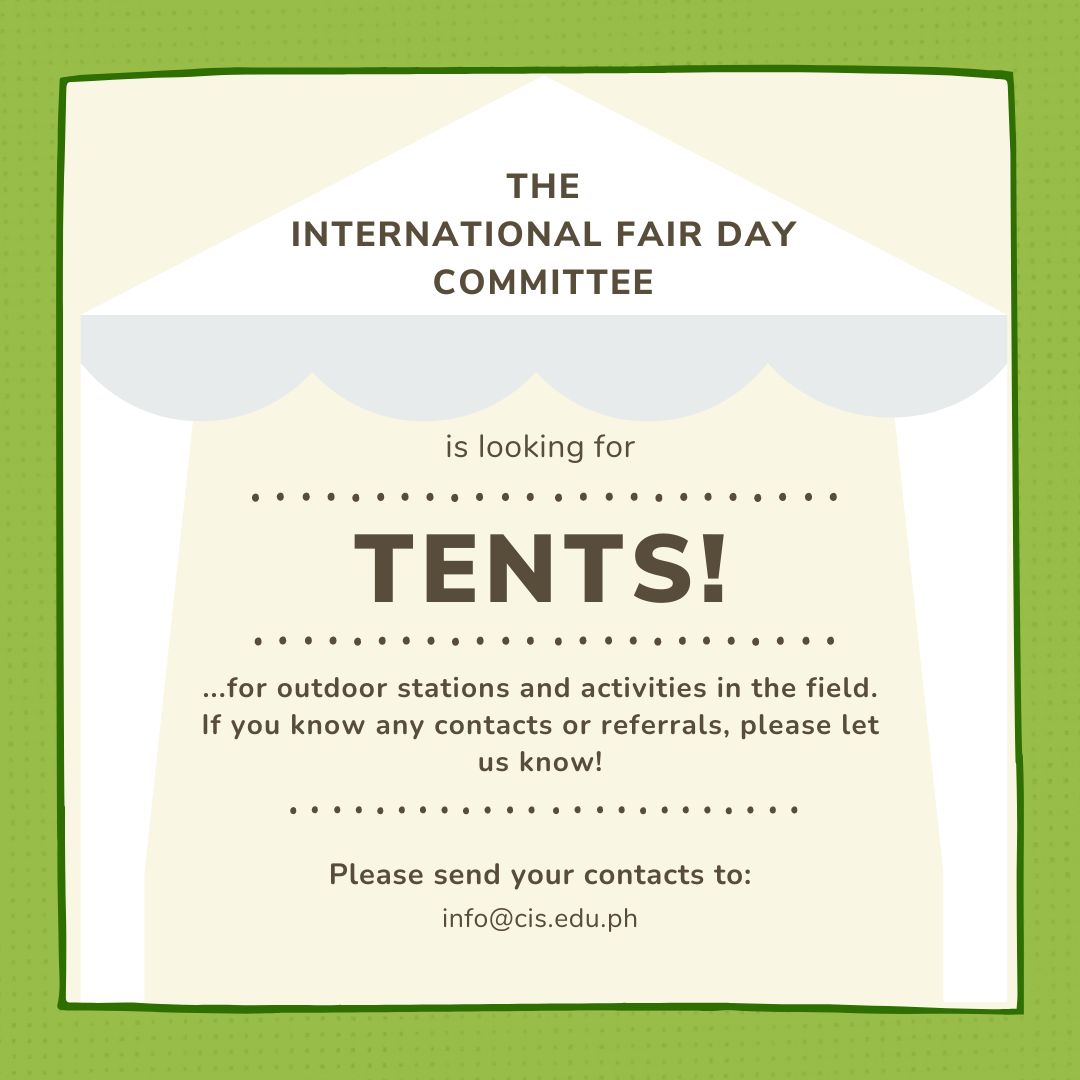
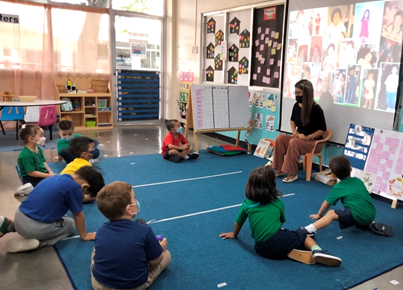 The Early Years wrapped up their unit on Who We Are this week as they continued demonstrating and sharing their understanding of how we are unique or different from others. Identifying and understanding similarities and differences in the community allows our young learners to recognize their characteristics and transfer their knowledge in different ways such as by comparing and contrasting their own and others’ physical characteristics, the materials or resources around them, their interests, and preferences.
The Early Years wrapped up their unit on Who We Are this week as they continued demonstrating and sharing their understanding of how we are unique or different from others. Identifying and understanding similarities and differences in the community allows our young learners to recognize their characteristics and transfer their knowledge in different ways such as by comparing and contrasting their own and others’ physical characteristics, the materials or resources around them, their interests, and preferences. 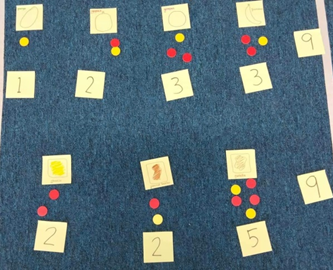 to share their interests and preferences confidently. The highlights of our conversation were the kinds of food they eat during recess time, particularly healthy snacks. It gave us the idea to show their preferences by choosing the fruit and sandwich spread they liked the most. Our young learners identified and understood each other’s preferences through this learning engagement. They continued the activity by using the yellow counters for girls and red for boys. In connection, identifying beginning sounds, counting manipulatives, and writing numbers were also integrated as they engaged in this meaningful and fun activity.
to share their interests and preferences confidently. The highlights of our conversation were the kinds of food they eat during recess time, particularly healthy snacks. It gave us the idea to show their preferences by choosing the fruit and sandwich spread they liked the most. Our young learners identified and understood each other’s preferences through this learning engagement. They continued the activity by using the yellow counters for girls and red for boys. In connection, identifying beginning sounds, counting manipulatives, and writing numbers were also integrated as they engaged in this meaningful and fun activity. 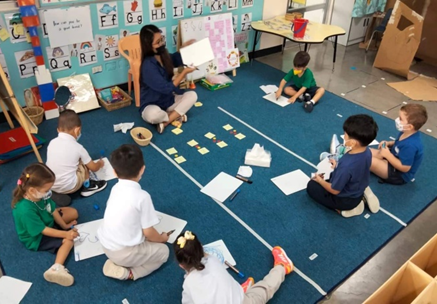
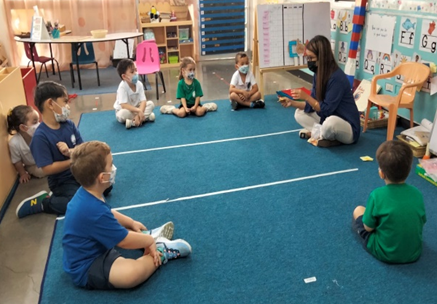
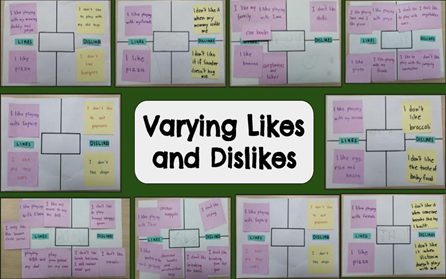
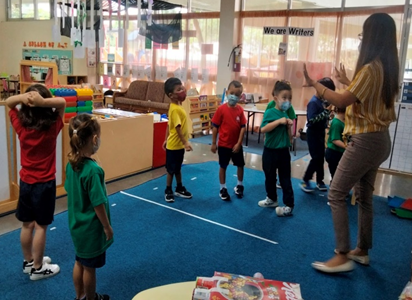
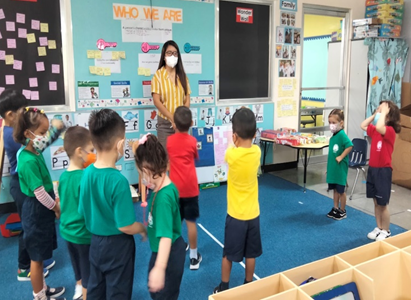
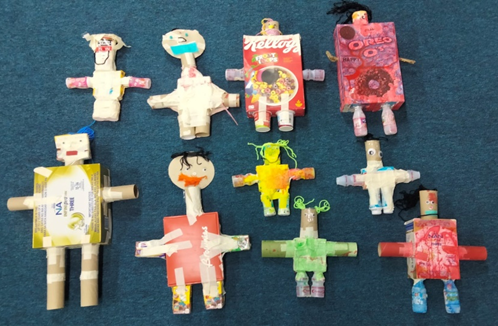
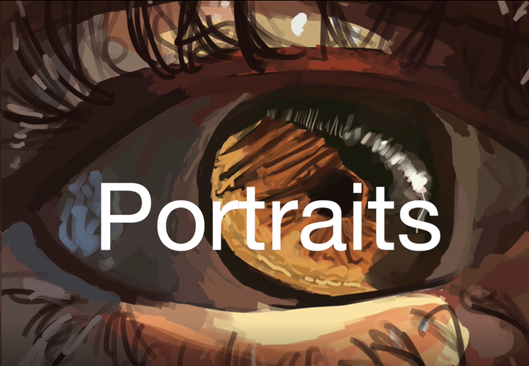
 Mathematics (Applications and Interpretation) Standard Level is a course that emphasizes the topic of Statistics, modelling relationships and use of technology.
Mathematics (Applications and Interpretation) Standard Level is a course that emphasizes the topic of Statistics, modelling relationships and use of technology.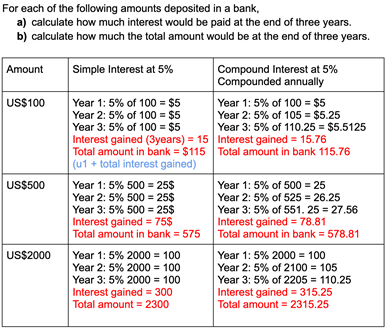
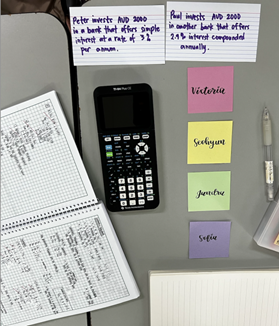
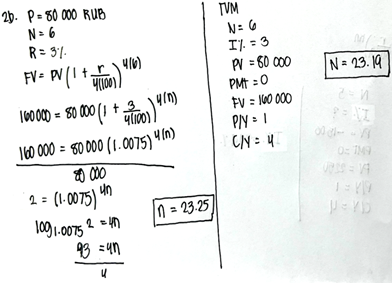
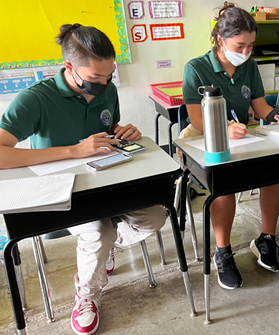
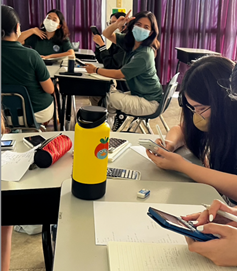
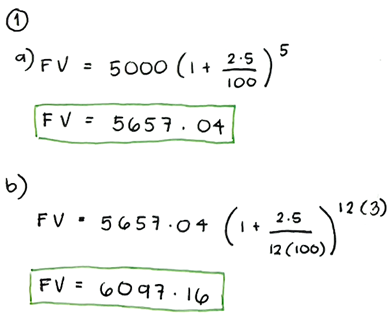
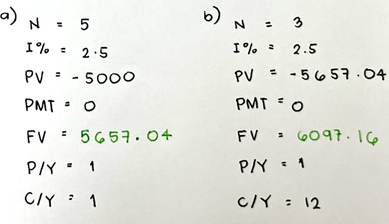
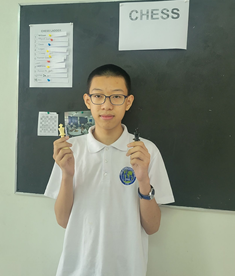 Our school’s brightest minds have been battling it out on the Chess Board each Tuesday during the 1st quarter.
Our school’s brightest minds have been battling it out on the Chess Board each Tuesday during the 1st quarter. 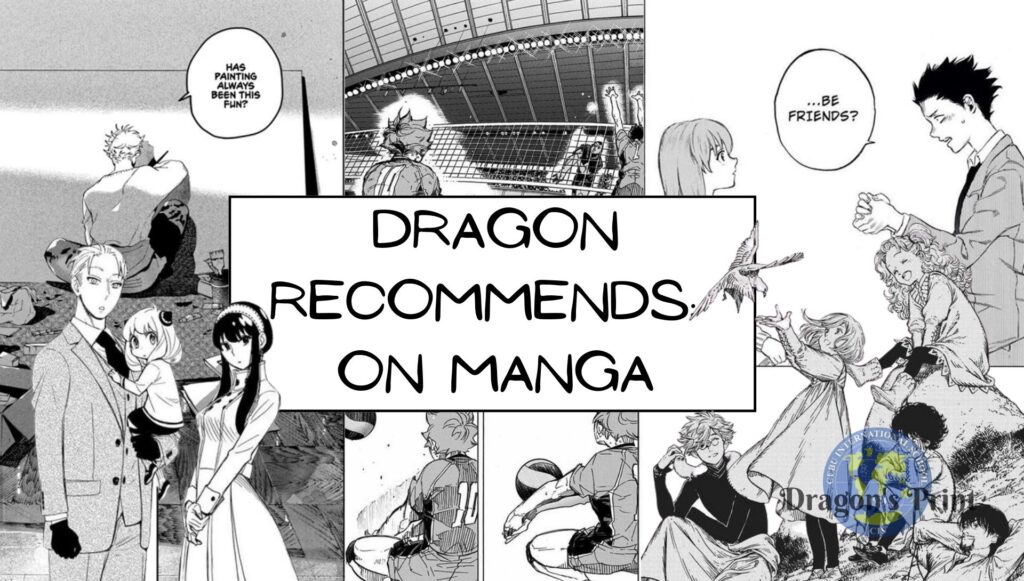
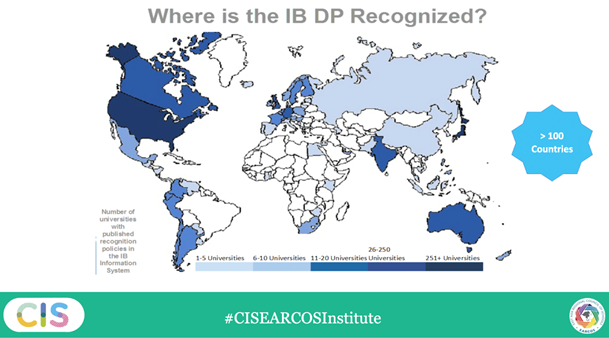


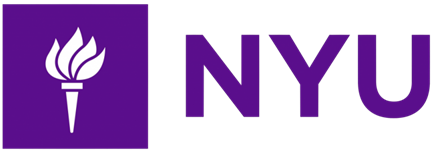



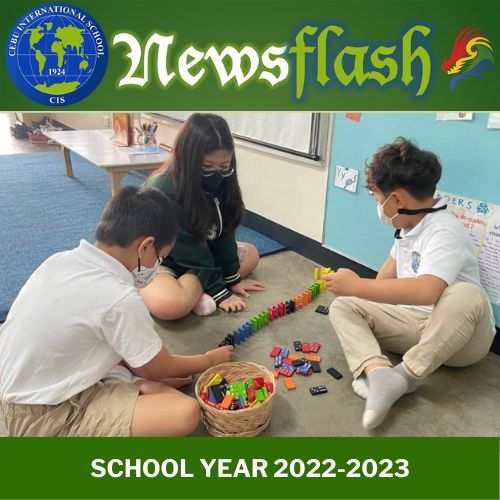
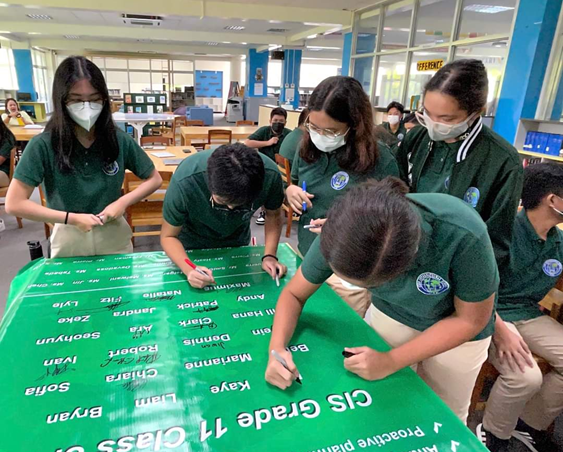 skills while reflecting upon how this approach supports Learner Profile attributes and the five respects that we are committed to as a school.
skills while reflecting upon how this approach supports Learner Profile attributes and the five respects that we are committed to as a school.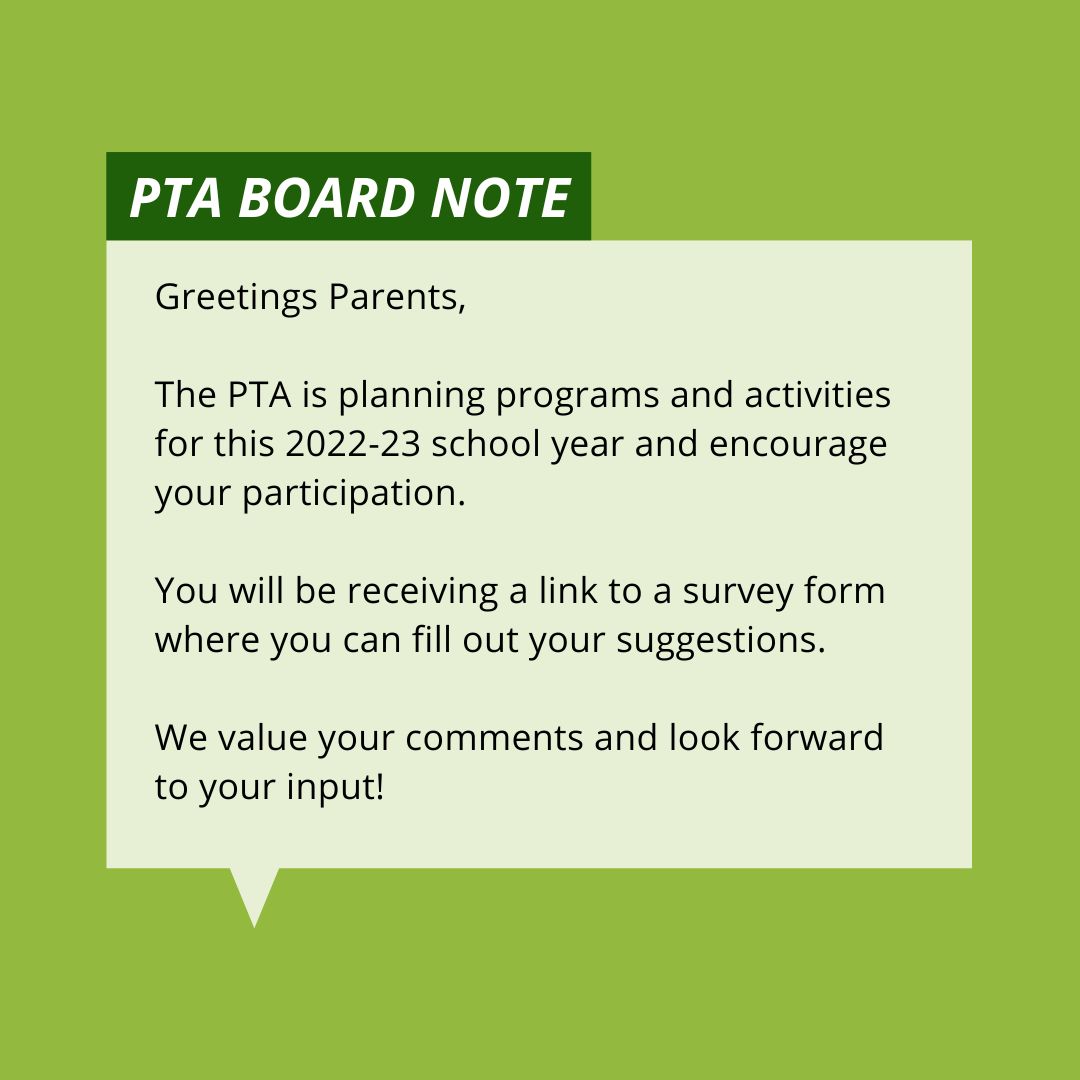
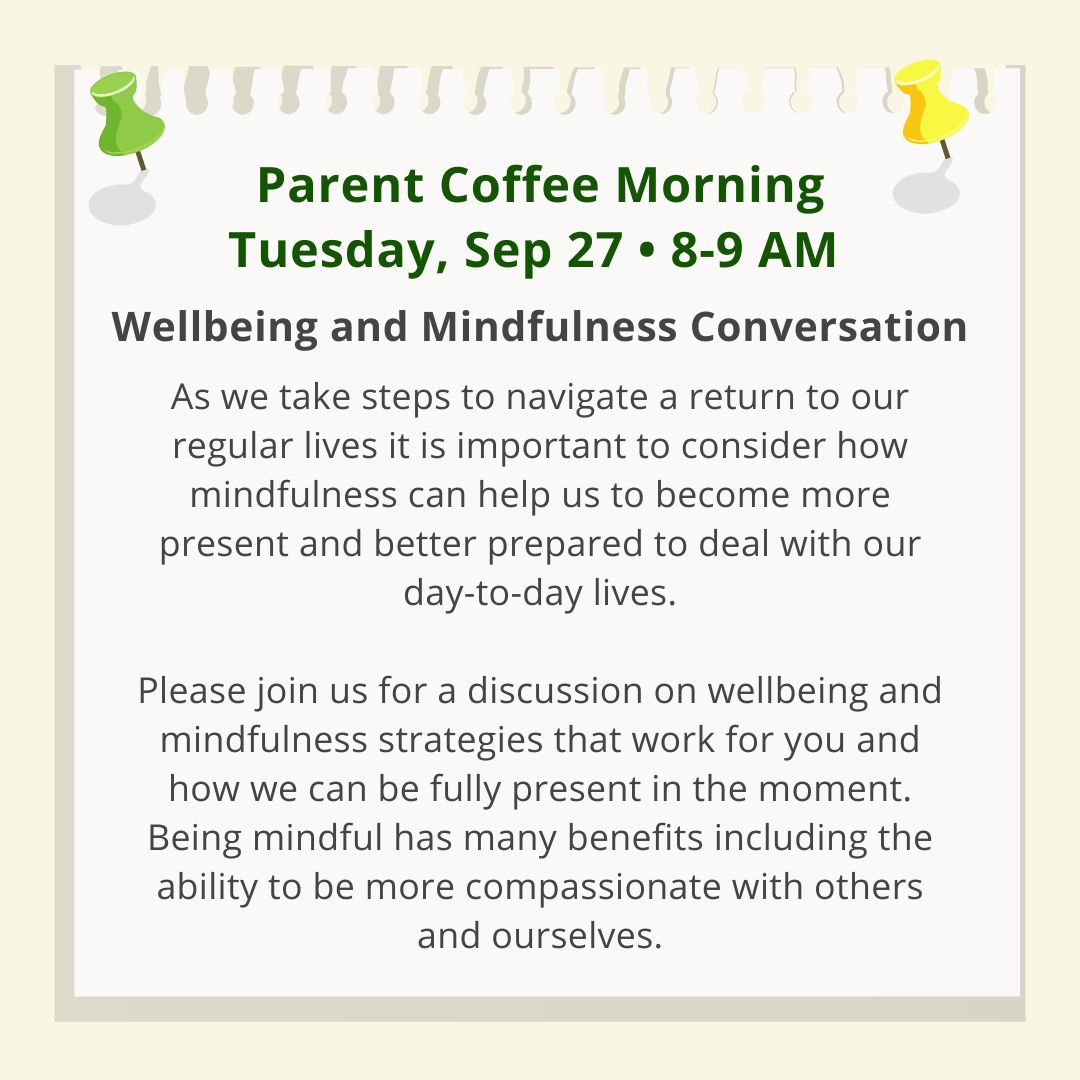
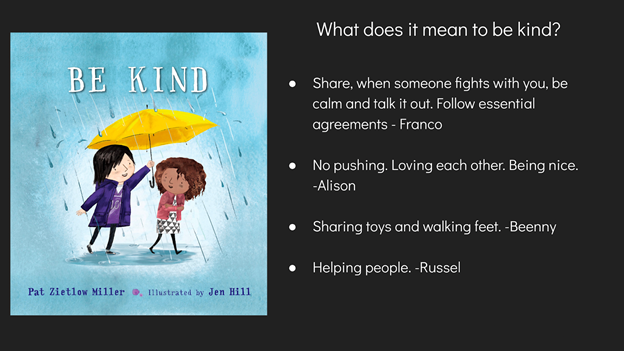
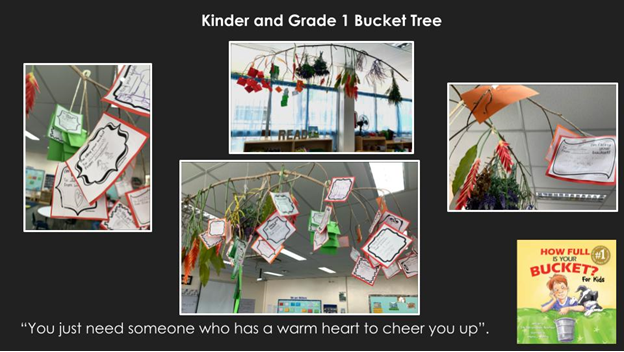
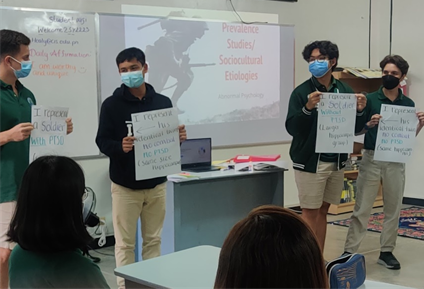 traumatic stress disorder (PTSD) under their abnormal psychology unit. PTSD is classified as an anxiety disorder, and the students of grade 12 psychology have engaged in academic journals to discuss its causes and treatment. Here students represent the different participants in Gilbertson et al. (2002), one of their key studies. The students photographed have the task of explaining the experimental method to their peers, as the design is complex, giving space to students to act out the study and its moving parts. The students who were not presenting asked questions about the design to test the ‘actors’ knowledge in this way all students engaged with and learned more about the study.
traumatic stress disorder (PTSD) under their abnormal psychology unit. PTSD is classified as an anxiety disorder, and the students of grade 12 psychology have engaged in academic journals to discuss its causes and treatment. Here students represent the different participants in Gilbertson et al. (2002), one of their key studies. The students photographed have the task of explaining the experimental method to their peers, as the design is complex, giving space to students to act out the study and its moving parts. The students who were not presenting asked questions about the design to test the ‘actors’ knowledge in this way all students engaged with and learned more about the study. 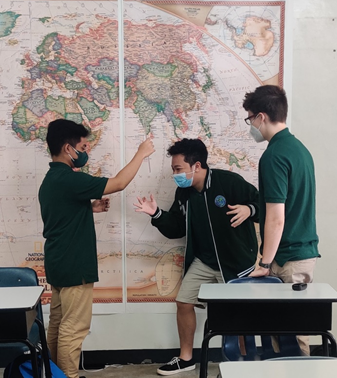 Grade 11 psychology students have recently been studying experimental research methods. Here students are testing their reflexes in an independent measures design to determine if the season they were born effects their hand-eye coordination. During this experiment the students had to measure the readiness of their reflexes by the distance in centimeter it took before catching the ruler. These practise experiments are important for developing student understanding of experimental research as they prepare for their psychology IA where they complete their own experiment.
Grade 11 psychology students have recently been studying experimental research methods. Here students are testing their reflexes in an independent measures design to determine if the season they were born effects their hand-eye coordination. During this experiment the students had to measure the readiness of their reflexes by the distance in centimeter it took before catching the ruler. These practise experiments are important for developing student understanding of experimental research as they prepare for their psychology IA where they complete their own experiment. 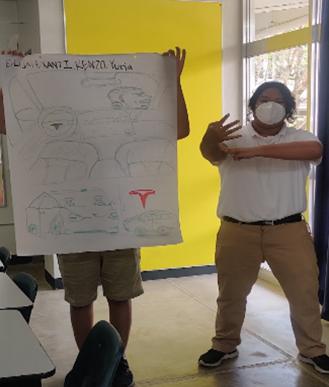 Grade 10 students studying individuals and societies have had a focus on marketing in their business unit. The students have the task of marketing Tesla’s new safety feature. Imagination was prevalent here. The grade 10 students present their ideas for new features. In the first photo students have created a feature where you must successfully complete a rap before the car will start. The ability to complete the rap is a test of attention and alertness. This is a safety feature which is marketed towards young car drivers as it appeals to their interests.
Grade 10 students studying individuals and societies have had a focus on marketing in their business unit. The students have the task of marketing Tesla’s new safety feature. Imagination was prevalent here. The grade 10 students present their ideas for new features. In the first photo students have created a feature where you must successfully complete a rap before the car will start. The ability to complete the rap is a test of attention and alertness. This is a safety feature which is marketed towards young car drivers as it appeals to their interests. 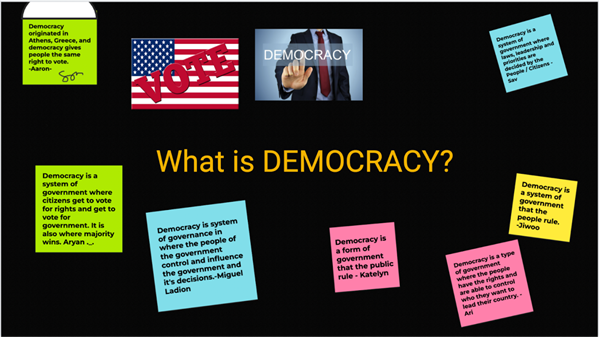
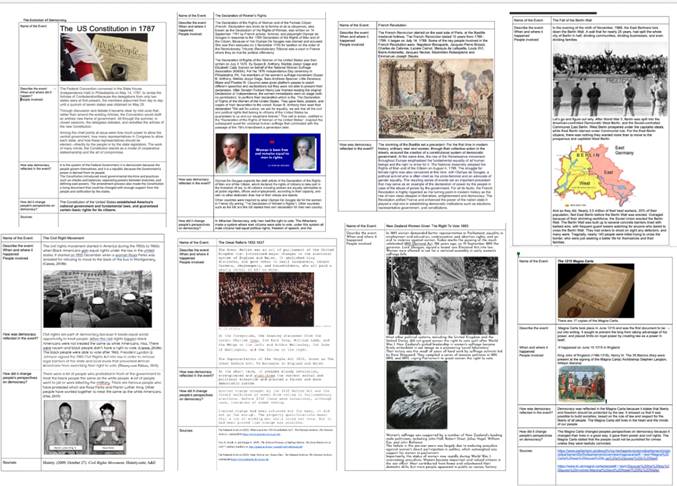
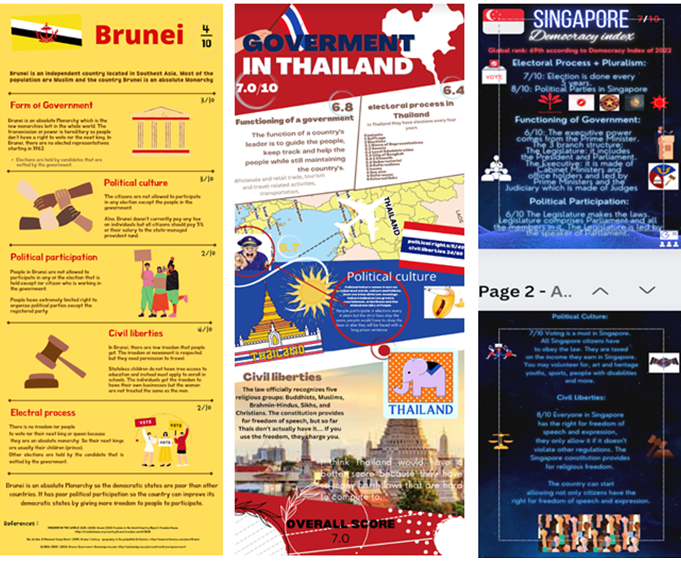
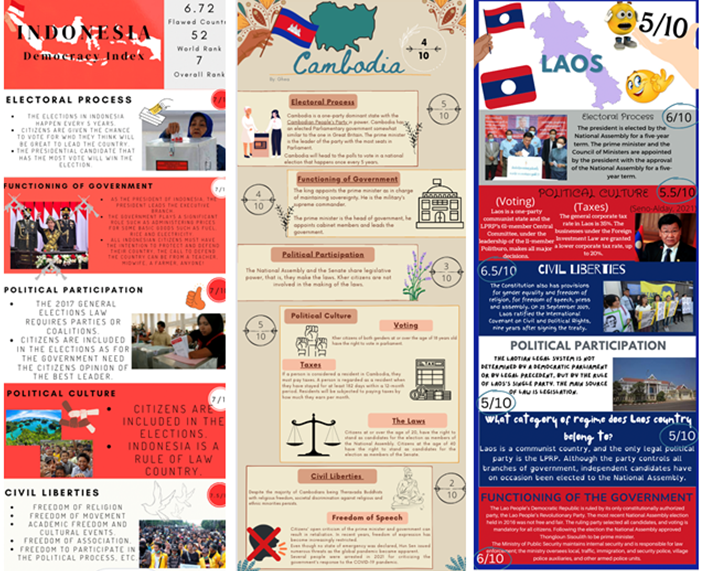
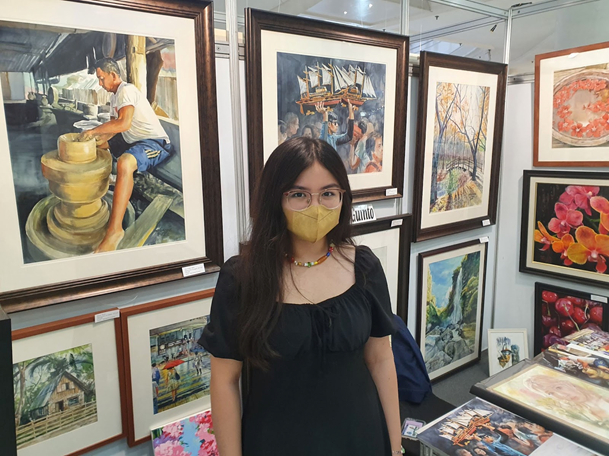 “I really enjoyed the experience because I was able to share my art with the public. Due to COVID I haven’t been able to do so and I missed that connection. I appreciated the support I received from the community at CIS and the way in which people admired and spoke about my work. I was proud of my exhibition and can see the way in which I have grown as an artist over the past couple of years. I’m looking forward to continuing to paint and I can see the influence of taking art at CIS as it has helped me think more deeply about my work and its meaning.”
“I really enjoyed the experience because I was able to share my art with the public. Due to COVID I haven’t been able to do so and I missed that connection. I appreciated the support I received from the community at CIS and the way in which people admired and spoke about my work. I was proud of my exhibition and can see the way in which I have grown as an artist over the past couple of years. I’m looking forward to continuing to paint and I can see the influence of taking art at CIS as it has helped me think more deeply about my work and its meaning.”

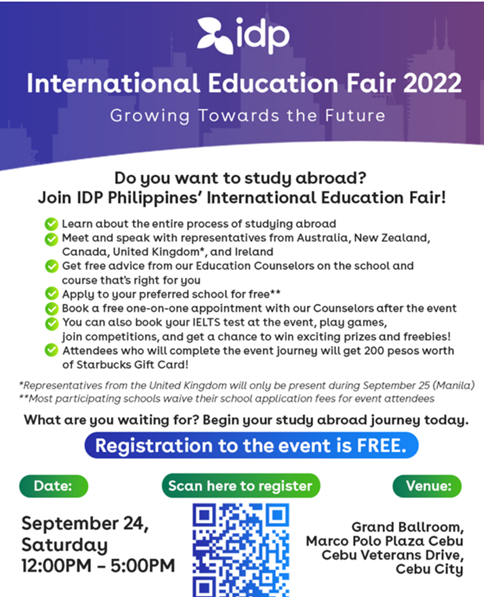
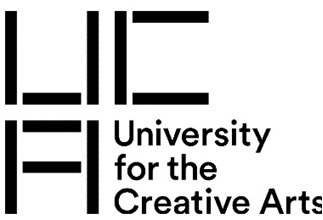


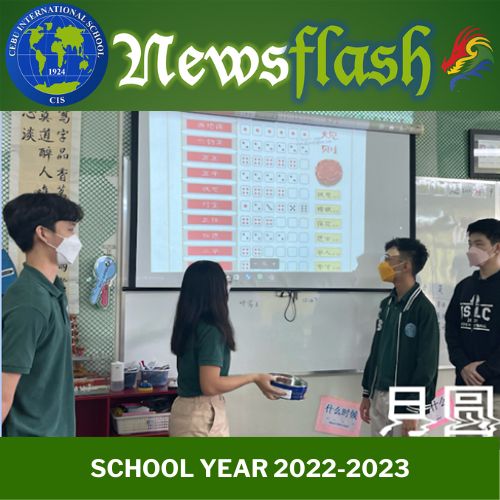
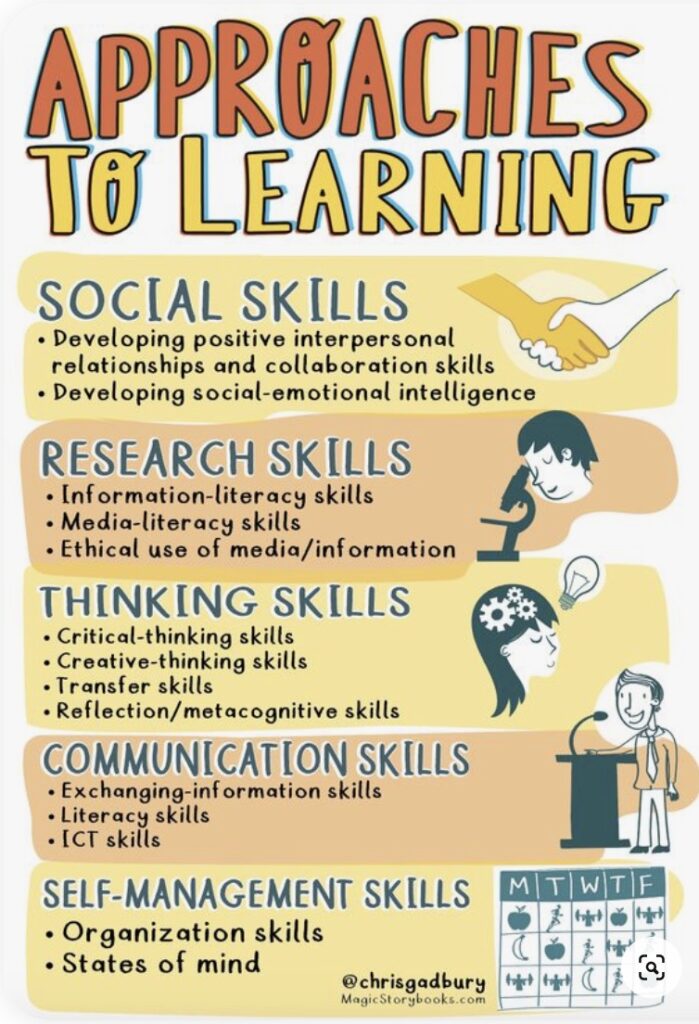 The use of houses also introduces an element of healthy competition that encourages students to do their best for their team in a competitive environment, while also learning life skills such as sportsmanship and learning how to cope with winning and losing in a safe environment.
The use of houses also introduces an element of healthy competition that encourages students to do their best for their team in a competitive environment, while also learning life skills such as sportsmanship and learning how to cope with winning and losing in a safe environment.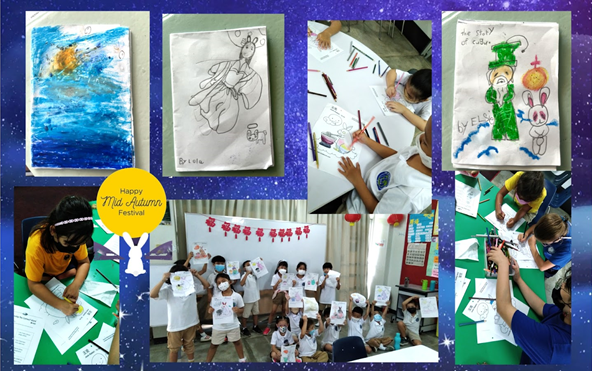
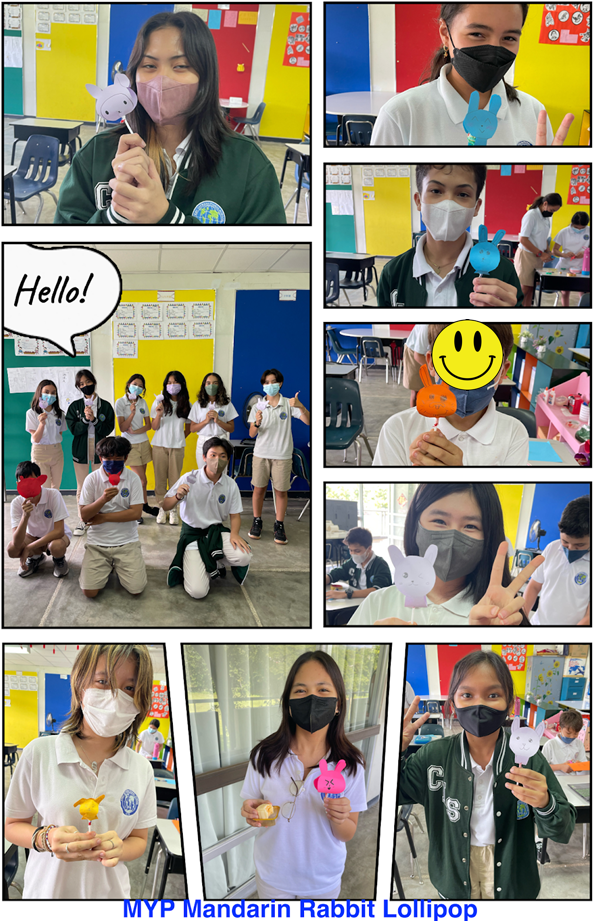
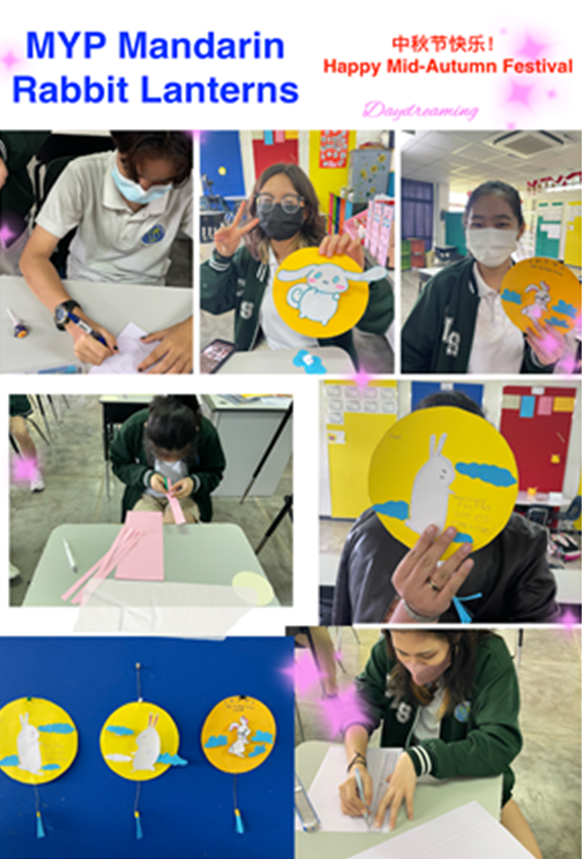
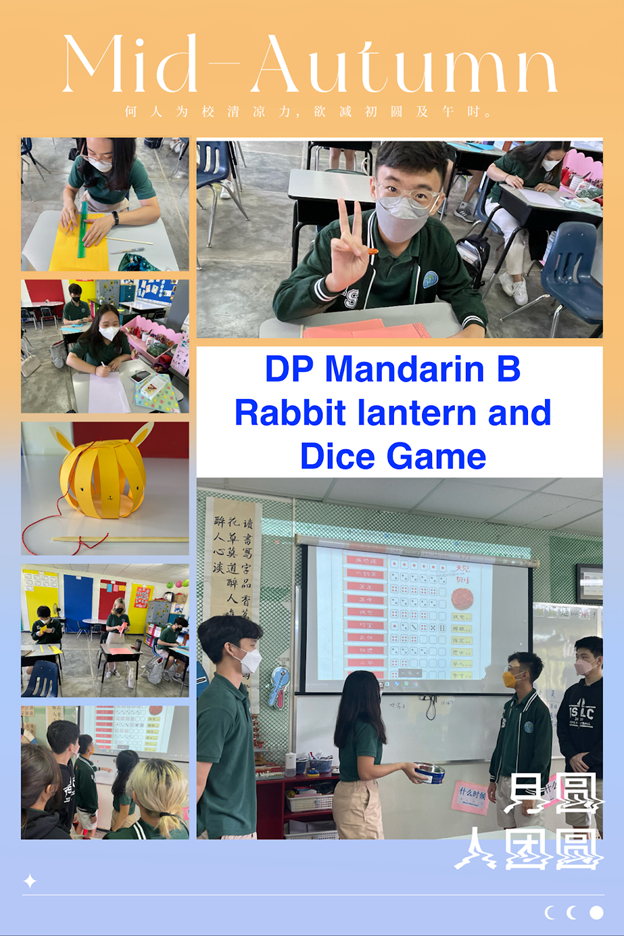
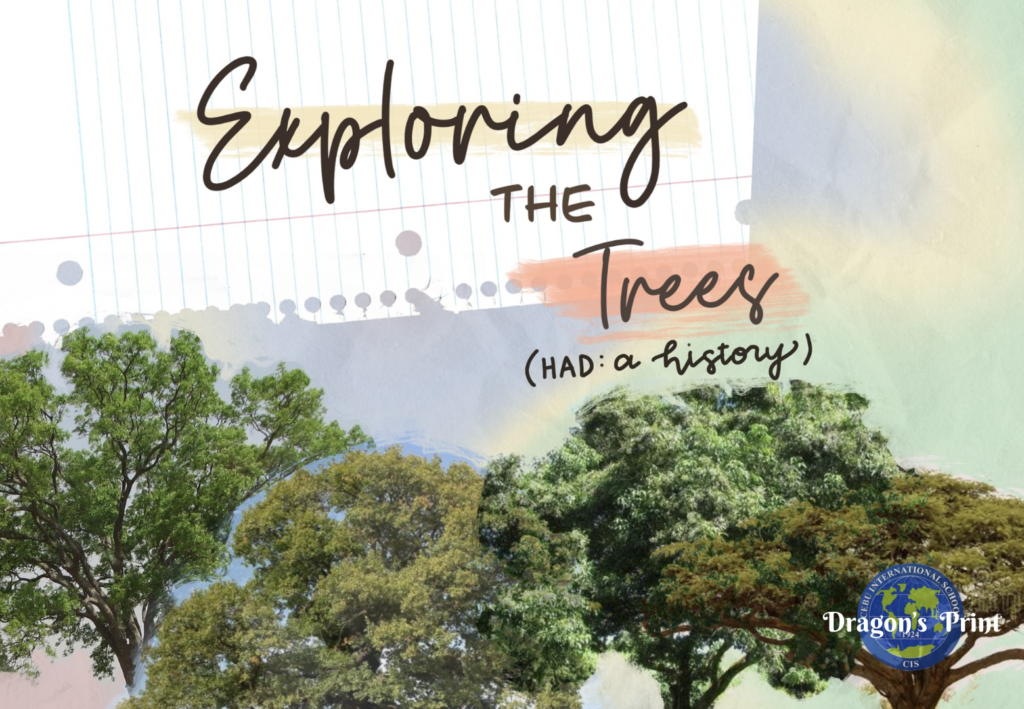

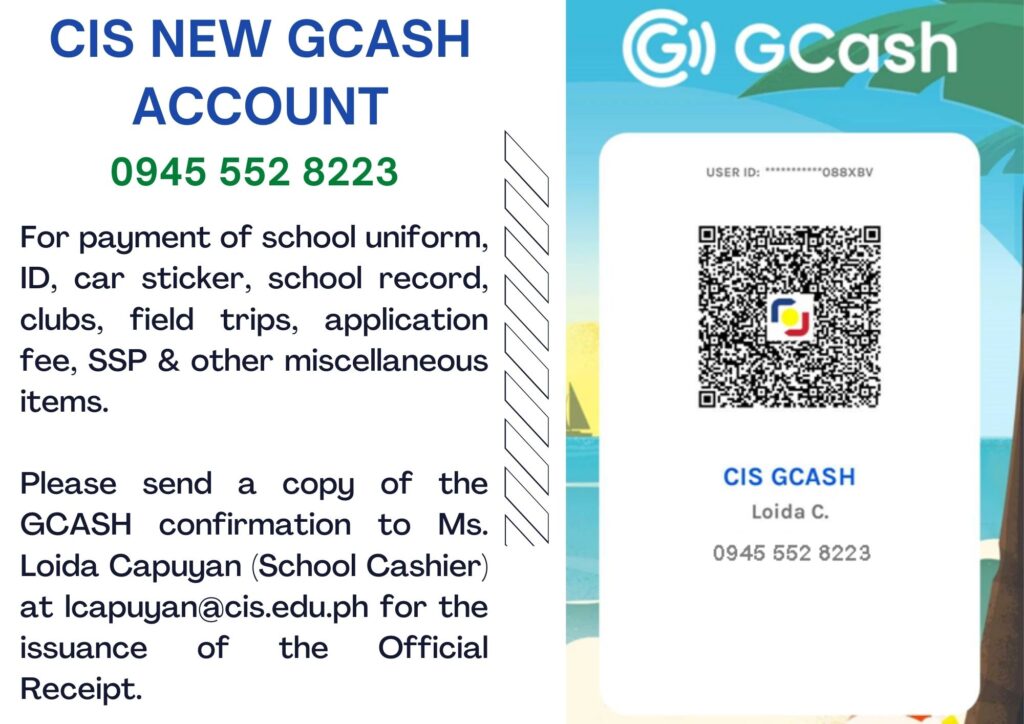

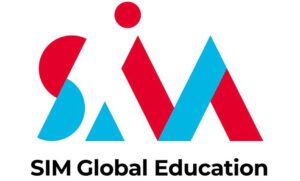

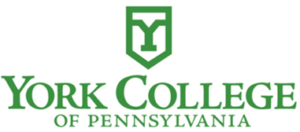

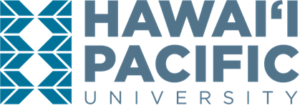

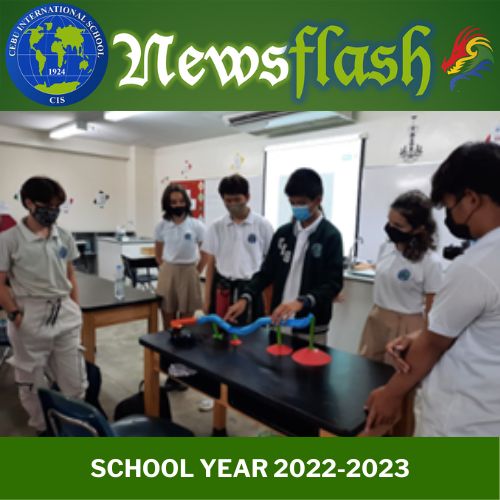
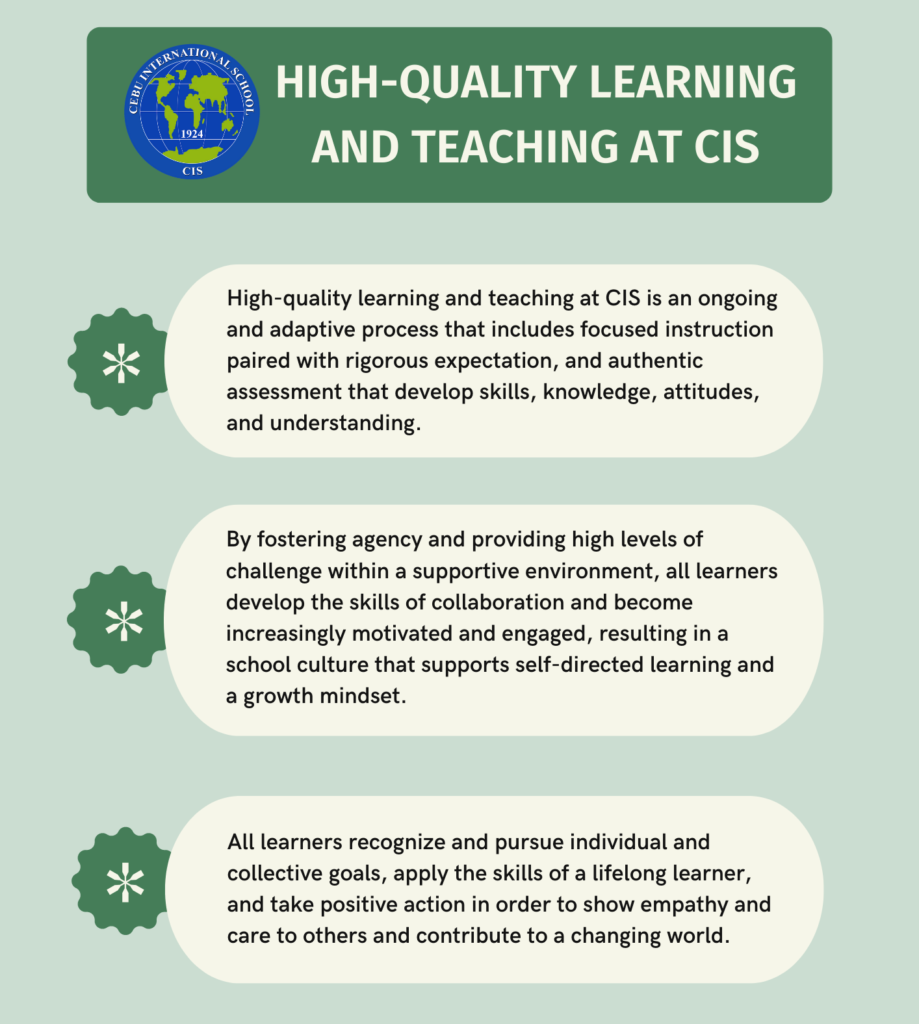
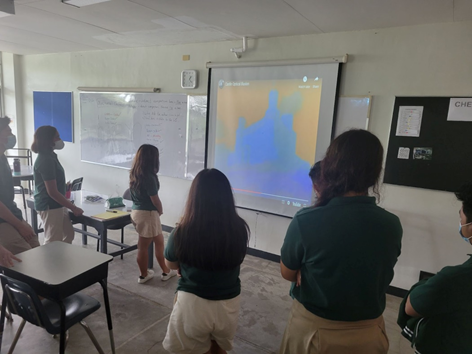
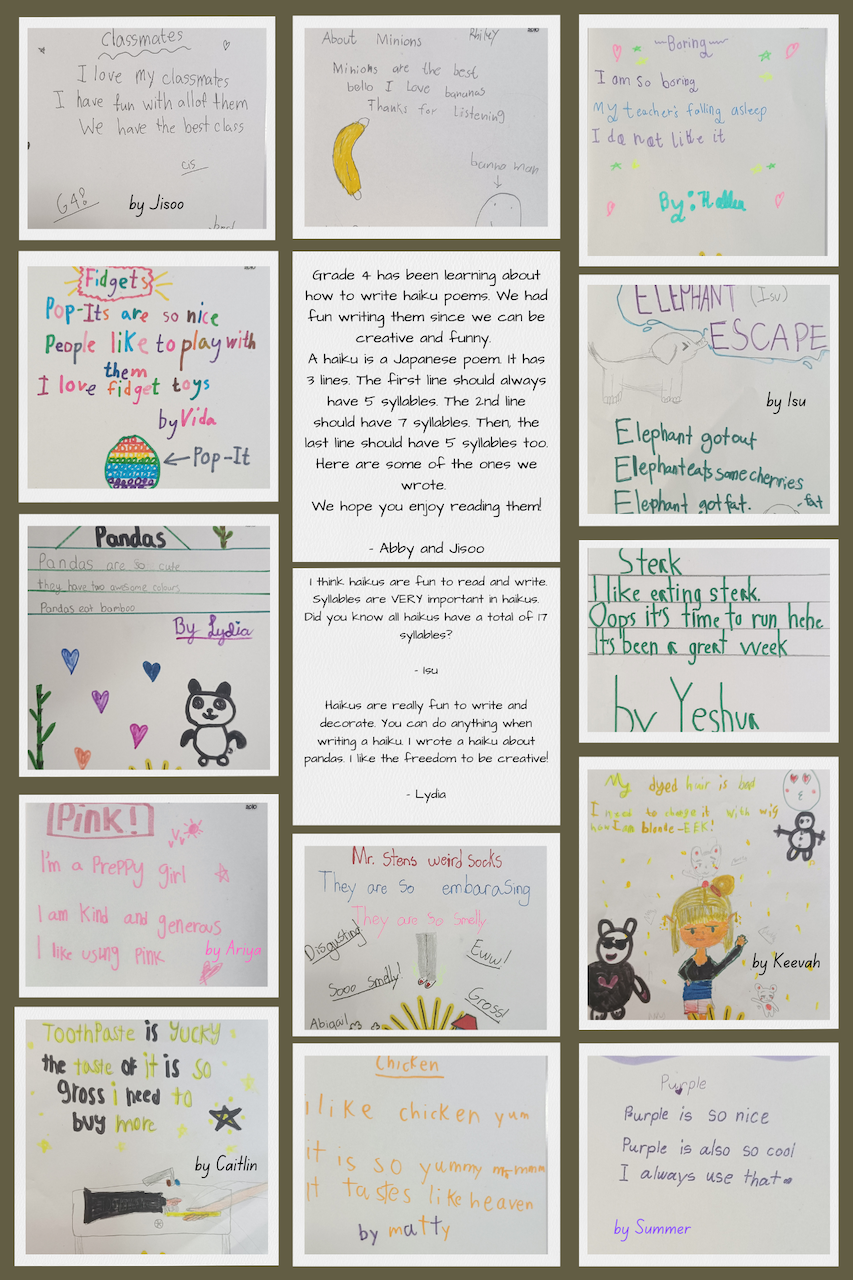



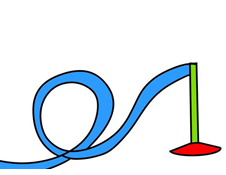
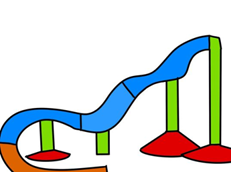

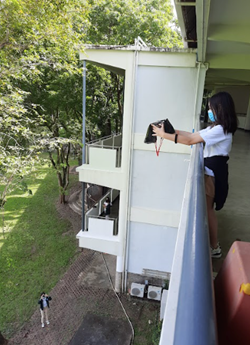
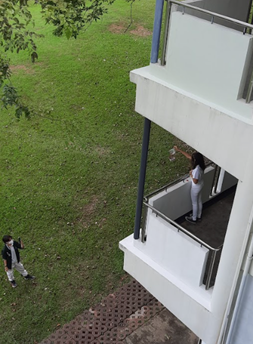
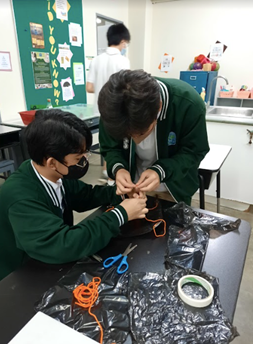
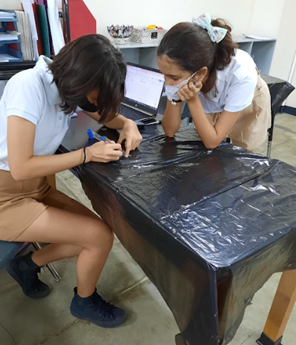
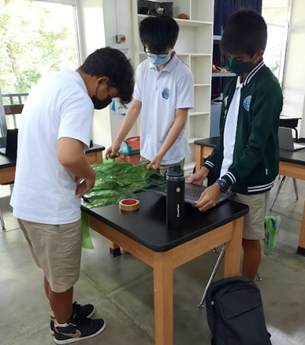
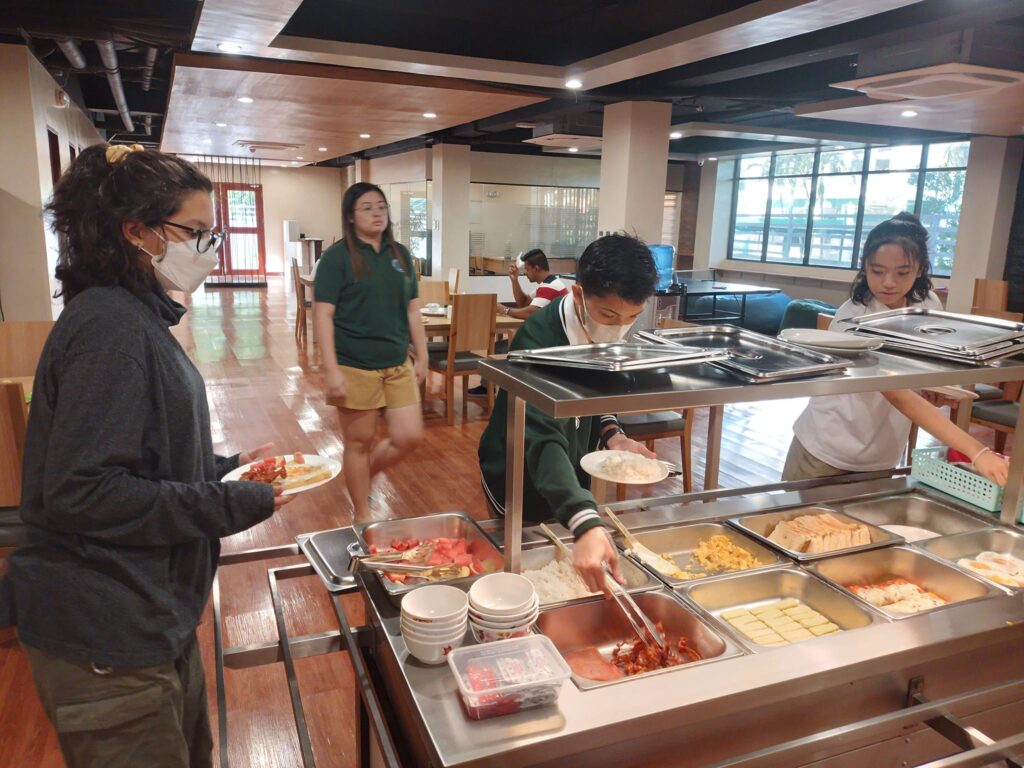
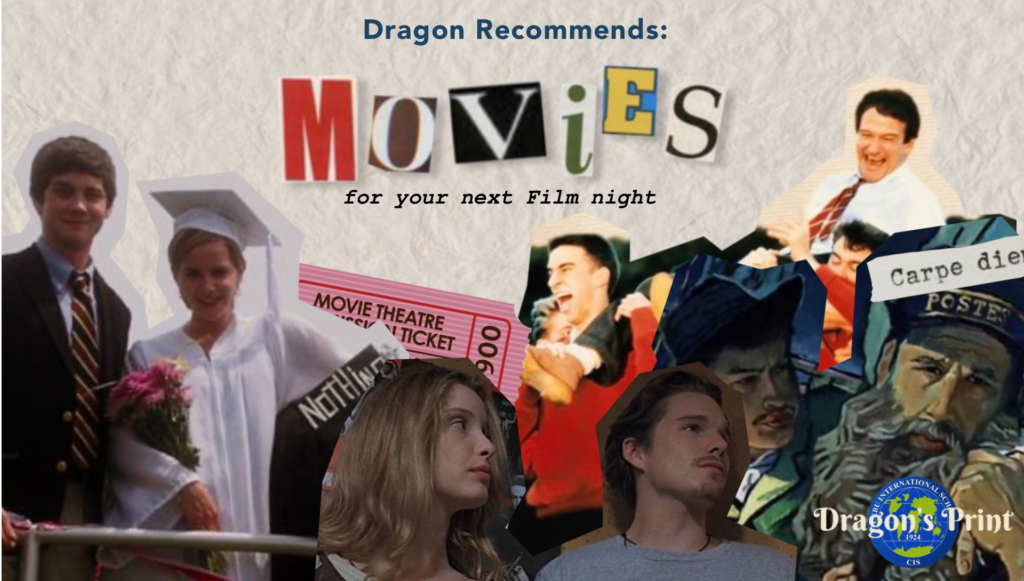
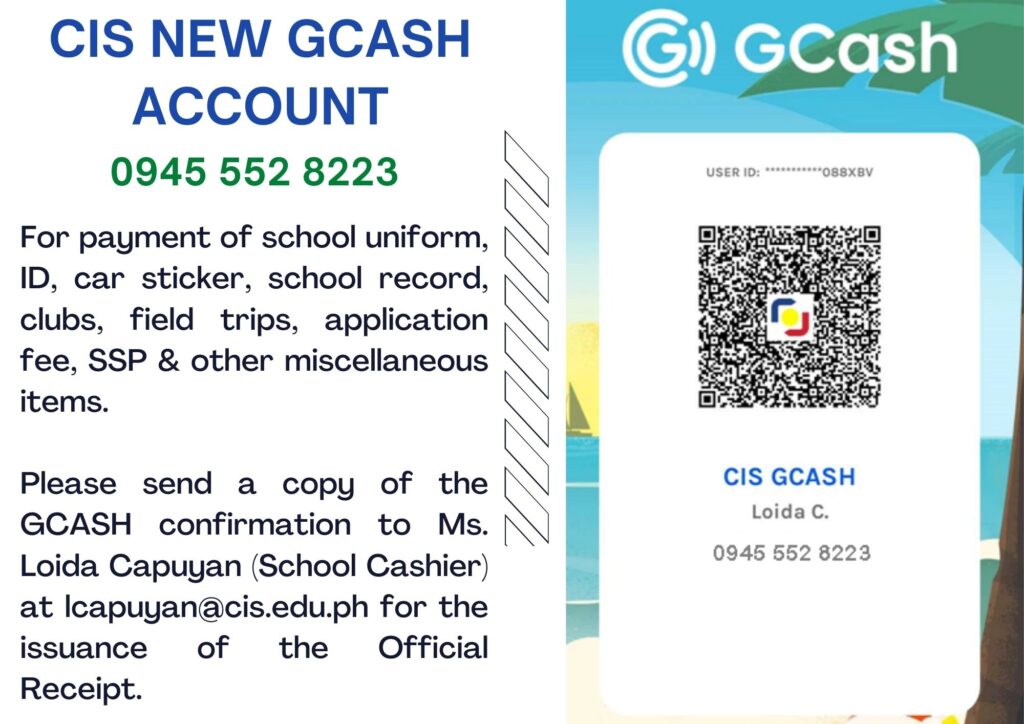


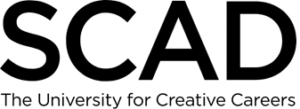
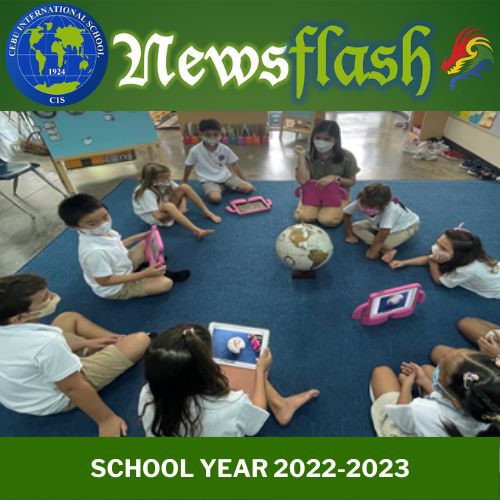
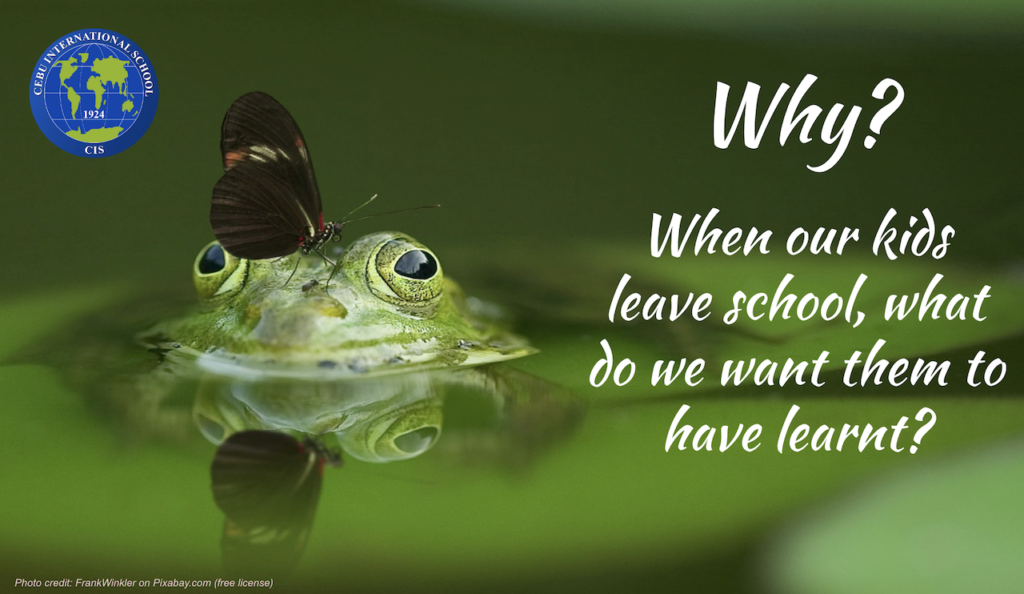
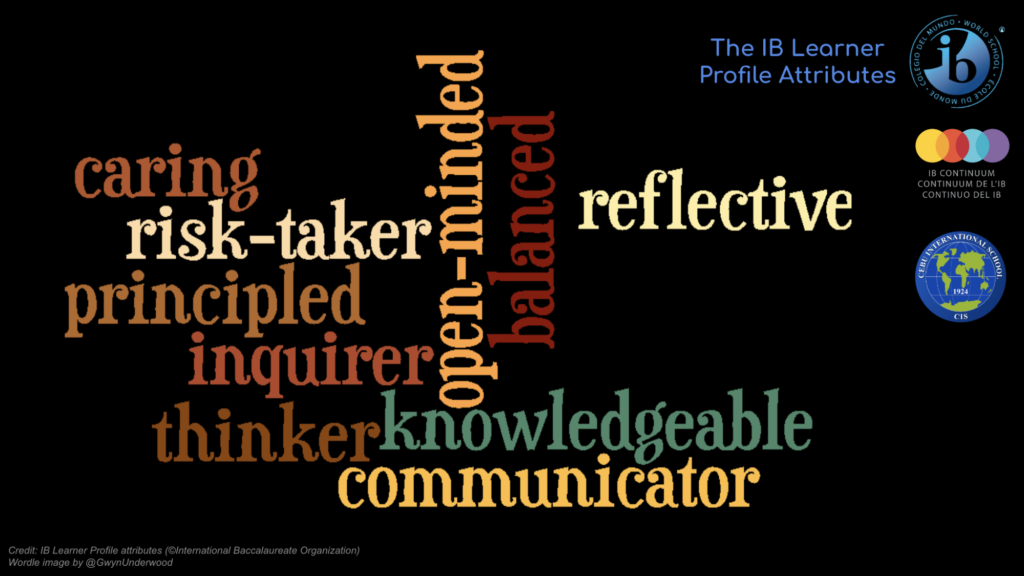
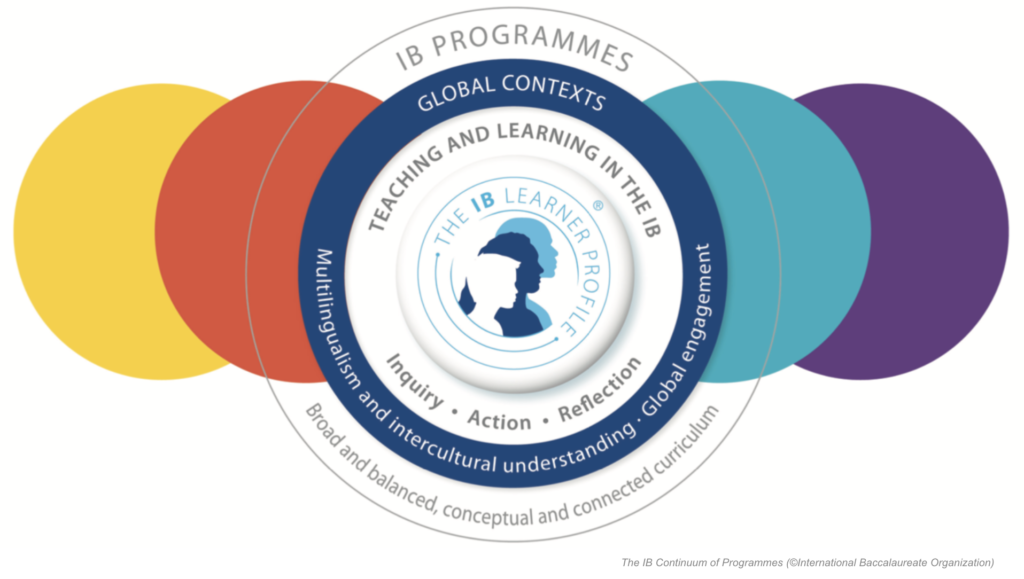
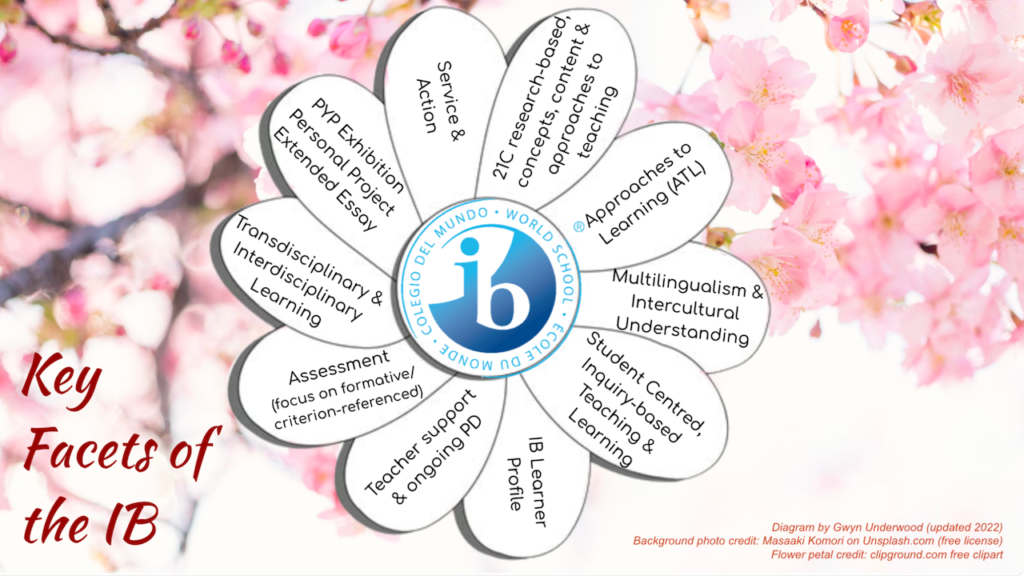

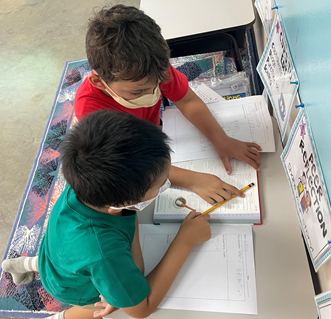



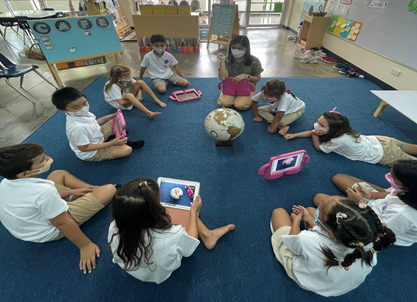

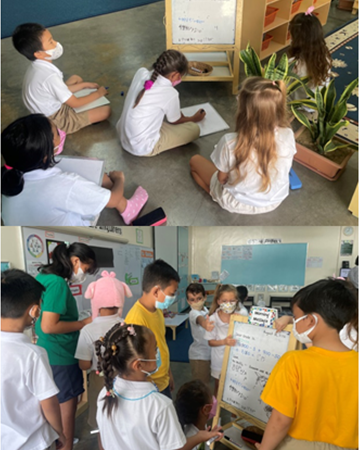
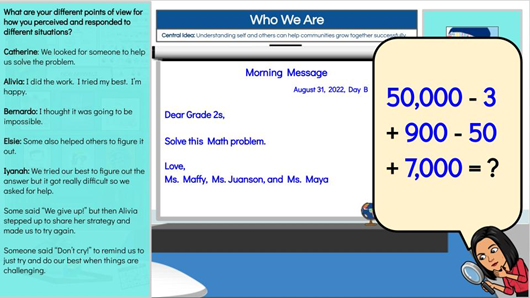


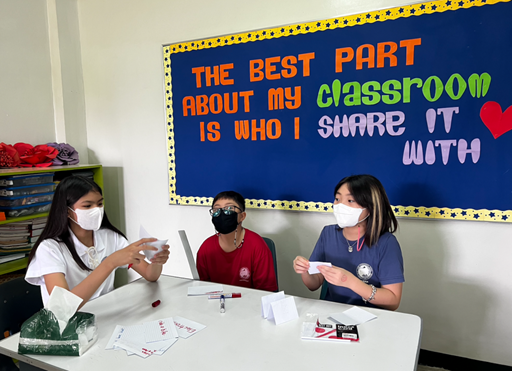 The first 8 days of Grade 6 Math focused on learning about themselves as mathematicians, creating learning norms/essential agreements and building relationships and classroom community.
The first 8 days of Grade 6 Math focused on learning about themselves as mathematicians, creating learning norms/essential agreements and building relationships and classroom community. 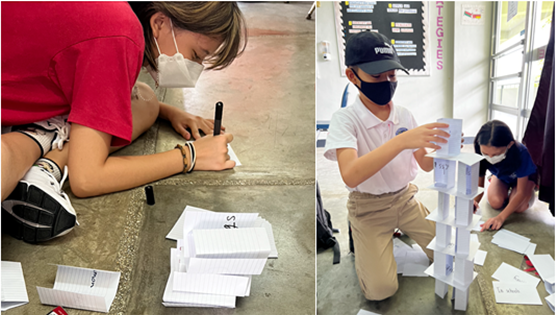
 Another highlight in their first 8 days of Grade 6 Math is the
Another highlight in their first 8 days of Grade 6 Math is the 